#self sacrifice is also a trope I’m very weak for
Explore tagged Tumblr posts
Text
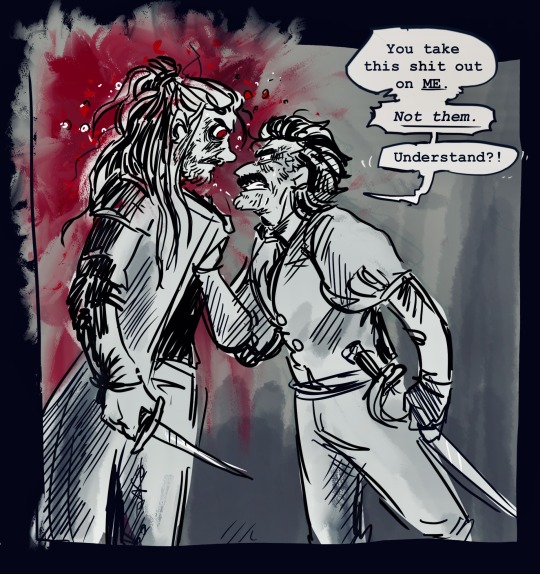
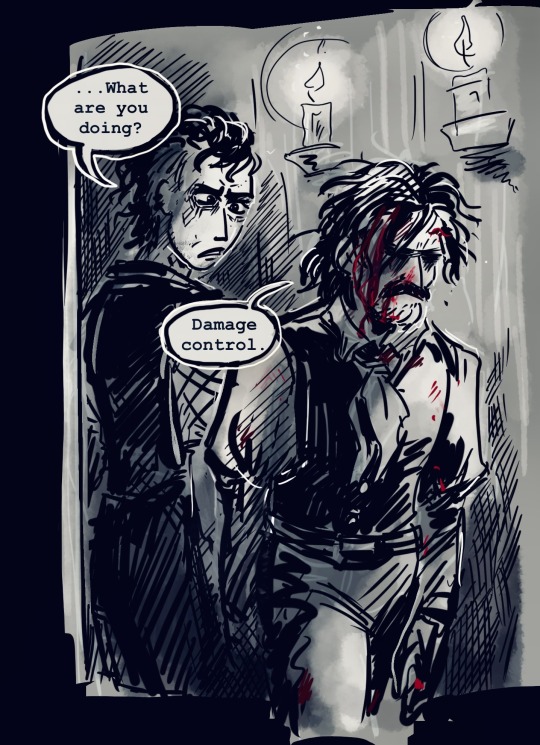
Every day I wake up and think:
“At some point Izzy realised how out of control things had gotten, and started putting himself in between Ed and the crew, as much as he could. Especially when Ed was too drunk/high to even know what he was doing. Cause Izzy doesn’t want the others to suffer more for his mistakes.”
“They are all bonded through shared trauma now.”
And every day I cry like a baby.
#grey art#fan art#ofmd#ofmd season 2#ofmd s2#ofmd s2 spoilers#ofmd spoilers#ofmd comic#ofmd fanart#can you believe how much I love Izzy???#and Edward just needs some warm soup#Izzy hands#edward teach#jim jimenez#this season is so dark I’m honestly here for it#whump art#self sacrifice is also a trope I’m very weak for
12K notes
·
View notes
Note
HI!!! I’m super super new, and i just browsed through the tags for Dadstaticradio AU, CATCF AU and Radio Guard AU and need to say that i am sooo obsessed with them!! I certainly plan on browsing all the other AUs (especially secretly married AU, i am very excited about that one), but it is very late where i live (*cough* 1 AM *cough*) and i want to go to bed soon, so they’ll have to wait for tomorrow (well, “tomorrow”).
But before i do retire to bed, i would like to put my own two cents in, because i am soo happy i found a place where i can finally share my little ideas and stories!! (I do hope i don’t annoy anyone, I apologize if i do 😭).
Basically, it’s a radiostatic AU. Of course. And it might sound a lot similiar to the secretly married AU from what i gathered about it, but how i mentioned earlier, i haven’t checked that one out yet + this AU has been brewing in my head for maybe like… two weeks??
It goes with the trope of Alastor and Vox getting married way before Alastor disappears for 7 years. I’m not sure if they’d be exactly public, but i like to imagine they would like to keep their relationship to themselves but wouldn’t be exactly insistent on hiding it either. But, that isn’t the main thing about this AU.
The plot revolves all around Alastor’s disappearance. The reason why he disappeared in the first place.
Because of Vox.
And let me get this straight, i do not have this fleshed out at ALL. Like, it’s just a little concept i have. But the premise is that maybe some really powerful Overlord wants to take advantage of Alastor and his power, and make Alastor work for them. They would be trying to find Alastor’s weakness, because goddammit everyone has one, so what’s his deal? but being unsuccessful for a long time. Until one day, they notice Alastor’s interaction with Vox. And they start observing them. Which leads them to conclude that, Vox is Alastor’s weakness. So they build this really elaborate plan, where they threaten Alastor that if he doesn’t work for them, they’ll bring harm to Vox. Alastor tries to find out an escape at first, but the Overlord has been preparing for a long time for this and that leaves Alastor with no other choice than to comply.
So, Alastor finds himself in a deal. His soul for Vox’s safety. The Overlord doesn’t wait any longer and takes Alastor to god knows where, making him disappear for 7 years. And the worst part? Alastor isn’t allowed to tell Vox anything, lest he reveals his deal and risks Vox safety.
At first, Vox is worried for Alastor. Because what if something happened to him? But he later acknowledges, through his bond with Alastor (i kind of hc that when u marry someone in hell, you bind your soul to them) that Alastor is completely fine and (relatively?!?) safe. Making Vox believe that Alastor just straight up left without a word. So he grows angry and frustrated and swears Alastor as his enemy (even though he could never actually hate him. Not his Alastor. It’s just the hurt speaking). And when Alastor comes back, he’s not met with love, but with blind rage.
So, for both his and Vox’s sake, he plays along. Pretends to be Vox’s biggest rival and enemy. Even though it hurts more than he could ever imagine.
Hi !! Always v happy to hear new people are enjoying things, and dw no one is annoying here, all ideas are welcome
"Vox is Alastor's weakness" punched me in the chest /pos, I'm such a sucker for self-sacrifice especially if the second person doesn't understand why they did it
Also the idea of marriage in hell being a soul bond is so. Amazing. I have no words for it
Love this love this
31 notes
·
View notes
Text
𝑊𝘩𝑦 𝐼 𝑛𝑜 𝑙𝑜𝑛𝑔𝑒𝑟 𝑤𝑎𝑛𝑡 𝑡𝑜 𝑏𝑒 𝑐𝑎𝑙𝑙𝑒𝑑 𝑎 ‘𝑆𝑡𝑟𝑜𝑛𝑔 𝐵𝑙𝑎𝑐𝑘 𝑊𝑜𝑚𝑎𝑛’

At twenty-three years old, I’m realising that I actually cannot recall a single time that I expressed my feelings to someone, whether it be a family member, a friend, a partner or even a colleague without somehow being reminded that I am a ‘Strong Black Woman’ and I am officially tired.
For hundreds of years Black women have been commended and saluted for their resilience and how ‘strong’ we are, how easily we combat the situations we’re faced with and how there’s not a single trial or tribulation that could possibly destroy us. It’s like this mask, this persona that we’ve been forced to put on our entire lives despite how unfair, unrealistic and damaging it truly is, especially for our mental health and frankly it needs to die; not end, it needs to die.
It’s not a compliment anymore, honestly, it never was. What’s more outrageous and trifling about this ‘Strong Black Woman’ trope is that it’s honestly just not true, not like it was when it first came to fruition. I’m sure decades before the Civil Rights Movement, Black women were called strong of course, but it was during this period of racial discrimination and constant prejudice that the ‘Strong Black Woman’ narrative was magnified but newsflash, we’re not living in this world anymore, yes - racial prejudice is alive and well as we know all too well but we are no longer fighting segregation and apartheid every single day and yet the ‘strong Black woman’ narrative lives on?
Why?
Because, the ‘Strong Black Woman’ schema is an archetype an, identity that most Black women assume unconsciously, it’s passed from generation to generation and we’re encouraged to wear that identity like a badge of honour; much like the ‘work twice as hard as everyone else to succeed’ notion. It’s simply another part of 'Black Womanhood'.
This narrative has three main components; emotional restraint, independence, and worst, worst, worst of all self sacrifice - where we as Black women are encouraged to put everyone else’s needs before our own, partners, children, friends even employers, we’re celebrated for putting everything and everyone else first and ourselves, last.
Admittedly, when I was younger, maybe ten or eleven years old, I used to love being called a ‘strong Black woman’. It made me feel like a superhero, I felt like Wonder Woman, it was a beautiful title to me, with beautiful connotations, it made me feel indestructible and powerful; like whatever the world threw at me, I’d be able to survive it and it made me feel somehow much more bonded to all the incredible Black woman in my life, I felt such a profound sense of sisterhood and community. It was only as I got older, in my early teens that I began to question it and question how it made me feel, I would watch the Black women in my life experience hardships and simply keep moving, despite the fact that I could see their suffering, I remained in awe, my admiration and love for Black women continued as did my pride in them for remaining ‘strong’ even when I knew how difficult things were for them. In all of this pride and admiration I had for the Black women around me, I also remember feeling such a huge sense of disappoint and shame in myself for how short I seemed to fall from this title, this ‘badge of honour’ I started to feel so undeserving, like the pain and sadness that I felt somehow made me weak, that I was somehow failing at being a Black woman.
The turning point for me has been quite recent, and I’ve realised that it’s coming from a place of frustration, sadness and anger. It feels as though everywhere I look, particularly on social media but even in movies and television this hugely detrimental stereotype is still being perpetuated. It promotes this rather dangerous ideology that the very nature of Black womanhood is to remain ‘strong’ and ‘capable’ through everything, all trauma, all pain, physical and emotional. These micro-aggressions are harmful in so many ways; they minimise the severity of Black women’s issues, and this idea that we are better at ‘managing’ and ‘coping’ discourages Black girls and women from speaking up when they need to seek help from support services.
Having been diagnosed with depression and anxiety at multiple stages of my adult life left me with feelings that I absolutely shouldn’t have had because of this archetype. I felt like a failure, as though the state of my mental health somehow made me less of a Black woman because we’re inherently resilient. I’m expected to have my ‘little moment’, cry it out, scream, and then go back to being this monolith, and to maintain this strong maternal, nurturing, confident persona once again because I am ‘strong’. When in reality, all I want is to be validated, to be reassured that it’s okay not to be strong all the time and that I don’t need to have it together every moment of every day and to be told I’m not going absolutely mad (typically after a series anxiety attacks and sleepless nights.)
If that’s not enough - cue the depression! That long period that feels like an eternity in your mind where you’re feeling at your lowest because by simply feeling just a little bit of human emotion, for not existing as this monolith and figurehead of strength and determination, you’re falling short of what society demands you to be. It’s guilt, shame, embarrassment, loneliness and isolation all mixed together and hitting you all at once. You start to blame yourself because it’s your brain. You start to wonder, why am I not strong enough to just ‘snap out of it’? Maybe I’m just weak, a snowflake. Imagine every possible self deprecating thought a human being could possibly have and it’s all because we’re feeling more than society tells us we should.
This stereotype puts tremendous and completely unrealistic expectations on Black women, and little girls from very early on. How can anyone expect a Black woman to be constantly nurturing and maternal but to not lose her identity, to be sensual, but still not a whore, to be strong but still maintain a sense of cuteness and femininity, to be independent, self-sufficient but still submissive and ready to be led, confident but still shy in a hyper feminine way that makes men feel 'manly'. It’s virtually impossible to be a woman in general but women of colour carry this burden on a much more damaging scale because we’re not given the room to be weak, to experience vulnerability without consequently being a failure, unable to live up to her expectation as a ‘Strong Black Woman’.
I know I speak for a number of Black women when I say that what we need is to be listened to, to be heard but ultimately and most importantly, we need others to be strong for us, for once. Truthfully, in my experience, it is the most draining experience in the world feeling you need to exist as a ‘Strong Black Woman’, one that reaps absolutely no rewards.
We need to be given the space to be vulnerable and soft, we require the same capacity to have a full range of human emotion as other humans do, including anger and we especially need to be able to experience and voice this anger without facing another multitude of stereotypes such as ‘angry Black woman’ or micro-aggressions such as ‘sassy’ and ‘ghetto’.
#blackwomanhoodtoldbytendo#blackexcellence#microaggressions#selflove#empowerment#blackidentity#navigatinglife#breakingbarriers#intersectionality#blackwomanhood
4 notes
·
View notes
Text
Amber-haired, overly kind Black woman character
Anon asked:
Hi! I’m generating ideas for a book and one of the members of this group of teenage friends is a black woman with naturally amber/ginger hair. I don’t want to contribute to the trope of women of color having wild hair colors (like blue or pink). Her hair color isn’t necessarily what makes her special. It’s just something that is because she’s based off of someone I know who also has red hair. Is it ok then for her amber colored hair or is it inconsiderate?
Also, what makes the character special is her unwavering kindness (also based off of a friend of mine). But, I also don’t want to make the character too submissive. How would you suggest ensuring she’s not too easily suppressed because she is a character who is selfless, kind, and caring in every aspect and (at first) will sacrifice her own happiness for someone else’s (to the points it takes a mental toll on her). Her kindness can be taken advantage of and she’s somewhat isolated but adored for her almost saint like kindness (as well as smarts in school). Is this writing problematic? She is based off of a friend of mine but I want to ensure I’m not contributing to any pre-existing stereotypes or evoking new problems.
Thank you so much for taking the time to read and I greatly appreciate your help :)
Kindness doesn’t equal weakness or submissiveness so you should be okay here as long as you clearly understand the differences. Kindness can be both heart-warming and overbearing. It can be hard to take, even toxic, yet under-appreciated or go unnoticed. If you want her not to seem submissive, make her strong-willed. Allow her to be compassionate without having others treat her like a doormat. Let her kindness come from her want to do good by others instead of a fear of being disliked or angering people.
And be careful with the selflessness. There’s a risk of sacrificial negro business there… I’m actually very interested in seeing her learning to be kind without the self-sacrifice as a character arc as I think a lot of people are unaware of this, as well as plenty of people suffering from being a people-pleaser. As someone who’s been trying to learn something similarly, it’s good to think about why she is this way. Often this behaviour is a coping mechanism and can stem from trauma (the fawn response I believe it’s called). Especially as you mention your character being kind of self-destructive in this regard, I really think adding some space in your character development and background to this character trait is necessary.
Having her be adored for this behaviour seems deeply unhealthy as well and I think this is a great opportunity to explore this as well. Think about how this must feel to her? How she is “appreciated” for doing something that causes herself harm. It is toxic even if the people who view her this way don’t intend to or even know they are doing this. These are also usually the people who push back the first and the hardest when establishing boundaries when your character starts their healing process. People will get mad, guilt her, and abandon her for standing up for herself because she’s suddenly giving restrictions to something her friends have grown used to and often feel entitled to. Also consider what kind of relationships (platonic, romantic, any kind) your character will attract and how they will develop in terms of power dynamics as a people-pleaser.
Another thing that comes to mind is, you mention her being kind and selfless and caring, but imagine how it must feel for her to always give and never get an equal return in kindness. Even if she feels she wants this, that she maybe has to, this often breeds resentment, and in turn guilt and self-hate.
Now, take all that I’ve just said and add in that she is a Black woman. Someone who is expected to be this way. Someone who is often undervalued. Who’s expected to be strong and don’t need anybody. To not be allowed to show or even have weaknesses. How getting professional help can feel impossible with many places lacking Black therapists, the internalisation of the racism that amplifies the people-pleasing and toxic positivity.
Now, before I end up completely projecting onto your story or anybody else, it doesn’t mean that all of this applies to your character, your friend, or anybody else. Just that it is something that is true for some people and I think could be good to keep in mind and consider while developing and writing your character. Especially since without proper nuance and exploration of how selfless kindness in a Black woman has a high chance of turning out stereotypical and harmful on paper.
~ Alice
340 notes
·
View notes
Photo
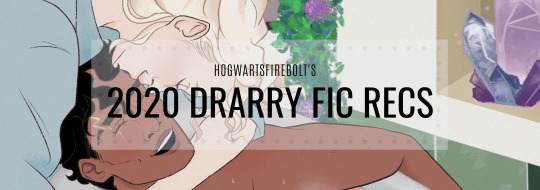
Hello everyone! I’m back for my (omg time flies) third yearly drarry rec list, in which I share with you my 30 favorite drarry fics I read in the year, divided in three parts. What a year 2020 was. It was challenging, scary and confusing, and it was also an amazing reading year for me, I read so, so much more than I ever had before, and I’m really excited to share these masterpieces with you! The banner art is by @dragontamerdame who is one of my favorite artists and was kind enough to let me use this beautiful piece, which you can (and totally should) reblog right here. Now, with nothing else to add and in no particular order, here’s my
FAVORITE FICS I READ IN 2020 PART ONE
1. Who we are in the shadows - @quicksilvermaid - 100k - E - What happens when you’re forced to become the very thing you despise? Ex-Auror Harry Potter, tossed out of the Ministry for something he had no control over, has been looking for a way back to his former life. When he comes across Draco Malfoy in the criminal underbelly of Wizarding London and in need of protection, Harry figures bringing him in to face the Ministry's justice is his ticket back to everything he's lost. But nothing is exactly as it seems. Not even Harry himself. And as he gets drawn further and further into Malfoy's world of honour and deception he finds himself questioning everything he thought he knew—about his childhood nemesis, the Ministry job he misses so much, and most of all, about himself. What happens when you’re forced to see that you were wrong?
THIS FIC!!! It was the first one I read in 2020, and it immediately became my favorite fic of the entire year, and one of my favorites of all time. I have since read it two more times, the entire 100k of it. There are absolutely no words to describe how amazing it is, how much it floored me to read their characterizations, their jobs and the roads life took them on to end up where they end up, the connection between them in a time when they don’t even know how to relate to anyone, their sorrow and struggles which, despite being so rooted in the magical world, are painfully human, just... wow. It’s a masterpiece. It changed the way I view their characters, forever, and I suspect I will read it many, many more times in the years to come. It’s that kind of story. If for whatever reason you haven’t read it, this is your sign to take that chance and embark on this amazing journey.
2. Every Kingdom - @thistle-verse - 7k - E - Every kingdom needs a prince. Every prince needs a good and useful knight. Draco and Harry play their parts and renegotiate some borders while they’re at it.
So, so lovely. Even though I don’t read them very often, alternate universes fascinate me so much, and I am in awe of the author for being able to pack so, so much story, so neatly into 7k words. This features a princely, lonesome Draco, a charming, golden Harry, and a blossoming love that could change everything. It’s beautiful, and I recommend it deeply.
3. The Bucket List - GallaPlacidia - 32k - Draco will die in six months if he can't get Harry Potter to fall in love with him. Since that's not going to happen, he might as well spend his last days working through his Bucket List. Tap-dancing lessons? Rock climbing? Poetry-writing? Threesomes? Cocaine? Getting to know his adorable cousin, Teddy Lupin? Draco will try them all! Feat. Cheerily pessimistic Draco, devoted bitch queen Pansy Parkinson, and a Harry who can't help but notice that something seems DIFFERENT about Draco, these days.
I’m positive that many, many of us got acquainted with GallaPlacidia’s writing this year, and I, too, fell in love with it. This story aches in the most beautiful of ways, the humor happens to be somehow light in such a difficult circumstance that it ends up hurting when you laugh, it hurts when everything is right because it’s also wrong, it aches when it’s supposed to be a happy moment and feels tender and sweet when it’s not. I can’t even imagine the challenge of writing this kind of story, and they pulled it off beautifully. It’s a lovely story, one you will take with you long after you finish it, and, personally, I think it’s a great introduction to the author’s writing.
4. halcyon days - @the-starryknight - 1.3k - T - Sleepy mornings caught while the sun rises are reserved for silly word games and soft touches and feelings.
Oh my god, the amount of tenderness in such a low wordcount made me weak in the knees. I almost couldn’t take it. Being able to convey such a deep emotional connection in a short story seems like such a daunting task, and the author makes it seem almost effortless. I guarantee that this will make you bring your hands to your chest and sigh with how lovely it is. Reading it will be the best ten minutes of your day.
5. Clouds That Veil the Midnight Moon - @drarrytrash - 37k - E - According to Harry’s personal narrative regarding the incident, he’d hooked up with Draco Malfoy for purely self-destructive reasons, or out of convenience, or by some unlucky accident. Looking at him, sprawled in the moonlight, Harry is devastated to recall that he’d hooked up with Draco Malfoy because he’s hot. Draco is a secret werewolf and Harry is doing his best and they've got criminals to catch, darn it.
Reading this, I found myself laughing out loud, nodding profusely with how freaking spot on the characterizations are. The dialogue is amazing, so hilarious and real and Harry’s inner monologue is so, so him. I love everything about this story. I have a soft spot for werewolf fic, and this one hit everything I love about it, the case is interesting and engaging, the incidental characters, the OCs, Ron and Hermione, everyone and everything is absolutely perfect and I had an absolute blast reading it. You HAVE to read this and see for yourself what I’m talking about.
6. Sex Ed for Aurors - curiouslyfic - 8k - M - Some things, you need to learn on the job.
Oh my god this is so freaking good. The premise is, basically, that Harry is accidentally doused with a lust potion while in the vicinity of Draco, and suddenly wants him more than anything. I loved this take on that trope, we’re in Harry’s head, and it’s absolutely hilarious and endearing to experience the near childish glee he feels whenever Draco looks his way, when he smiles, when he feels he’s made him happy, meanwhile Draco and Ron are horrified and doing whatever they can to correct it. This is so funny and such a good time, I can’t recommend it enough! While you’re at it, you should definitely read megyal’s remix of this, which is also a blast.
7. plasticine porters with looking-glass ties - @bonesliketambourines - 15K - E - Lately, Harry thinks things don’t seem the same between him and Draco. His head is in the clouds when he thinks about what their relationship is now, and where it might be headed—he’s happy with their friendship, but he wants something else. A potions accident over a lunchtime visit to Draco’s lab (what does he get up to in there, anyway?) changes things, though, and accelerates their relationship faster than either of them had ever expected. How are they going to get through this new development together?
Atmospheric, beautifully-written and delicious. Their relationship is tender, just on the edge of something more, when they’re forced to quarantine together and face the effects of a potion that makes them see and feel things differently, which makes for the most intense, visual, gorgeous sex scene I think I’ve ever read. It’s just absolutely phenomenal.
8. i wake up falling - warmfoothills - 9k - M - Draco’s always leaving, one way or another. Harry’s usually 240 thousand miles too late.
In trying to come up with a way to summarize this story, I’m feeling the overwhelming urge to cry again, just like I did when I read it. It’s just so, so, beautiful, every single word of it aches in the best way, the longing feels deeply authentic and just, the setting and the jobs and everything is so unique and gorgeous. Every single work by this author is beyond beautiful, but especially this one is incredibly close to my heart and I think everyone should read it. It’s a gem.
9. In Every Universe - @skeptiquewrites - 27k - M - They sent Professor Harry Potter to search for Unspeakable Draco Malfoy. Draco has stolen a Firebird, an experimental magical device from the Department of Mysteries that lets you enter parallel universes as yourself. As Harry traverses from universe to universe, he begins to think Draco might be the one searching for him. A story about whether knowing what's possible makes it possible.
Stories where the characters find themselves somehow hopping from one reality to another are always so, so fascinating to me, and this one is incredibly creative and well-written, so entertaining all around. The mystery of it kept me on my toes, and every single reality was a joy to read. 10/10
10. Life goes not backward - @shealwaysreads - 8k - T - Harry still isn’t used to gifts, but this one is different. A story of coming home, finding safe ground, and the wild courage of putting down roots. Leaving one life behind isn’t always a sacrifice, and sometimes the greatest good comes from embracing the people you love.
My god, there are not enough words to describe how much this story means to me, how beautiful it is, how every single time I’ve read it, I’ve cried. Bella has undoubtedly become one of my absolute favorite writers in fandom. She has such a way with words, there is not one of her stories that hasn’t touched me, that doesn’t feel like an actual, full-length novel no matter the word count. I read so many of them this year, so many of the masterpieces she’s gifted us, but this one especially is so tender, so dear, that I ended up choosing it as my favorite of hers this year. Harry’s charactertization, the unbelievable warmth of their relationship, absolutely everything about this is gorgeous. Go read it, right now, and then binge all her other works!! You won’t regret it.
---------------------------------
Each of these fics is incredibly close to my heart and I enjoyed them immensely. In the midst of everything changing, I really found comfort and solace in the amazing works of the people of this fandom. I hope they give you the same amount of warmth and comfort they gave me, and I’m ALWAYS here to gush about any of them ❤️ Happy New Year!
#drarry#drarry fic#drarry fanfic#drarry fic rec#2020rec#ficrec#draco malfoy#harry potter#drarry rec list
537 notes
·
View notes
Text
the devil judge + the seven deadly sins
so, i made a gifset about who i thought falls under the seven deadly sins. and also shameless plug - please go reblog the gifset i made for this. took me ages to do.
but i figured i might as well make a meta post to correlate. so this is that post. it’s not everything i could discuss. i could be here for hours more, truth be told. but i hope it’s enough to chew on.
while i feel like a lot of these are going to be a no-brainer, i still want to talk it through because idk. i can, and i want to, and i feel like it, lmao.
gluttony

the elite are privileged and have an opportunity to indulge so much more than the general public, but in many different ways. this is shown throughout the show in the fact that they can indulge on luxury food, have political power, they can make a phone call or snap their fingers and everyone must follow their orders.
and the thing about gluttony is that there is always more to be had. you take a little and then realize it’s not enough and so you ask for more. case in point: in episode 11 when sunah suggests that yohan could be the new president, the current one gives her an alternative: dictatorship. because it wasn’t just enough for him to be an actor and the presiding president.
you’ll also know they turn in on themselves - the two other guys in the elite group. one who owns the company and the other dude - i really cannot remember their names and what they do, but y’all know who i’m talking about. it was so easy for them, when threatened, to fabricate documents to give to yohan about each other in order to get ahead. gluttony is only shared in the relationships we have until one realizes they can take a little extra of the pie. it’s the selfishness of having all the leftovers. gluttony cannot necessarily exist without someone else’s sacrifice.
lust
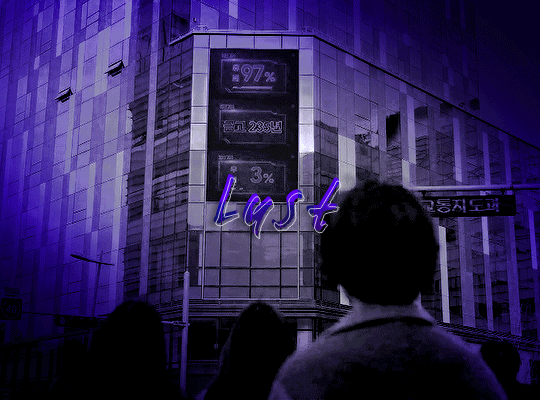
i kind of had an ah-ah moment when i was talking this over with @technitango. i was trying to decide who was going to be lust because lust is portrayed very, very differently in this show than what most of us are used to. we, of course, know sunah who lusts after a life of indulgence and riches because she equates that with respect more than actually wanting it because it’s monetarily worth something.
but then i realized the public is lust because of their need for justice. i won’t say revenge necessarily because they’re doing as they’re told when given the judge show. but we can quickly see how that evaporates into something akin to bloodlust, for criminals and people who normally get away with shit, to have their fair taste at conviction for their misdeeds. we even see it with yohan’s fanboy club - the lust that comes from adoration and dedication.
and even more so, the public is easily swayed and so is the nature of lust. it follows in the vein of needs and wants, and as soon as new information is presented, however may false, so does the wants and desires of what people want sway. how easy was it for them to turn on yohan for a split second on two occasions - on two accounts of bribery.
envy
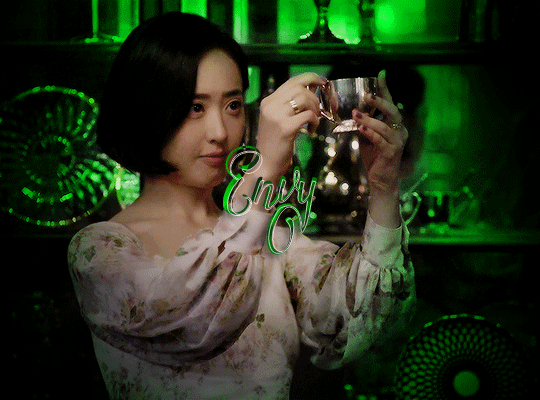
envy, above all, is about wanting what others have because you do not have it yourself. it may not be exactly what they have, but a form of it. some people don’t necessarily want money - they want what it can by, which is time, health and material goods.
sunah is the perfect example of this. she envies respect and recognition. she talks about bright and shiny objects, and that’s true to her kleptomania tendences, but more than anything, she wants to be seen as an equal because being poor with a vastly different upbringing means she’s looked down upon by those she thinks matters.
which also begs the question why she feels the need to seek validation from people in higher statuses to begin with when she can be the exception and not the rule - form her own understanding and environment to show others that the typical way of the elite is not actually all it’s cracked up to be - to which we see when she has no one to celebrate her victory with. it’s lonely being at the top. you get to your goal you thought you wanted but then what?
more importantly, sunah also envies family, relationships and simply put, human interaction. she wants to be cared for and treasured, and she looks for that in her position of power. because then all eyes are on you. because then that’s what people care about. what she fails to see is that those eyes are just as fruitless and just as wavering. to be a leader means people loving the idea of you but not you as a person.
“people of envious nature are sometimes stimulated to seek to emulate those who have completed some great achievements and in doing so achieve something great for themselves,” according to Understanding Philosophy.
wrath
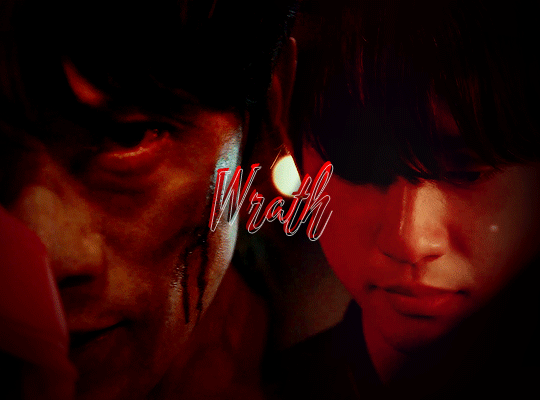
while i realize that gaon not might entirely fit the wrath trope, he certainly has his moments, and i think he’s lived with a tampered flame since his parent’s death. he just learned to briefly put it out in the form of distractions and a false sense of righteousness and justice. it isn’t until he meets yohan that someone finally gives him the okay to feel the entirety of his emotions, that lets him breath and tells him it’s okay to feel anger and hurt. and while gaon ultimately chooses not to exact revenge, his wrath is what led him to becoming a judge and walking away from his teenage crimality.
gaon transposed his wrath into seeking justice, transformed it into livelihood, and reformed his narrative so that he was no longer angry and a teen with rash emotions. it was simply redirected and never really forgotten. yohan turned that redirection back around onto gaon’s ultimate heartache. fueled with that, it became easier to justify himself and his actions.
the most pivotal moment of turning his back on this mindset is, of course, the minister’s suicide, where he takes a good look at himself and doesn’t like what he sees. at this point, gaon’s upset isn’t necessarily at yohan but at the situation in which they got themselves into. because the thing is, gaon doesn’t absolve himself from what they did. he doesn’t turn a blind eye to that and try to dismiss it. he owns up to what happened and confesses how he feels to yohan and how he has to leave for his own good, and in some indirect way, for yohan’s, too.
with yohan, his ultimately weakness, despite never admitting to it, is family. his wrath comes in the form of anger when the ones he loves are threatened. yohan lives by a moral code of loyalty because that means you won’t be abandoned, and as a child who lived with that verdict since the day he was born, it’s an ever-pressing theme of his.
thing is, wrath comes in two particular forms for yohan. again, one is family and the second is the rose-colored glasses he’s given himself in his revenge story. he’s always had a goal to presumably make right the wrong for taking away isaac, but within that, 10 years is a long time to plot revenge, to the point where it becomes so much easier to lose yourself to that, to become enraged with it and forget the initial goal all along. we see this in his inability to form the bonding moments needed with his niece and his casual throwaway comments over people’s lives - the comment he made to gaon about moving on to the next plan, and the ultimately nail in the coffin of pushing gaon to leaving him.
his fury has also led him to convince himself his own humanity is nothing short of a lie. therefore, it’s easier to justify the means to an end because of his own self-worth and self-deprecation. it’s almost like a self-fulfilling prophecy: he even admitted to gaon’s mentor that he is an abyss. he’s referred to himself as nothing but an animal or a monster - all characteristics of despondency to survive and to justify what he’s doing. sort of like a catch 22, yohan claims he’s an animal/monster and behaves as such, but because he behaves as such, it means he’s an animal/monster.
wrath for gaon and yohan are very different yet the same. they are slow-burning, and that’s a dangerous type. it’s actually interesting when you think about the fire imagery surrounding the two of them because flames are quick to lap at anything in its wake, to destroy within a matter of minutes. and yet for the two of these men, their internal fire eats them from the inside out, painfully, until they’re almost unrecognizable to others and to themselves.
sloth
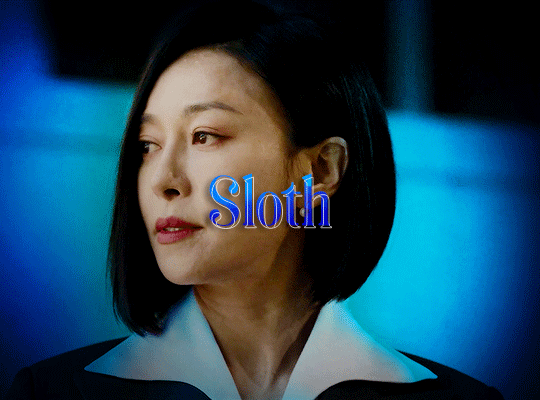
sloth was a little more difficult to pinpoint because of its characteristics. it was either the minister versus the mentor, both of which i think could work in this role. however, i chose the minister simply because she’s featured more and intertwines heavily with the plot line.
soth is a medieval translation of the Latin term acedia, meaning “without care.”
the ultimate characteristic of sloth is often identified as laziness, and while it’s easy to argue that the minister hasn’t been lazy in her ability to get where she is, she became as much when she started lying to get to her position. isn’t lying known as the easier way out? it absolves you of responsibility, of putting in the hard work, of apologizing and making things right. in the end, she had a goal and found the easiest solution to get there through her lack of responsibility for the roles she more than likely swore an oath to.
but that also translates into the other attributes of sloth: a failure to do the right thing, lack of emotions for people or of the self, and the fact that it “hinders man in his righteous undertakings and thus becomes a terrible source of man’s undoing” according to The Seven Deadly Sins: Society and Evil.
while i think there are a lot of components of sloth that may not necessarily fit the minister, the apathy and carelessness are enough to showcase her aggression, despondency and restlessness when what little efforts she does put in do not go her way. another interesting thing to note is that many of sloth’s traits correspond with symptoms of mental illness, such as depression and anxiety. it’s an interesting thing to note given the way the minister chooses to end her life.
greed
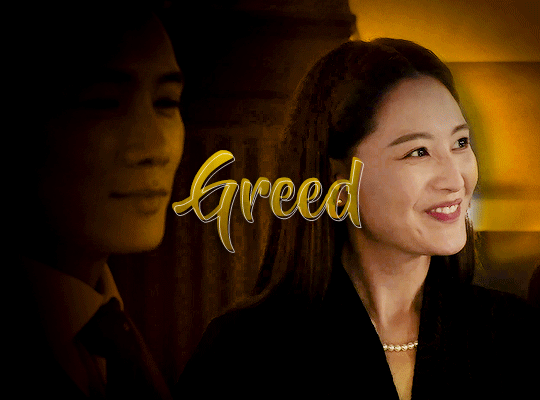
i don’t know that jinjoo would’ve had any provocation to the limelight if it wasn’t for sunah’s direction, but she’s eager to please and wants to be useful. it’s only natural for her to want more because it’s clear she’s a career woman, loves her job and has a heart for serving the people.
but like gluttony, greed is also that little thing that plants itself and can take on a life of its own. you start looking for justifications as to why you can’t have more than what you do, and in jinjoo’s situation, she’s already overlooked through no fault of her own. and it’s not that gaon and yohan are doing it purposefully, which is what makes their neglect heartbreaking, because truthfully, they’re after the same thing jinoo is. sure, it looks different and the foundation of it is different, same with their motives. but they’re all three judges on a residing bench working to exact justice - even if all three of them have their own personal agenda.
i don’t think jinoo fully aligns with greed, but she does want more for herself, and i think that’s only natural. you can tell she has a heart, and she’s keen not to be overlooked. this isn’t her pain point so much as it is she knows her worth and is more than ready to do what it takes to get where she wants. this, in and of itself, isn’t necessarily a bad trait, but we can see how it leads to being deceived, especially for someone who’s been left in the dark for so long.
she is enticed by the glitz and the glamour of being a head judge, but you can tell she feels some remorse and guilt for those thoughts at times. i think her sense of greed is a battle within herself more than it is extremely outwardly.
pride
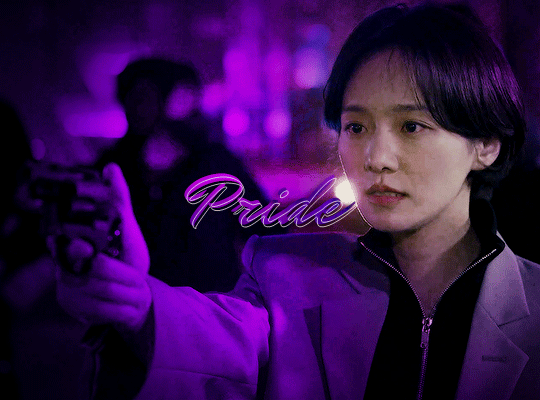
soohyun’s pride comes in the form of her imbalance with right and wrong. her sense of righteousness and justice is so far leaning, even more than gaon’s. it can be chalked up to her being a cop, but we’ve seen instances of this outside of her role within that agency. her pride doesn’t let her see beyond saving gaon and getting to the bottom of every mystery that comes her way.
it also comes in the form of impulsiveness and her savior complex, putting elijah in danger, for example, instead of waiting for backup. it’s not necessarily from a belief that she can fix things all on her own, but she sees injustice and immediately jumps in. another case in point is her and gaon watching yohan wreck the minister’s son’s car. she’s ready to go stop him, but gaon pulls her back, most likely because at that point, they hadn’t been observing the situation for very long to get a read on it. also the fact that at that point, neither of them truly knew yohan and his capabilities.
but as to where her characteristics come from, we simply don’t know beyond that of gaon. it’s unfortunate because we don’t have much of her backstory, so there is no real understanding why she so firmly believes in entities of regulation beyond keeping her friend out of jail. she prides herself on her work and what she’s able to accomplish, which is why it’s devastating to her to have to protect gaon by cleaning up his bloody handprint.
aristotle is of the belief that, “pride, then, seems to be a sort of crown of the virtues; for it makes them greater, and it is not found without them. Therefore it is hard to be truly proud; for it is impossible without nobility and goodness of character,” from Nicomachean Ethics.
but pride for soohyun isn’t about honors or rewards. it’s for herself and her capabilities, her ability to protect gaon, and the virtues she’s set as the precedent for herself. because sometimes it’s not even about establishing morals and ethics upon yourself. it’s about feelings/intuition, logic and observation. and no, i don’t mean the feelings she has for gaon. there are things that humans do, both actions and words, that we inherently know are bad without someone telling us as much and without the rules of the world seared into our brains. there are some things we know, for a fact, are wrong to us as individuals.
for soohyun, she knows that gaon’s actions, and even her own, have consequences. from what we’ve seen, i think it can be argued that it’s really about not doing those actions to prevent an outcome - not necessarily from a place of being just and right. that doesn’t mean she doesn’t understand good morals/ethics, but again, we have no background of what her internal guidance actually is.
to put this in layman’s terms, we’ll use gaon wanting to stab the conman in his youth. soohyun knows it’s wrong because it will incriminate gaon and therefore she stops it. gaon’s gone to her because he sees her as a moral compass. but is her own internal navigation rooted in justice the way gaon had to find it in the judicial system, or is hers rooted in her pride of keeping gaon safe? she stops him from doing things that will get him in trouble, but is she stopping him because the action itself is wrong or because the outcome will result in undesirable consequences for the two of them?
and of course, there is a flipped argument to be had there - i’m not arguing that gaon stabbing the conman would be right or justified. but what i am saying is that for her, her worldview is the only right one, and when anyone steps out of that, even gaon, it becomes a bit of an issue: the pride she has for that is palpable.
every character indulges
truthfully, every character has at least one form of these sins rooted in their characterization. some are larger than others, but the breadth of it can be explored even further for each. and that’s what makes them more realistic and not just characters written on a page or following a linear progression of their writing deity.
the seven deadly sins are also notoriously rooted in religion. they’re also a defining feature of aristotle’s works that represent the golden mean, in which each vice is parallel to a virtue.
the devil judge is so layered, but i think at the heart of it, it’s about humanity at its core. sprinked in are the philosophies and contradictions and what it means to look in the mirror, what happens when we’re blind to seeing our true selves and most importantly, how much changes when we’re swayed by our own misgivings. it really asks us to understand nature versus nurture, that people must find a belief in something to keep them going, and how futile our hopes and desires can actually be if we’re not carefully regulating ourselves, nevermind the entities established by society to regulate us, too.
the entirety of the show genuinely begs the question as to who is truly right, who is truly wrong, and if it’s even possible to find the correct answer.
#x#the devil judge#the devil judge meta#*#*the devil judge#so i have some Thoughts#probably not very good ones but ya know
53 notes
·
View notes
Note
I'm okay with a bunch of disorganized rambling honestly 😂. But if I had to narrow it down then I guess I want to know about main and side characters and how they compare to the original?
I know that tumblr is the Prime Site for disorganized rambling, but I have perfectionism issues. But that is a great question, nonnie, and I will be happy to ramble is a slightly less disorganized fashion.
When reading Maximum Ride as a somewhat-formed adult who discovered they enjoy English classes about 3.5 years ago, I noticed that JP, when writing, doesn't understand consistency. At all. Which means, in many ways, I have a free sandbox to work with.
Spoilers for my rewrite WIP, because I strongly believe that if a story would no longer be good if one had spoilers, then it wasn’t a good story in the first place.
I'm trying to keep the backstories the same, plus or minus the scientific method and a few characters (RIP my OCs. I want to bring you back so bad but it wouldn't fit with the thematic narrative). I've mostly kept their (starting) abilities the same, too. Without further ado, I'm going to introduce some WorldBuilding. (If I'm good at nothing else, I'm good at world building)
First off. Logically.
How are they getting Cable?
How are they getting internet?
How are they getting money to eat and stuff?
JP's answer: handwave it off. Sometimes you need to ignore logistics for the sake of plot. This is an answer I'd accept from an author that I like, such as Julie Kagawa, that makes amazing worlds, characters, and narratives that I will happily handwave a few things that wouldn't work in the real world. James Patterson, on the other hand, did not make any of that; he made a cool concept, some good rough-draft characters, and nothing else, and therefore this is an unforgivable sin.
Wasp's answer: They are not getting any of that.
Introducing Cottagecore.
The house is off the grid. Solar Panels and a wind turbine create electricity. They have their own well. They grow their own food, raise livestock for eggs, milk, and wool, and trap fish for meat. They get money through dumpster diving and pawning. They still have to steal half of the necessities they can’t make themselves. They do have a TV, but it can access about three channels on a clear day. Internet is only a thing when they go to the public library.
Giving the flock a background that’s heavy in farming and livestock rearing shores up the plot holes mentioned above, but in my opinion, ties the flock more tightly to the environment, thus giving them something tangible to lose when they have to leave the E-shaped house. Because they’re not just leaving a house and a safety net— they’re leaving their entire way of life with no promise of getting it back. It also gives them a tangible connection to the earth in case I want to actually pursue the global warming themes.
Main Characters
Maximum “Max” Ride (Birthname: nonexistent)
First off, I'm letting her be Latina, James Patterson.
In the original, Max was very much the headstrong, independent, action girl. Leaning into Strong Female Character (TM), but overall she had a strong, solid foundation and enough character consistency through the first three books for me to not have to just make an entire new character. However, I felt that she was, in some ways, a bit too Action-Girl and Strong and Capable. Yes, Max is incredible and competent, but she’s also fourteen. She’s a child.
In the rewrite, Max’s character is still headstrong, independent, capable, and sometimes not the best at listening to others. All of that’s the same. But she’s that way not because of girlboss energy, but because there’s no one else to do it. She doesn’t want to lead, necessarily. She wants to get some rest and let someone else handle the problems life keeps throwing at her. But she knows if she did that, the responsibility of leader would fall to Fang and Iggy, and she can’t ask that of them. She doesn’t want to place that burden on anyone else (Look, there’s a reason I chose Ayano’s Theory of Happiness as one of her signifier songs, okay?). Her narrative is very much centered around burden, and also around loss. She lost her cultural heritage when she was taken away from her birth family, she lost her childhood to being a leader, she lost a good deal of her friends to the school (RIP my OCs), she lost Jeb, and then she lost her stability. And she’s going to lose a lot more before the end of the story. So a lot of her character arc deals with learning that there are some things she can’t fix, some things that can’t be recovered. She can’t get the E-shaped house back. She can’t get her Little Baby Angel back, even after they rescue her. She can’t get her friends back from the school. And instead of working so hard to recover those or find something to replace them, she has to learn to live with that sense of loss and move on with her life without feeling guilty for leaving things behind. And she has to learn that asking for help and sharing her burden is selfish or weak.
Other changes I made that don’t necessarily fit into her narrative arc, but you asked for rambling so rambling you shall get:
Max hallucinates, because mental illness is also a prominent theme in the rewrite. She doesn’t have a psychotic disorder, but her C-PTSD causes visual/audio hallucinations, especially when she’s stressed or sleep deprived.
Max ends up having a Gender Discovery throughout the story and goes by He/She pronouns eventually. I don’t know when, but it will happen.
As far as genetic modifications/special quirks go, she can fly faster than the rest of the flock, but not 300 miles per hour. She averages about sixty mph with diving speeds of 240. She cannot breathe underwater or shut down her organs on command. She also has the Super Special Power to predict the weather, but that’s not because of genetics, it’s because she has chronic pain in her right arm that gets worse when weather fronts change.
Her favored weapon is her trusty rebar that she picked up from a condemned building. I think she’s going to name it eventually but I don’t know what yet.
Fang (Birth name: Gabriel Xue)
In canon, Fang is characterized in early books by being the “dark, strong, silent type”. He’s probably the most reserved member of the flock, to the point of falling into the Brooding Mystery Man trope in parts of the book. They care a lot, but they’re not the best at conveying that, especially with the younger members of the flock, and at times their high empathy leads them to making mistakes. Despite the high empathy, he’s often compared to a robot due to his lack of expression and external emotions.
Well, first change is that they’re not a man, so jot that down—
If Max’s narrative is centered around burden and loss, I would probably say that Fang’s is centered around humanity and moving on. None of the flock was treated as human while in the school, but Fang was more often than not treated like a wild animal due to “behavioral issues”, and therefore had and continues to have a difficult time considering themselves real and alive, let alone human. This manifests through a several different ways— where in canon Fang definitely had a ‘fight’ reaction, in the re-write they have a ‘freeze’ or ‘shut down’ instinct. They’re selectively mute for multiple reasons (including derealization, jaw pain, the fact that they didn’t learn how to speak until they were 10, and genuinely forgetting it’s something they’re capable of), a period of Cotard’s syndrome, and a tendancy towards self-loathing and self-sacrifice. In short, Fang is still halfway stuck in the mindset that most of the flock grew out of when they escaped in the school, and doesn’t know how to move past it.
Much of their character arc revolves around not necessarily seeing themselves as human, but learning to treat themselves as human even when they don’t feel like one (or even feel real), and knowing that just because they don’t feel human all the time doesn’t mean anyone else can treat them the same. They never start easily expressing their emotions, and they’re always going to be selectively mute, but they learn to accept that those aspects of themself aren’t character flaws or signs that they’re sub-human.
Other additions to Fang’s character include:
They don’t get their hair cut in New York. It stays long through the entire series. They have the longest hair in the flock by the end of the series, and they can wear it in so many styles.
Fang uses they/it pronouns because themes of reclaiming the weapons used against it and, more importantly, Gender.
They’re actually really good at spelling compared to the rest of the flock, because they and Iggy communicate with Print-On-Palm when they’re nonverbal, and they’re nonverbal for some pretty long stretches of time.
They and Max have... zero romantic tension. At all. There is none. The number of times Max calls them her sibling/little sibling in the first arc alone is staggering, and that will not change.
Igneous “Iggy” (Birthname: Jamsetta “Jamie” Griffiths)
I’ve talked about Iggy before. Canon doesn’t give us much to go off of, but from what’s shown, he’s smart, sarcastic, has sharper edges than Fang and Max, and also has a sizable ruthless streak. So that’s what I have to go off of.
The big difference between Iggy and Fang&Max is that Iggy has a much better memory of the School. Most of the flock have areas (months or years) that they don’t remember, or people that they’ve blocked from their mind, but Iggy... doesn’t. So he’s the one that remembers all of the other AVIAN test subjects that were old enough to have names and identities but died due to complications. Max might have the burden of leadership, but he has the burden of memory. And that has lead to both a massive fucking guilt complex, because why did he survive when they didn’t, and, as mentioned above, a ruthless streak that he doesn’t shy away from.
Which is to say, by the end of the story, Iggy has the highest kill count.
I love, love writing Iggy next to Max and Fang. I love writing Iggy next to Gazzy and Nudge. Because, I say this with all of the love of the world, but Iggy is not a good person. He is loyalty and love incarnate, and the world can burn down if he and his siblings are safe. Max and Fang will always try to save as many people as they can. They will wonder what’s wrong with them the first time they kill and don’t have a mental breakdown about it. They are good in a way that Iggy is not. He’s okay with killing Erasers. He’s okay with killing humans. He’s okay with killing people who might not necessarily deserve it, if they show themselves as a threat or are simply in the blast radius. He knows perfectly well that most of those Erasers he’s murdering are four and five and he is okay with that, because a lot of the AVIANs were that age when they died. (Yeah, in the rewrite it’s not Fang who has an issue with Ari; it’s Iggy who wants the 7-year-old wolf-boy dead.)
And this is, of course, juxtaposed with Iggy being really, really good with Nudge and Gazzy (especially in the beginning). Because, again, he actually remembers being a child. He remembers a lot of kids that died and is therefore fiercely protective of the kids that didn’t, as well as fiercely protective of the innocence that he never got. So he’s the one that cooks their favorite foods when they’re having a bad day, always makes time when they want to talk about something, and convinces Max to let them go to that toy store in New York because, yeah, he Max and Fang aren’t kids. They never were. But Nudge, Gazzy, and Angel can be. (And if he has to be a murderer to preserve that, then he’s perfectly okay with that.)
He and Angel don’t get along very well, though. The telepath doesn’t like hanging out with the person with the most clear memories of the school.
Other additions:
Iggy is trans and says trans rights
He also has paranoid episodes, because C-PTSD. Sometimes they’re very helpful. Sometimes they are not.
I actually decided that he’s one of the flock that doesn’t meet their parents. I know in canon he did, but I always found that very clunky because it didn’t add to his character. He was one of the characters who, until it was convenient for the plot, seemed to care the least about his family. I’d much rather give that to a character whose arc would benefit from it.
Iggy! Gets! Older Sibling Rights! Seriously, he’s two months younger than Fang, he is just as capable.
Iggy does not know braille because Jeb decided it wasn’t necessary for him to know. Iggy is also the best speller in the flock, because Print-on-Palm was the only way to talk to Fang for a solid year. Yes he mocks everyone over this.
Iggy is the only member of the flock that enjoys swimming and can take into the air from water. Everyone else in the flock is incredibly jealous.
Nudge (Birthname: Monique Robinson)
If Iggy is defined by his memories, Nudge is his polar opposite. She was seven when she left the School, but she has next to no memories of it. She is missing a lot of time in the first year she escaped. And that causes... a lot of things. It makes her feel disconnected from her older siblings, it gives her the ability to function in society in a way the other’s can’t, it lets her feel less grief over the ones that didn’t make it and she doesn’t remember, it makes her feel guilty that she doesn’t remember what she’s old enough to know.
Basically, in order for me to keep the character of Nudge as I saw her (more extroverted, not afraid of the world, fascinated with humans like her siblings aren’t, desiring to fit in instead of isolate), I had to put a little bit of distance between her and the flock. Of course, she loves them— that will in no way change— but she’s old enough that she should remember the school (and her dead friends) unlike Gazzy and Angel, but she can’t, and she very much fears forgetting the flock if anything happens to them. So she’s trying desperately to keep the flock close and wants desperately to experience the world at the same time, and doesn’t know what to do when she can’t have both. That’s her biggest character conflict throughout the series, along with that in-between area where she’s not quite where her older siblings are but understands so much more than Gazzy and Angel, and where she stands in that.
So yeah. Nudge’s journey is that in looking for belonging in the world, in her family, and in herself.
This is why she’s one of the ones that gets to find her parent, James Patterson.
Other additions include:
She never straightens her hair. Never. Her resources at the E-shaped house aren’t perfect, but she still has learned how to take care of her hair and has a few styles she cycles through.
She becomes the default person Max sics on people when the flock is trying to befriend them. Also their de-facto diplomat around strangers.
As in canon, she does take some time away from the flock to expirience ‘normal life’. This does not last long due to the stress of being separated from her siblings/not being able to help them and [REDACTED]
Nudge is... not the only person in her head. I’m not focusing on it much because she doesn’t actually know and neither does the flock (I don’t know if they ever figure it out during the series, either), but she has dissociative identity disorder. She’s not aware of her alter(s?). Her alter isn’t super aware of her, either.
The alter that I’ve developed is named Oxy and is not super aware of the outside world. In her eyes, she’s still seven and they’re still at the School. She would not recognize the body as her own if she looked in a mirror.
Nudge actually leaves the flock for a while to pursue her dream of living a normal life. She deserves it. She learns how to make muffins and the basics of software development. These things are unrelated.
Gasman (Birthname: No first name, surname “Falk”)
Honestly, writing Gazzy is kind of hard for me. Partially because I’m not great at writing kids, and partially because I feel like he’s a pretty surface-level character in-series that... isn’t super compelling in canon. But even if that’s the case, I try to treat all of my characters with respect, so here we go. In my rewrite, he escaped when he was four, which was half a lifetime ago for him, so his memories are ill-defined. Therefore, he managed to circumvent a lot of the trauma that the rest of the kids have, and not in the way Nudge did, which is by creating an elaborate blockage in her memories.
Which means Gazzy... really doesn’t know how to deal with all of this traumatic stuff happening. So much of his development turns out to be a coming-of-age narrative. Learning how to deal with the horrors of what his siblings grew up with. Learning the fears that they had the entire time. Losing his innocence when everyone around him never had it in the first place, and being so terribly alone because of it. Because, really, how can you explain such a deep loss to people who never had what he had? How can they help in a way that matters?
Also, relationship-wise, I’m slowly deteriorating the relationship between him and Iggy. Slowly. Or, changing it, at least. Gazzy hero-worships Iggy in-series, and for good reason, because Iggy is super cool, especially in the eyes of an eight-year-old, and especially when Iggy has taken care to cultivate parts of his behaviors to be child-friendly. Part of growing up is seeing the flaws in your heroes, and Gazzy has to learn how to deal with it. End of the series Gazzy is much less closer to Iggy than beginning of the series Gazzy, and neither of them are really okay with that, but they learn to live with it, because that’s really all they can do.
Notes:
I’m keeping the mimickry! It plays a bit of a bigger role because that’s how Gazzy learned to talk. I’m debating whether or not he has his own voice or if he just borrows the flock’s as he sees fit. He also uses it to scream really loudly and occaisonally burst the eardrums of Erasers.
At one point he cosplays as Jessica Jones. No you don’t get any more context than this.
He has a horrible sense of fashion.
I’m changing his name eventually because it sucks. He’s either going to change it to Gannet, Garrison, or Ivy Mike temporarily, and permanently to Zephyr. (I never said I was going to make his name GOOD, because he’s eight, but it’s changing. You’re welcome.)
Angel (Birthname: No first name, surname “Falk”)
It’s just... a completely different character, at this point. I’ve changed so many things about her in an attempt to make her consistent and act like a six-year-old and work in the whole “telepath before she has a solid sense of identity”, so it’s a different character. Also, I’m tired of writing coherently or in paragraphs, so have some interesting facts.
She has epilepsy! Super severe epilepsy! I think she might also develop juvenile MS in the future because her brain has so many scars from being a fucking six-year-old telepath. There’s no way she could get out of that unscathed.
She has more memories of the school than Gazzy, but only because she keeps accidentally reading the minds of Max, Fang, and Iggy. On a related note, she interacts with Iggy as little as possible.
The mind reading means that she has a hard time developing as a normal child with a normal sense of identity or reality. She can’t tell how much people are individual people and how much they’re just extensions of her. Conversely, she can’t tell how much of herself is actually her instead of the thoughts/opinions/identities of someone else. It’s... kinda fucked? But also super not-her-fault.
She’s albino because white wings. Also, because I thought it was cool. This also means that her vision sucks, though. Also she has the biggest straw sunhat and the most stylish sunglasses a six-year-old can have.
She’s responsible for Max shaving her hair off.
She has the highest swear count because I think it’s funny. She’s the only person allowed to say the fuck word in writing. Everyone else can only say ‘hell’ and the occasionally ‘damn’ but she can say whatever she wants for dramatic and comedic value.
She is NOT THE FUCKING VOICE, J*MES P*TTERSON.
Honorable Mentions
Jeb
I’m skipping Jeb because of how little I care about him. He’s a little bitch, next character.
Ari
STILL HASN’T BEEN REVEALED AS AN ERASER. I’ve been writing for 50,000 words and he’s over here saying ‘nope nope not yet, not dramatic enough’. He’s had speaking lines but has refused to make himself known to Max. I am so frustrated with this seven-year-old wolf-child that I’ve already considered how I would kill him, if I decide I want to kill yet another child in my writing.
So, my main thoughts for Ari is that he... really just drew the short end of the stick in every possible way. While Jeb didn’t sign him up for Eraser expirimentation, he didn’t do anything to stop it, and pretty much cut his losses when he realized this expiriment made a wreck of his ‘perfect, unflawed’ son, because Jeb doesn’t consider children of any species to actually be humans. So, Ari really hates his dad, which makes things complicated, because he also really loves his dad and really wants his approval.
Which means that he also really hates Max, because she’s the child that always got Jeb’s time and attention, even when Ari was human. I think, on some level, he knows that trying to tear Max down to a less-favored level isn’t actually going to help his situation— infighting for the love of an abusive parent won’t make them any less abusive— but he’s also seven, and his development is already severely stunted due to becoming an Eraser, and he doesn’t see ‘leaving ITEX’ as an option like the Flock does. ITEX is his everything. It’s all he’s ever known, and they tell him he’s doing the right thing, and he wants them to love him. He wants his father to love him. He knows that if he ever questions ITEX, his father will never love him. So it must be his older sister that’s ruining his life and being a horrible child, and once Ari drags her back down to his level, Jeb will realize who the best child is and love him properly again.
Ari, on an even deeper level, does care for Max quite a bit, because she’s his older sister and he wants that to mean something in a way that ‘Jeb being his father’ obviously doesn’t. He wants what she made for herself, and he hates the Flock because she loves them and obviously doesn’t love him.
Ari, if anything, is the product of neglect, and both loves and hates everyone who shows a chance of caring about him. And he’s seven, so he can’t notice these patterns, let alone break them.
So. Notes!
He doesn’t look like an adult. I thought that was gross and unnecessary. He’s seven, but he looks closer to thirteen or fourteen. Still young enough that he looks like every Eraser’s little brother, and the Erasers high-key treat him like it.
On a related note, he’s the only Eraser who can talk. The others don’t have the mental capacity or vocal structure to replicate human speech, but they can understand language (at about the level of a two or three year old) and are very good at nonverbal communication. This is why Ari managed to climb the ranks despite only having three years of “service” and also looking like a tween.
He doesn’t have an expiration date because that is SUCH a stupid plot point.
I’m giving him a chainsaw! I don’t know how, I don’t know when, but he deserves to have a chainsaw and GODDAMN I will give it to him.
Emergency and Gene
The OCs that I love and also killed pre-series. They don’t have any scenes, because they’re dead, but their deaths greatly effected Max, Fang, and Iggy, and they are very commonly referenced. Their voices are probably Max’s most common hallucination, to the point where she sometimes pretends they’re ghosts that she can talk to. They’re not ghosts. They’re dead.
Dr. Valencia Martinez
I’m actually keeping her pretty close to canon— loving, supportive, the type of person to take in a gsw victim with minimal questions. The difference is that rather than kindness fueling her actions, it’s incredible guilt. She has three goals surrounding Max: Give her as much support in any way she can, teach her as much about chicane culture as possible, and never let Max know that she’s her birth parent.
(She’s probably going to fail at AT LEAST two of those, but it’s the thought that counts.)
Notes:
She has a pet fox named Robin Hood that she rescued from an exotic animal salesman that got arrested.
I think I’m going to kill her. I don’t know yet, but it’s on the table.
Anne Walker
Y’know, the fake FBI Agent. Who’s not actually a fake in my story because I hated that plot point. She’s genuinely an FBI agent who put the Flock into pseudo-witness-protection in order to build a case against the Institute of Higher Living, accidentally got attached to her prime witnesses, raised them for a few months, realized a [SPOILER] and promptly had to let them get the hell out dodge.
I really like the Anne Walker that lives in my head. She is a VITAL part of the Flock’s development, their mental/emotional recovery, and adding to their safety net to fall back on. She serves them as their first adult role model, and is the first adult to show them what parent/child are supposed to look like from a healthy perspective. Though she has several fuck ups, she becomes someone that the Flock genuinely trusts and loves, which makes it all the more difficult for them to leave when [REDACTED].
Notes:
She and Max do butt heads initially, because Max is paranoid and also afraid of becoming uneeded. This ends up being incredibly important because Max needs to learn how to live and find meaning in life without being the designated Leader/Parent/Big Sister
Anne, at one point, sits the entire flock down to teach them about consent, which was something no one ever talked about with them before. She goes in talking specifically about consent in a romantic/sexual sense (because they’re fourteen and that’s something they need to know), but quickly turns into a full-fledged no, people are NOT allowed to do that to you, what the FUCK.
She’s responsible for giving the flock a laptop. It’s because Angel is online schooled (bc telepathy makes actually learning difficult) and was therefore provided with a computer.
Anne is also allowed to swear, but only when it’s funny.
Michael “Grey” Rivers
Aka Grey from the Sewers Aka GR3Y H47 Aka Mike from the Bronx Aka Gifted Child Syndrome Incarnate Aka Would-be-in-MIT-if-his-parents-weren’t-horrible. He’s my son, your honour.
Basically, his backstory boils down to him being a genius, getting into MIT at 14, his (horrible) parents wanting a perfect child who could “make it out” of the Bronx and represent his family/neighborhood/borough to the world. When he inevitably failed their expectations due to stress, a schizophrenic-spectrum disorder that completely alienated him from the rest of his support network, and refusing to take his psych meds because the side effects were horrible and they made it harder to think (and therefore pass his classes), they kicked him out. He fully intends to go back to MIT when he turns 18 and has control of his finances/scholarships/medication/therapy.
So that’s how the flock meets him.
Mike ends up in a very prominent support role for the flock both in technological persuits (helping them track their parents, helping them get information from ITEX, trying to disable Max’s chip and failing multiple times until it becomes a matter of personal honour—), in helping the older members of the flock figure out how to deal with hallucinations/delusions (because he’s actually been to therapy, unlike them), and in being one of the only people who talks to them and helps them without any ulterior motive. He’s not trying to build a case against ITEX/The Institute of Higher Learning, he’s not double crossing them, he’s not plagued with guilt. He just genuinely wants to help them, and they genuinely want to help him, and that’s their first introduction to a healthy, non-codependent relationship.
My many disorganized notes on Michael Rivers:
He’s from specifically Morris Heights, Bronx, NYC.
He would say that his last name is actually Rivera, but his grandparents changed it to Rivers so it would sound more English, and his family has been in America for so long that he doesn’t know much about any Latino heritage he may or may not have. He identifies as African American, not Afro-Latino. He’s just bitter that his family felt the need to change their surname to have better opportunities in New York.
Nudge aggressively befriends him pretty much the moment she meets him, bullies him into teaching her how to code, and he very quickly adopts her as his pseudo-little-sister.
His delusions in the book seemed to involve government conspiracies, but as that’s the one delusion that is proved correct in the book, I’ve decided it would be best if his delusions and reality intersected a bit less if I don’t want to write him having a manic/paranoid episode in the second scene he has screen time. So his delusions are more based on “none of this is real”, “someone is recording everything I do and setting me up to fail” and “my ill-wishes on people can and will come true if I dwell on them too long.”. Government conspiracies are one of things he is skeptical about because he thinks most conspiracies are either “CIA admitted to this twenty years ago” or “antisemitism”.
He’s taking online free college classes that don’t actually give him any college credit, but they have good information and help him feel like he’s working towards something. He plans to double major in computer sciences and electrical engineering, minor in marine biology. He’s wanted to join NOAA since he was twelve and he is nothing if not stubborn.
There you go. These are my characters, now. I have custody.
35 notes
·
View notes
Note
in your expert opinion what are some of the most destiel-heavy episodes of spn? i stopped watching around season 7 and have no interest in engaging w the plot of the show at all but i’m in the mood for some gay yearning ykwim
Hi anon! Thank you for reaching out to me about this, I’m, no-joke, very flattered. I’d seen a couple posts on this same question, very thorough and detailed lists on Destiel-centric episodes, but at the moment I cannot find any of them, that would’ve answered your request much faster. So, in advance, sorry, my reply is probably coming in extremely late, but I did write this from scratch, so yeah.
Even though storylines in SPN can be very shitty and hollow, I do feel that to get the full Destiel experience -that long-drawn yearning- one would have to watch the entirety of the show, even if Cas isn’t in the episode or if there’s no explicit mention of their relationship/bond because it gives you a better understanding of them as characters and of how their relationship affects the narrative.
Now, you mentioned you stopped around S7, which is completely understandable and justified given the Dick plot game was very weak and, in my opinion, annoying (so little Cas!). I’m going to start listing from S7 in case you want to refresh your SPN before jumping straight into unseen episodes. Also, since you mentioned no interest in the plot and are specifically craving those sweet crumbs of gay yearning, I’ll skip most one-sided / too subtle episodes and cut to the chase.
Lastly, I hate spoiling things, but you’ve probably seen it all on Tumblr. I tried to keep the episodes’ descriptions short, as it might come in useful. Stuck to key words, quotes and/or little comments.
Season 7
7x01 – Meet the New Boss: Godstiel, sincere apology. Cas: “I'm gonna find some way to redeem myself to you.”
7x02 – Hello, Cruel World: Mourning. Trench coat melancholy. The heart-wrenching eulogy: “Dumb son of a bitch.”
7x17 – The Born-Again Identity: Emmanuel!Cas, reunion, longing, hurt.
7x21 – Reading is Fundamental: Honey!Cas, hug, hurt, reunion, that painful SORRY (board game) scene.
7x23 – Survival of the Fittest: Honey!Cas, forgiveness, adorable, wified Cas. Dean hits us with: “Nobody cares that you're broken, Cas!" but also “I'd rather have you, cursed or not.”
Season 8 (this season is so good and Destiel is the driving motor of it, I swear. If you can, watch it complete.)
8x01 – We Need to Talk About Kevin: Dean in Purgatory looking for the angel. Cas is referred to as “your [Dean’s] angel.”
8x02 – What’s Up, Tiger Mommy?: HUG!!!, Purgatory reunion, face touch, very romantic. Monster: “ You'll find your angel there.” // Dean: “Let me bottom-line it for you. I'm not leaving here without you.”
8x05 – Blood Brother: Cas vs. Benny cat fight lol. Dean: “Cas... we're gonna shove your ass back through the eye of that needle if it kills all three of us.”
8x07 – A Little Slice of Kevin: Cas comes back from Purgatory, but before that Dean starts seeing him in places. Very tragic; hallucinating your dead significant other trope. Has That boner scene. Dean: “I did everything I could to get you out! EVERYTHING!” Cas helps Dean see what truly happened in Purgatory and not his self-altered memories. PACKED!
8x08 – Hunteri Heroici: Hilarious, romantic, intimate. Dean and Cas have an heart to heart. They actually communicate. Cas “I’ll watch over you.”
8x10 Torn and Frayed: They work a case together, and when I say heart eyes…
8x17 – Goodbye Stranger: THIS. EPISODE. Dean “I need you.”
8x19 – Taxi Driver: Separation. Naomi to Dean: "You're hoping Castiel will return to you. I admire your loyalty; I only wish he felt the same way."
8x22 – Clip Show: Lack of trust, hurt, tense interactions. Romantic too (basically, Cas gets Dean an apology basket).
8x23 – Sacrifice: Meaningful conversation and a gay couple hit by Cupid parallel. Dean “So this is it? E.T goes home?"
Season 9
9x01 – I think I’m Gonna Like it Here: Dean prays to Cas IN.A.CHAPEL. Worry, longing, separation. Dean “Please, man, I need you here.”
9x03 – I’m No Angel: Human!Cas and jealous!Dean.
9x06 – Heaven Can’t Wait: Human!Cas TEXT-BOOK LONGING. GAY AS FUCK. Gazing, touching, they even TALK (for real).
9x09 – Holy Terror: Adorable Cas, flirty vibes, happyish, funny. Cas: “Cas is back in town!”
9x10 – Road Trip: Cas comforts Dean, Cas and Crowley bitching at each other, overall protective!Cas.
9x18 – Metafiction. Cas finds out about the Mark of Cain.
9x21 – King of the Damned: Hug, strong boyfriends vibes.
9x22 – Stairway to Heaven: Cas gives up an entire army, for Dean. Metatron about Cas “He's in love………………………. with humanity.”
9x23 – Do You Believe in Miracles?: At this point, it’s canon stated that Cas will do anything and lose everything if that means saving Dean. Metatron to Cas “You draped yourself in the flag of heaven, but ultimately, it was all about saving one human, right?”
Season 10
10x01 – Black: Demon!Dean and sick/brokenhearted Cas in a slutty robe missing his man.
10x03 – Soul Survivor: ICONIC. Angel on Demon action! Cas turns down Hannah because he’s too gay and in love. Intimate Deancas talk.
10x05 – Fan Fiction: No Cas, but Destiel references.
10x09 – The Things We Left Behind: That.Lunch.Date. Deancas introduction to co-parenting.
10x14 – The Executioner’s Song: We get Daddy Murder aka Cain. This is a Pivotal episode to understand Dean’s character development. Plus, it has Deancas interactions.
10x16 – Paint It Black: No Cas, but Dean opens up in confessionary; repressed BISEXUAL AS FUCK.
10x18 – Book of the Damned: Charlie meets Cas. Gay energies everywhere. Cute domestic little scene.
10x20 – Angel Heart: PARENTING! Essential to understand Cas from this point forward.
10x22 – The Prisoner: Just… just watch it. One of THEE Destiel episodes.
10x23 – Brother’s Keeper: No Deancas interactions but it’s the finale, and I recommend watching it because next season takes off literally right from here. No time jumps.
Season 11
11x02 – Form and Void: Could skip to the very end which is when Cas comes back.
11x03 – The Bad Seed: Cursed!Cas. Dean takes care of him, even wraps him in a blanket. He also cradles his face. Extreme Hurt/Comfort. Jacting joices rejoice.
11x10 – The Devil in the Details: Could skip but has Casifer in it. Interesting to see his dynamic with Dean.
11x18 – Hell’s Angel: Casifer. Dean "It? It's not an it, Sam, it's Cas!"
11x23 – Alpha and Omega: Huggg! Cas willing to go on a guaranteed suicide mission with Dean. Very tender and sad.
Season 12
12x02 – Keep Calm and Carry On: ANOTHER HUG! Dean presents his boyfriend to his mom<3 Soft and romantic.
12x09 – First Blood: Reunion hug<3, Cas pining… as in he counts his every minute without Dean.
12x10 – Lily Sunder Has Some Regrets: Direct parallel with canon couple. Crystal-clear mutual affection. One of the best. Angel Ishim to Cas about Dean “I'm gonna help you. I'm gonna cure you of your human weakness same way I cured my own… by cutting it out.”
12x12 – Stuck in the Middle with You: A dying Cas confesses his love. “I love you. I love all of you.”
12x19 – The Future: We find out Dean gave Cas a MIXTAPE!!! Very romantic and full of yearning, also worry and what could be seen as a betrayal (ish…).
12x23 – All Along the Watch Tower: Hands down, one of the most distressing Destiel episodes. Cas dies.
Season 13
13x01 – Lost and Found: This is the worst because you have Dean trying to assimilate Cas’ death. Core of Dean’s widow’s arc. Jack introduction, that’s their new kid.
13x02 – The Rising Son: Widow’s arc (you could skip it, but why would you?).
13x03 – Patience: Widow’s arc (you could skip it, but why would you?). Dean to Sam “He manipulated him, he made him promises, said, ‘paradise on earth’ and Cas bought it and you know what that got him? It got him dead! Now you might be able to forget about that, but I can’t!”
13x04 – The Big Empty: Continuation of widow’s arc and Cas wakes up in the Empty. The Empty to Cas: "I know who you love. There's nothing for you back there." // Dean to Sam “I need you to keep the faith, for both of us. ‘Cause right now, I… Right now, I don’t believe in a damn thing.”
13x05 – Advanced Thanatology: Suicidal and hopeless Dean gets his win. Cas comes back. Gives me the chills.
13x06 – Tombstone: COWBOY BOYFRIENDS!
13x14 – Good Intentions: Happy and fun Destiel scene. So Very Married.
13x23 – Let The Good Times Roll: Season finale, Dean talks about retiring (plans include Cas of course) and just very nice to see them interact.
Season 14
14x03 – The Scar: Reunion.
14x08 – Byzantium: Deanand Cas dealing with their child’s death, then bringing him back by Cas making a deal with the Empty. IMPORTANT EPISODE.
14x09 – The Spear: Cas uses the royal We – married behavior.
14x10 – Nihilism: Dean is stuck in his own mind, and Cas and Sam try to bring him back. Cas “Please, you have to -- you have to try to remember, because the people in your life -- in your real life, out there -- we need you to come back.”
14x12 – Prophet and Loss: Dean gets his very own Dr. Sexy, aka Dr. Cas.
14x14 – Ouroboros: Basically another date (their kid tags along) and They TALK. Very intimate and established marriage vibes.
14x18 – Absence: Shits starts to go south. [ Dean: “Who cares what Jack said? We don't know what happened! But I swear, if he did something to her, if she is -- (points to Castiel) Then you're dead to me. (Castiel looks crushed after Dean says that).]
14x20 – Moriah: Tense and very upsetting. Relationship very damaged.
Season 15 (I would advise watching the entire season because it relies heavily on Destiel. They’re the heart and the emotional motor leading the plot onwards.)
15x01 – Back and To The Future: Deancas’ in the aftermath of their kid’s death. Tension gets worse.
15x02 – Raising Hell: Tension rises, this is very intense. Cas “Dean. You asked, "What about all of this is real?" We are.”
15x03 – The Rupture: Breaking point ends in divorce.
15x06 – Golden Time: Painful phone call which speaks volumes about the current state of their relationship at the time. Also, good to see where they’re standing and how they’re coping.
15x08 – Our Father Who Aren’t in Heaven: Strained relationship so obvious they’re offered couples’ therapy.
15x09 – The Trap: MASTERPIECE. Back to Purgatory. Can (and is) taken as Dean’s love confession (because it is).
15x12 – Galaxy Brain: So married. Little domestic date, you can see LOVE written in their faces.
15x13 – Destiny’s Child: AU!Dean and Sam. Not a yearning episode per se, but AU!Dean? SO GAY.
15x17 – Unity: God reveals that the only act of free will in any universe he ever created has been Cas choosing Dean.
15x18 – Despair: Cas confesses his love to Dean.
#Anonymous#thanks for coming to my ted talk#im posting this at 2:30 am so i'll most likely reblog it at a more reasonable hour ..in case anon is closer to my time zone#why am i even saying this..im sleepy#destiel#answered#destiel episode guide#there might be number/name mistakes because again sleepish.forgive me#long post
121 notes
·
View notes
Note
Can you explain the appeal of Julian Blackthorn? This is a genuine question because I read the books and came away utterly bored by him and unconvinced of his moral greyness as opposed to like, Adam Parrish’s. He seemed so one dimensional to me but I want to know if I’m Wrong TM considering I tend to be very very biased toward my favourite characters and bored by the rest, and my favourites were Mark and Kieran. So maybe I just didn’t pay him enough attention??
it’s been a while since i wrote any earnest tsc meta but cringe culture is dead and the chance to infodump about my julian thoughts has me vibrating where i’m sitting so. yes okay.
technical stuff
(aka: things pertaining to How The Story Is Constructed)
cassandra clare’s characterization has become much stronger just in general since she first began writing the series like twenty years ago
perhaps most importantly: the more recent stuff i’ve read from her has involved characters who actually grow, change, and learn from their past mistakes
rather than repeating the same stupid decisions over and over again
and over and over and over some more
seriously take a shot every time someone in tmi miscommunicates or self-destructs in ways They Have Learned Not To Do for no real reason. u will die of alcohol poisoning
in tda this shines ESPECIALLY with the evolution of mark, kieran, and cristina’s relationship, but that’s a separate post
clare’s trademark is also the angsty traumatized jerkass love interest with a secret heart of gold
the woman is almost singlehandedly responsible for draco in leather pants and the proliferation of this kind of character type in fandom and teen lit. this isn’t a criticism it’s me marveling at how if you commit hard enough to a single trope you truly can change the world. follow your dreams
sad jackass with a heart of gold isn’t an Inherently Problematic Character Type
but poorly done it can lead to relationship dynamics in which one partner is constantly being hurt by and then forgiving the other despite them making no real effort to change, because they are narratively absolved due to being sad
(there’s a lot of this with earlier jace content. in some ways i think will was later created specifically to be a same-archetype protagonist who actually does get called on his shit and grow. that’s also another post)
also if all of your sexy male love interests are tortured jackasses with a heart of gold then people start calling you a one-trick pony
enter julian blackthorn!
from the very start everything about him is designed to be the INVERSE of the heart of gold jackass. which immediately makes him interesting just from a meta perspective
(mark and kieran are also both alternate angles on this time-honored archetype. mark gets the heart of gold and kieran gets the jackass and then they’re both much more deeply messy than that. yet another post)
julian is kind, self-sacrificing, empathetic, artistic, emotionally supportive, responsible, and favored by old grannies everywhere
so a completely nonthreatening milquetoast guy, right
immediately forgettable if you’re only here for the dramatic conflicts and shithead antics of clare’s other protags
except that he is A Mess
and that he has structured his priorities very carefully, and they are as selfless as you expect from The Hero (TM) but they are also Not Heroic (TM) and they do not align with the moral framework The Hero (TM) is supposed to use
moral ambiguity in characters always exists in relation to their narratives imo. you mention adam parrish - trc’s narrative already mucks around in different ethical shades of gray, and adam falls on the canon scale about where julian does on his canon scale. both more willing than the average pov character to do the ruthless thing or make the fucked-up choice if the ends justify the means; both with an intensely strong sense of internal priorities that they adhere to at all costs, both so unbelievably fucking down for murder; etc
i do think there are ways julian’s choices could have been pushed even further, but considering the number of readers who hate his guts already, i can see why clare opted not to go for the most controversial possible conflicts
so we’re flipping the narrative
instead of seeing this angsty bad boy and peeling back the layers of his trauma to find his heart of gold, we’re seeing the put-together selfless family man and peeling back the layers of his Responsibility Mask to expose the rotting husk underneath
MMMMMMMMMMMMMMM
THAT IS FUN AS FUCK
then when julian DOES lash out in hurtful, uncontrolled ways, he has significantly more narrative justification for it than most of clare’s protagonists (will elaborate in characterization thoughts)
julian is also interesting as fuck because of how his struggles allow for a more in-depth look at the failings of shadowhunter society, something that’s also sorely lacking in clare’s earlier work
his apparent amorality is simply the result of him making pragmatic and impossible choices because he has been faced with fucked-up ethical dilemmas since age 12 Because Society Has Failed Him
which opens the door for narrative exploration of how and why he’s been failed so badly & what needs to change
i also love that he has such a coldly calculated way of analyzing situations and allowing harm to occur when need be, bc a lot of clare’s early protagonists have such a bad case of Rush In And Get Myself Killed Because I’ve Got Feelings About Impulsive Heroism syndrome that i wanna push them in front of a truck
probably there’s other meta narrative stuff i could say but i’m stopping myself and moving on to character analysis
characterization stuff
(aka: reasons why i’m also attached to him in a vacuum)
i don’t read him as one-dimensional at all tbh
u may feel the narrative pushes “ruthless julian blackthorn” too much without delivering enough actual ruthless julian But i don’t think that’s the same as having only one dimension
from the get-go, the big question centered on julian is always “how far are you willing to go?” and the narrative pushes the stakes slowly higher and higher to continuously test julian’s “the price is always justified” mindset
he has a far more layered and realistic response to trauma than clare’s early protagonists - trauma affects every single aspect of his personality and how he conducts himself, and the effects vary depending on the circumstances
his conviction that he has to be the perfect parent to his siblings because they will fall apart if they see him show weakness?? rooted in how he feels like he’s fallen apart since losing the stable adult support he once relied upon
his willingness to hurt semi-innocent people, commit coldblooded murder, manipulate people using political leverage, allow harm to befall any stranger if it protects his family?? rooted in how he has already had to ask himself how much he’s willing to sacrifice, and how his family is his only source of stability when the world has never done Shit for him
his conviction that he has a darker heart than anyone else because he killed his possessed father, even though intellectually he knows he was saving his brother’s life?? rooted in having no means of processing this trauma and being unable to voice his feelings for fear of backlash from a deeply non-understanding society
the way he represses every single negative emotion he ever has, to the point where emma - his actual literal magic soulmate who can feel his emotions - is startled to find him hurting or angry?? once again all about how he has to be the perfect father or he’s failed completely
the way his anger is so totally disproportionate to different situations and the way his negative emotions can only come out in completely uncontrolled breaks?? all that repression baybey. this kid has not processed a single bad feeling in five years. every single real grievance and petty annoyance has been festering indefinitely inside him like a slowly spreading infection
julian’s arc involves him needing to get thru being his worst self to actually start to heal
as in, he has to actually learn to acknowledge his feelings, take care of himself, lean on his family, and let other people take some responsibility
he also has to learn that in his quest to be the perfect emotionally controlled authority figure, he has not actually learned how to control or deal with his emotions. like. At Fucking All. good god
the narrative setup is also about asking “how far are you willing to go?” until the answer is finally “not this far. not this far”
and once he reaches that point, he has to reevaluate everything about how he weighs his priorities and morals and plans, etc
(i also like that emma has a perpendicular arc in which she’s always the one tempering julian and telling him “no we can’t go that far” until she’s willing to do something horrific that he absolutely won’t and HE has to stop HER. very sexy)
it’s also just really nice to have a character who’s learned to relate so well to literally every single member of his family while still having a very detached ruthless interior consciousness. i have similar feelings about how adam teaches himself to love people, but with julian it’s spelled out more explicitly in canon & it’s a more central character theme
i’m sure i’m also forgetting stuff here but this post is long enough so i’m gonna say good enough
and like i said in the tags on my other post, there are things i’d personally write differently if it were my story - plot points i’d shift, character contrasts i’d up, themes i’d explore differently, pacing i’d adjust, etc. i have plenty of ways i could be nitpicky and editorial about the effectiveness of julian’s arc. but i also don’t feel like writing them out at the moment & none of my critiques on effectiveness have an impact on the core appeal of his character 2 me. he’s so fucking good
209 notes
·
View notes
Text
Guardian rewatch: Episode 5
I thought this would be a shorter recap. Ha!

Every now and then throughout this show we are getting CGI wide shots of the Dragon City, mostly establishing the time of day. They have three settings: nighttime, daytime, and sunset/sunrise. While quality-wise those wide shots would not feel out of place in a video game from ten years ago, with buildings looking all rubbery, I actually really like this sunset sky. I also appreciate that they firmly establish that this is city is not, in fact, a real place. I almost wish the architecture was a little bit less familiar, but making the city look truly otherworldly here would make location scouting much harder. As it happens, the buildings on the forefront have a very 60’s art deco revival inspired feeling, and there are some distinctively neoclassical buildings peppered around as well. We can also see that the roads are very wide, and generally there is a hint of Stalinist grandioseness about the downtown. Unfortunately, it looks nothing like the locations and sets the characters are running in; we also get a feeling that the Dragon City is very large, which is not entirely consistent with the very few locations that were available when shooting the series. This shot does, however, remind me the city I grew up in (Moscow).
The actual plot of the episode centres around Huang Linqi and his fiancé, Li Jiaqi, going missing - it will be important, because their disastrous wedding will produce the most Clark Kent moment that Shen Wei will ever have. We also meet the parents of the couple, who are stinking rich and extremely unpleasant. It also introduces us to Butler Wu (Wu Tian’en) and his son, who will become important in later episodes. Butler Wu is not actually the villain of the piece, despite this shot clearly telling us otherwise.
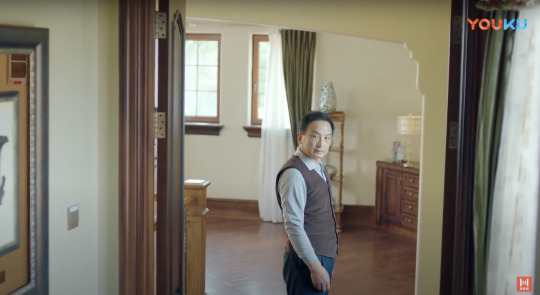
Back at the university, Shen Wei is having a morning tea with his dean. He holding his teacup with almost god-like elegance, very close to actually covering his mouth when he drinks, which is extremely old-fashioned. This is in stark contrast with him brazenly and un-gentlemanly showing his ankles.
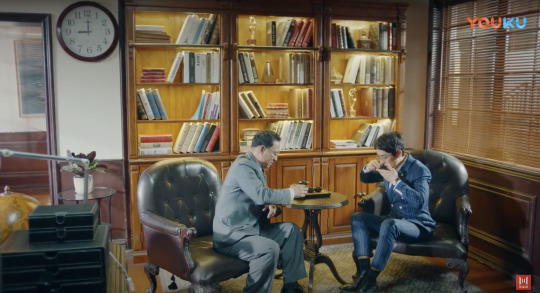
Shen Wei is asked to move off campus, because, apparently, having a chief of the special task force showing up at your office is bad for the reputation. Since the professor does not look surprised, and states that he has already found a flat, I’m guessing that he was clever enough to have predicted this turn of events, and used it to secure the place a breath away from Zhao Yunlan. It is up to speculation as to when he started scouting for an apartment: it could not have been more than a few weeks since he met Zhao Yunlan, and finding a flat can take a while.
At the SID office, we are treated to a lovely moment between the team members, crowding around Lin Jin’s new invention: a popcorn-specific microwave.
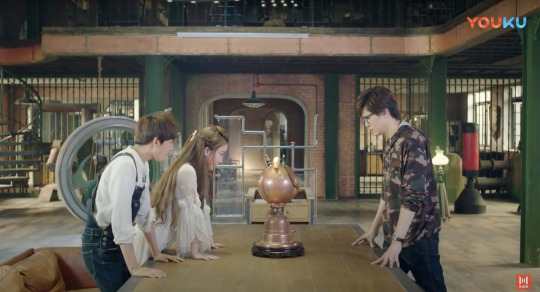
It’s very sweet to see the team indulge in some nonsense outside of their case work, made even better by Wang Zheng being there. The fact that Zhao Yunlan is on board with his department’s time and resources being spent on a popcorn maker only makes this scene better. He is crouching on the table, because chairs are for the weak.
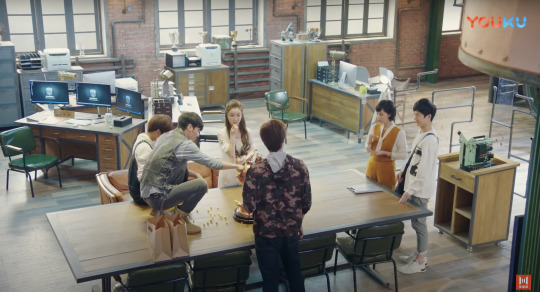
After inspecting the crime scene, Zhao Yunlan is spending some time outside chatting to Buttler Wu, and comments on Li Jiaqi’s good looks, since Zhao Yunlan is a man who can appreciate beauty.
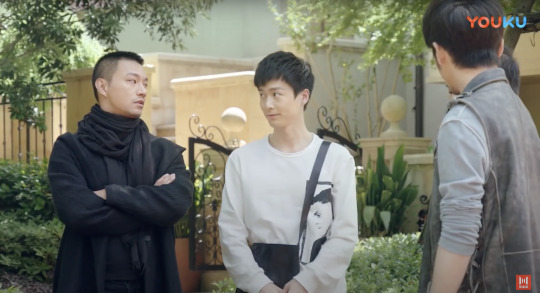
As Xiao Guo is awe-struck at his boss’ ability to note someone’s prettiness from a distance, Chu Shuzhi literally rolls his eyes calling those “instincts of a beast”, and Zhao Yunlan fails to reprimand him for the remark, because… fair enough. Very fair enough. It’s hard not to relate to Zhao Yunlan, a self-admitted bi disaster.
Shen Wei is being shown his new apartment. He does not even look around it, staring instead at Zhao Yunlan’s front door across the hall from him.
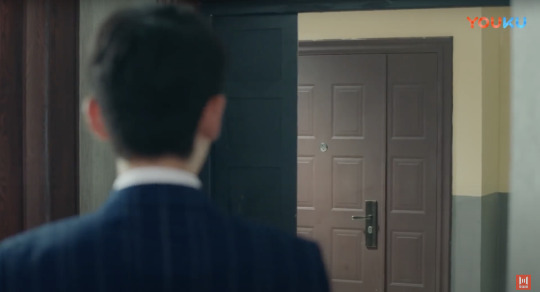
Moving here is a completely senseless thing to do. How on earth is he planning to hide his Hei Pao Shi persona while being a next door neighbour to the chief of SID? My conclusion is that from a character stand-point, it’s nothing but an act of desperate devotion; from a narrative stand-point, this codifies that their relationship is about to get very intimate indeed.
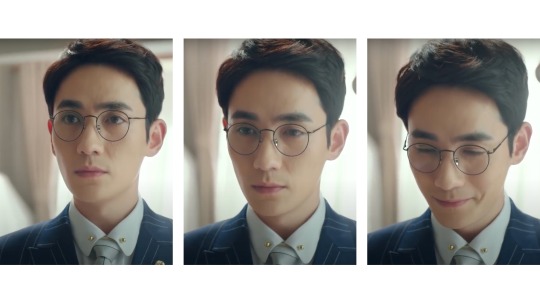
The SID members are interrogating Buttler Wu: as is often the case, instead of bringing him in, like they did with Shen Wei, they hijack a cafe nearby to have a more relaxed conversation. As they talk, Shen Wei is making his way past the cafe, which both Wu Tian'en and Shen Wei notice.

Shen Wei proceed to follow Butler Wu, who calls him out on it. This leads to a removal of his glasses so epic it warrants a jump-cut to close-up, on top of the dutch angle used mere seconds prior to it.

Instantly recognizing Shen Wei as Hei Pao Shi, Wu Tian’en sinks to his knees in reverence. Again, fair enough. After having a brief conversation about their shared history, Shen Wei states that Butler Wu is not allowed to lay a hand on Zhao Yunlan.
“Chief Zhao? You’re stalking him?”
“You don’t need to know more.”
That is not a no. Mostly because that is a yes.

Shen Wei promises to not take Wu Tian’en away before the man resolves his current problems, adding that he hopes his old acquaintance won’t have any regrets when that happens. As Shen Wei walks away, he muses “Then how much time is there left for me?”
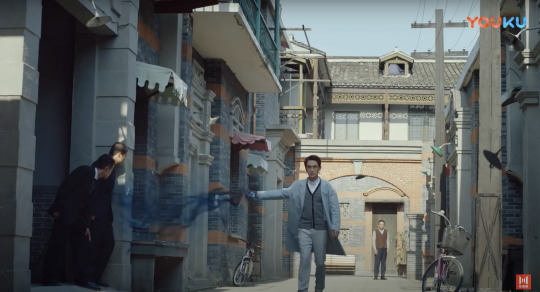
(And I have to fight an uncomfortable sinking feeling in my stomach, which is occurring a lot as I rewatch those series.)
The same evening at the SID offices the team is struggling with the case so much Da Qing suggests asking Hei Pao Shi’s help. Zhao Yunlan bristles at the idea, and… calls Shen Wei instead. Of course he does.

To be fair, he does so to check whether the other man is stalking him, but he also calls him by his given name rather Professor Shen, reinforcing that he makes this enquiry as a friend, not at as the chief of the Special Investigations Department.
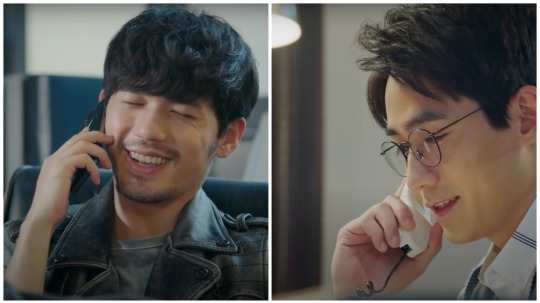
During the phone call Shen Wei is absentmindedly playing with the corner of the publication he is reading.

While Yunlan does not deny that he still thinks Shen Wei is potentially up to something dodgy, he still proceeds to ask his advice on the case. This continues the dynamic from the previous episode: it’s not that Yunlan is completely blind, it’s just that he trusts Shen Wei regardless of the secrets he might be hiding.
Moving on, here’s what I have to say on he topic of bad CGI. There are several reasons in the world for a piece of visual media to have a poor quality computer animation. It could be laziness, or it could be absence of imagination, both of which are inexcusable. It also could be absence of funds, as is the case with the Guardian. And, honestly, I am alright with that. It’s not their fault, and I would much rather see this drama as it is - bad CGI and all - than none at all.

And, the quality of CGI here has energy similar to Live Action Sailor Moon (PGSM), which I honestly find both nostalgic and endearing.
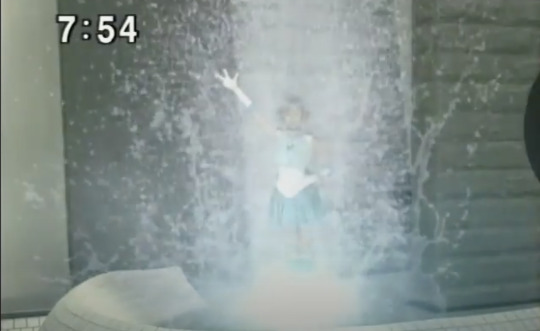
That show also has a talking cat, but it’s performed by a literal plush toy on strings, so Guardian certainly wins here.
While Huang Linqi and Li Jiaqi are being kept together (possibly in an alternate dimension, seeing as how they have emerged from the lake completely dry), they talk through their relationship issues, and the audience finds itself with a sugar-sweet take on the arranged marriage/strangers to lovers trope. I feel a little bit bad about their disaster wedding now.
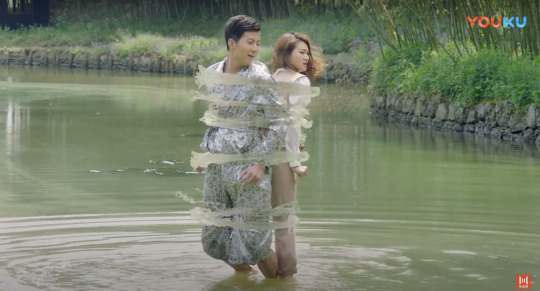
At the same time, Xiao Jun and Wu Tian’en’s story is a tiny echo of Shen Wei end Je Zun: the son thinks his dad left him to fend for himself when he was young and vulnerable, and distrusts the very concept of love because of that perceived abandonment. Unlike Je Zun however, he stops to have an actual conversation, which ultimately forces him to quit his senseless act of revenge, and make the first step on the path of reconciliation and redemption. This is Guardian telling us that communication skills do, in fact, matter.
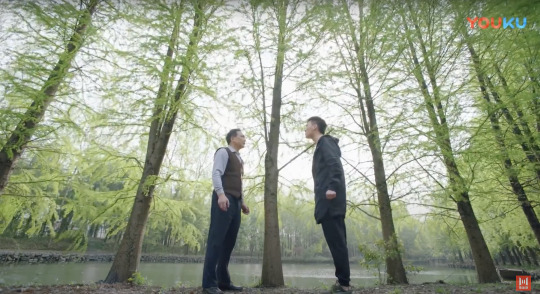
He also drops this bombshell of a line, which hurts my heart a lot.
“In the face of death every love in the world is mere foam”
On an entirely separate note, I am very glad that the actor who plays Butler Wu is wearing nice thick knee pads.
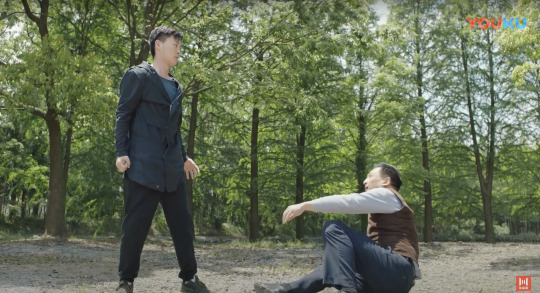
They are very visible, and they make a little “boing” when he hits the ground, but the actor has to fall to his knees twice in this episode, both times on hard surfaces, one of which is literal gravel, and I’m happy that the production is being considerate of their actors’ physical well-being.
While this episode does not mark the first time Zhao Yunlan is being understanding to the Undergrounders in pain, this is the first time anti-Unvergrounder bigotry is explicitly framed in a negative light. The two evil businessmen, who cast a child aside just because he has special powers, are shown as unquestionably in the wrong. Xiao Jun is lightly scolded for his rash actions, but he is not brought back to SID in cuffs, and he is not immediately given away to Hei Pao Shi. Far from that: he is brought in softly, to spend some time at his dying father’s side.
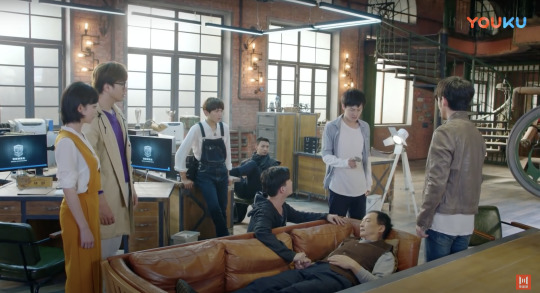
As Butler Wu slipping away, we once more see Guo Changcheng being recklessly heroic, as he is prepared to use the Longevity Dial to share his life force. Instead of letting him do it, Zhao Yunlan snatches the Hallow away and decides to perform this particular miracle himself. This is the same man who will later sacrifice his eyesight to bring people’s lives back. Bai Yu’s acting in that moment is utterly phenomenal, showing a whole range of emotion from horror to determination to dismay in mere seconds.

Hei Pao Shi teleports in, and, without a preamble, scolds Zhao Yunlan (the first episode in the series-long “don’t touch the Hallows” saga), and then asks him whether it’s worth shortening his life for an Undergrounder. This is in equal parts a provocation and a test, because I’m fairly certain that Shen Wei was going to save Wu Tian’en anyway.
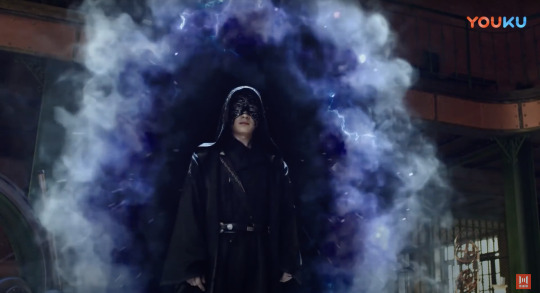
As SID members beg Hei Pao Shi to save Butler Wu in perfect unison, Zhao Yunlan states that a person is a person, regardless of their origin. Shen Wei notes inwardly that SID had changed, and, as expected, heals Butler Wu, while Yunlan stares at his power with relief and awe.
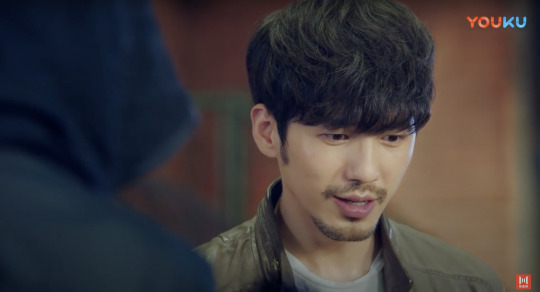
Since I have talked about the wide shot of the Dragon City, let’s talk about its counterpart in the Underworld.

I have failed to notice before that there appears to be a vast city next to the volcano river, some way away from the royal Palace, looming over it. Geographically, this makes little sense: we will see characters leave the Palace and instantly end up in a city square throughout the series, but I still really enjoy this wide shot. It is also interesting to see the architecture of the place. It is somewhere between (western) medieval abodes and futuristic shipment container blocks, with living spaces built on top of each other, crammed-in, and unpleasant. I also love the lighting here, contrasting blue and red.
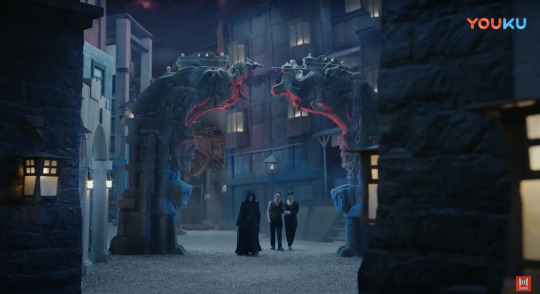
Hallows random power #n: projecting their brethren. Imagine how useful it would be if they also did that for the Brush and the Lantern.
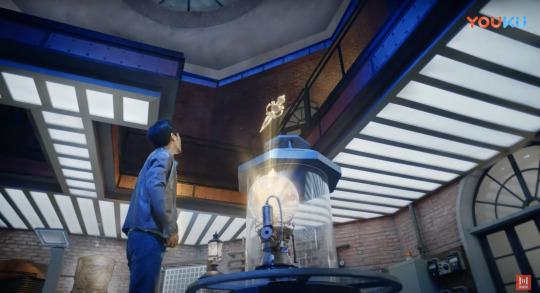
The next day, Zhao Yunlan and Da Qing are on a leisurely morning jog, while Yunlan is wearing bottoms that my partner refers to as “sheggings” (as in, shorts + leggings)

They are talking about Shen Wei, naturally. In my head-canon, Zhao Yunlan is driving his colleagues nuts because can’t help himself but bring the good professor up every goddamn minute of every goddamn day.

As they turn the corner to go home, they bump into the subject of discussion, who informs them that he moved into the building, and leaves abruptly looking more than slightly pleased with himself.
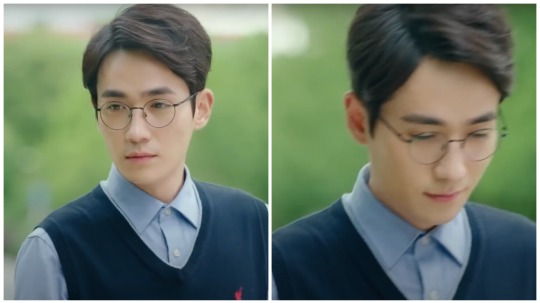
Finally, we are treated to Guo Changcheng’s surveillance exam. I don’t know why he thought this outfit would make him look less conspicuous.

Eventually, the SID will learn that some of their staff members don’t have to be fighters or detectives. In Xiao Guo, they have found the heart of their team, and that is enough.
Next up, Episode 6: The Coat Zhao Yunlan Will Buy
—
PS: I have mentioned earlier, that I have a sinking feeling as I watch Guardian, and I would like to elaborate on that. You see, I am very scared of flying. It’s an irrational fear, but it is the one I nonetheless have. There is a very specific feeling I get just as the plane starts gaining speed on the runway: there is joy, because at the end of this journey they is something to look forward to (my parents’ hugs, a drink with a friend, a favourite place, a new city to explore), but there is also a painful anticipation, as I brace for the moment the aircraft will tilt upwards, knowing that I will be pushed back into my chair by gravity, battling against an onslaught of a panic attack, shaking, learning to breathe, fighting with everything I have to keep my heart rate down. Watching Guardian from the beginning, knowing where the story is going, mirrors that feeling perfectly.
PPS: The following conversation happened with my partner as I way typing this recap.
My partner: Do you think Shen Wei ever wears sheggings?
Me: Sweetie, I think he would rather die.
45 notes
·
View notes
Text
YOUR CHARACTER IN FIVE QUOTES!
( repost, do not reblog. ) Tell us your favorite quotes from your character. Give us an idea of who they are by five things they’ve said.
━━━━━━━━━━━━━━━━━━━━━━
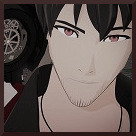
Alright, buckle up, I’m stealing this meme and repurposing it for my own use. Probably more than five, and including some quotes from others about him, though I’m going to try to keep it in groupings, and also not meant to be exhaustive of qrow’s character, but rather, to point out some very poignant lines that have effected my portrayal and... some possibly in an unpopular way compared to what I’ve seen in the fandom? I think Qrow Branwen is more complex than fitting the broody broken boi trope would give credit for (though he at least fits it as an overall stereotype).
━━━━━━━━━━━━━━━━━━━━━━
1) I’m absolutely sure Qrow had a rough start and transition from the tribe to ‘civilized society’, coupled with typical teenage hormones and mood swings, but generally, Beacon was a good time, and he sees himself as a good huntsman, and (though we may joke about it sometimes) he absolutely does not have an active nor passive death wish.
Yeah, yeah, I know he has a song all about how he self depreciates and carries shame, but that’s a theme of his attitude, not backed up to be every single aspect of his life by actual canon. Quite the contrary.
I don’t know where fndm gets the idea that he constantly lost his battles (especially to Raven) or was perpetually looked down on or stayed an angsty, broody teenager (who could never possibly have ever even breathed a single happy breath on his own without Summer??) all four years. As if school was hell and he never came into his own until STRQ was a graduated unit or something? If ever?
Leo tells Raven she and her brother are evenly matched. Raven herself - who takes pride in being stronger and more clever than others - describes them as a pair: “we were good.”
“you're talking to a member of the coolest team that graduated Beacon! ...we were pretty well known back in the day. ...hey, we looked good! and I have a number of inappropriate stories to back that up!”
“let me tell ya, these kids are way better than we were at their age. ...well, not better than me, specifically...”
“a professional huntsman like myself is expected to get results as soon as possible.”
The way Qrow talks about his past, as well as carrying a memento of team STRQ around with him, it’s very nostalgic for better times. The way he talks about his work, if not himself, can actually be to the point of being self-aggrandizing, instead of depreciating. He’s even able to admit that his dreaded semblance, Misfortune, “comes in handy in a fight.”
“lots of us thought you were just layin' low. eventually, we just came to accept that you were probably dead. but the stories about you, i based my weapon off of yours. i wanted to be as good as the Grimm Reaper.”
Qrow talks about himself as striving to be better. It seems he never really sees himself as reaching that standard, but it certainly implies he knows he’s not at the bottom - he had an ideal he wanted to reach and likely worked towards. Notice the use of “us” and “we” as well - he talks about himself as part of a group of larger huntsfolk circles. Who knows if this refers to students or licensed professionals or both, but this heavily, heavily implies that he was more than just a sad, outside loner, at least for a time; he chatted with others and traded stories about goings-on and missions and idols.
Somewhat related and leading into...
━━━━━━━━━━━━━━━━━━━━━━
2) At least around this blog, Qrow does not have an inferiority complex because of Raven.
Does he have some internalized shame about being soft that he can’t quite shake? A few insecurities about being unwanted compared to her natural leadership and competence? Yes. Does he consciously view himself as lesser than her? No.
Also... he’s not co-dependent on her. To a degree, for while? Yeah, there was probably an unhealthy reliance going on there. But Qrow and Raven establish themselves with their own identities at some point, they’d have to, to chose different paths so stubbornly. There’s a rift there, eventually, if not always having been at odds in some ways and comfort in others.
“Raven's got an interesting way of looking at the world that I don't particularly agree with. [The weak die, the strong live. Those are the rules.]”
“...they were killers and thieves.”
We are shown that the twins were raised with this weak/strong dichotomy. Raven bought into it, but Qrow explicitly separates himself from that belief. Shown again when he mocks Raven with, “because that was your rule, right?”
He believes in true family, he believes in protecting the weak, he believes in doing good, he believes in standing up for what’s right. He may not like being emotionally vulnerable, but he shows softness and kindness to others, and for as much as he likes his flourish when fighting, he also isn’t afraid to look an absolute fool either.
He is shown de-escalating conflict time and again, even if he also falls back into violent, defensive patterns at times, too. He resents Raven for the choices she made, and as far as I interpret, thinks she’s the lesser one for running away and abandoning her family and her mission. (Meanwhile, she thinks the same of him for turning his back on the tribe.)
He all but spits on the tribe’s way of life, is willing to attack them outright to get the Spring Maiden. Why would he judge himself by those standards any longer? No, he lives by his own code, a huntsman’s code, and even has some pride in that. It’s why he can call Clover out on it. It’s why he folds when Robyn holds him to it.
It’s why it hurts when he finds out what gave him more meaning, aligned more with his own heart, than the tribe’s dogma may not actually have any purpose at all...
━━━━━━━━━━━━━━━━━━━━━━
3) There’s so much to unpack here:
“No one wanted me... I was cursed... I gave my life to you because you gave me a place in this world... I thought I was finally doing some good... Meeting you... was the worst luck of my life...”
No one wanted him? I believe this means the tribe, maybe even Raven, maybe trying to make friends, but no one until Oz? Does this include STRQ? I have trouble reconciling that one with everything else we’re shown. I still maintain he was part of bigger circles, but we get confirmation that these were probably fleeting or superficial. He knew people and was known, but no one stuck around. Also more confirmation of his values. Gave me a place sounds like so much more than refocusing to me. It’s not gave me a direction, not told me what to do, it’s took who i am and gave that person a place to thrive - despite the bad that comes with - to work towards something better. Just like he always wanted.
But then he backtracks. What is it he regrets? We do know how he likes to go into dramatic hyperbole about these things when he’s upset. [eg. “we’re not family anymore.” “i shouldn’t have come. i shouldn’t have let any of you come.” “we can kill the man who put us here.” “gone. like everybody else.”] (I love that crwby lets their characters do it. we all say things we don’t mean in the moment, give voice to those intrusive thoughts.)
I’ve talked before about how I picture him having flashes of all the lives he could have had instead. Would he have gone back with Raven and at least still had her? Would he just have been a normal huntsman defending people from Grimm without the crushing extra knowledge? Might he have been able to have a relationship or family of his own had he not signed up for the vagabond spy life? Does he just resent losing Summer and Raven because of how things went down? We don’t know, and I think the point is that he probably doesn’t either, but the weight of sacrificing all those alternatives and putting so much faith in Ozpin, stacking so much of his life’s work and identity on being part of the inner circle, comes crashing down on him all at once.
also quite fitting...
━━━━━━━━━━━━━━━━━━━━━━
4) "Nice place to raise a family. ...If you're ...into that sort of thing."
This is from his World of Remnant narration, talking about Patch, but it hits so damn hard. The softness and warmth in the first half of the statement, followed by the harsh need to qualify it in regards to his own outlook... We learn all we need to know about his opinion of the subject.
We see the conflict right there - the possibility of such a thing brings a wholesome lilt to his voice, yet he implies that it’s not something he personally intends to pursue. Is that because he doesn’t want it or because he thinks he can’t or shouldn’t have it? I don’t think that’s clear, and he may not know either.
At the very least, I fall into the camp of him believing he doesn’t want it. Combine that with the fact that he does pick up that spy life, which makes keeping his distance a necessity, and makes settling down near impossible, and then he definitely knows it’s not in the cards for him.
So I think it ultimately falls somewhere between. Why would he make the commitment to being a lone spy if he had dreams of love and a family? ...But then why would he resent making the sacrifice of that possibility later if he didn’t?
Having his nieces around probably softened him up to the idea, but he’d already made his decision by that point. He’s also solid and generally happy with his choices at the point it would most matter. He’s married to his job. He’s fulfilling his missions well, in well-suited ways for his strengths and flaws. He has his nieces around as a balm on any sort of biological clock. He has his purpose with Oz. Until he doesn’t.
This is an incredibly long-winded way of restating that one of the headcanon hills I do stand to die on is: Gray-romantic Qrow.
━━━━━━━━━━━━━━━━━━━━━━
5) “some people are just born unlucky... my semblance isn't like most - it's not exactly something i... do.”
I am constantly confused by the amount of people trying to do character analysis around Misfortune and Qrow based on standard semblance lore, when he has yet again stated explicitly to the contrary. We all have carte blanche ya’ll. We can do whatever we want with this, because he’s already told us his semblance breaks the rules.
My full headcanon for it is here and my opinion about the direction I hope it takes is here but tl;dr
Unless we learn otherwise, there are very, very few ways I believe Misfortune is a reflection of Qrow’s soul, if at all. This is from the first headcanon, but it’s worth restating, because it’s important to me, aaand fits the theme of pulling in some quotes from other characters:
Everyone likes to quote Ren and his description of someone’s personality being incorporated into a semblance. I don’t buy it for qrow. Here’s the FULL quote: “A common philosophy is that a warrior’s Semblance is a part of who they are. Some say your personality and character can define your Semblance while some claim that it is the other way around. Of course, there are still many who don’t see a connection at all.”
So unless we find out otherwise I will also die on the hill that qrow is an example of the middle part. Qrow’s personality/soul has nothing to do with why his semblance is what it is, but being forced to grow up and live with Misfortune has defined him tremendously.
OKAY, there are some smaller quick ones, but I’ll stick to my five points like I promised at least, and maybe do a lesser version some other time. :]
#qrow branwen#* legends and stories; some of them true; some made up = meta *#* hey don't get mad cause i'm right = headcanon *#long post tw
26 notes
·
View notes
Note
Hi you have a great understanding of Sasuke's character and awesome blog. Could I ask you for tips on how to write Sasuke right in fanfiction? When I try I never seem to get him right
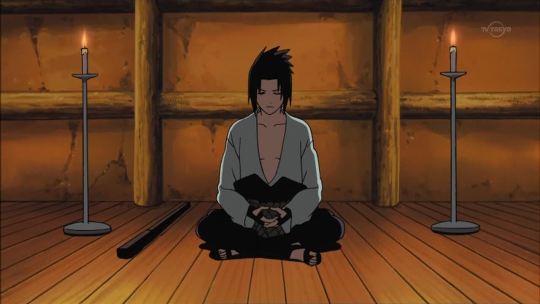
Hello and thanks Anon. First of all, y’all don’t get offended if I’ll destroy some of your fave tropes in fics...I don’t judge ppl writing what they want in their fics, it’s their own fic so ofc they write what they want and how they want it and if they have fun with gay-uncle-Izuna, CEOItachi and sluttySasuke good for them...but when ppl impose their OOC Sasuke (or Nar or Itachi&co) as the real thing, and boy if they do....well. Nope.
Anyway I replied to similar asks here, here and here, so I’ll copy-paste some parts. My Sasuke tag. More Sasuke meta. More headcanons. More essays tag.
Sasuke is not dominant. He’s not bossy. He’s not assertive. He’s very passive in relationships and he values individual freedom, his own and other people’s. Ppl mistake his determination in pursuing his goals with assertiveness but it’s a totally different thing. He never makes the first move with ppl, unless he has a goal and he needs them, and even when he needs them, like Taka, he never imposes his will on them. He first freed them then he asked their help for his own goal, saying that he would accept if they refused. He never imposed himself on his brother (a child wanting his big brother’s attention is not being dominant, it’s natural) and he never did it on Nar or anyone else.
Sasuke is not selfish, he is the most selfless character in the whole series. He respected people, he didn’t see himself above them. He didn’t see himself as a genius or anything. He worked hard because he had a low self esteem, he was always compared to Itachi and he always lost. He was humble enough to ask others’ help, like asking N*ruto how S*kura was able to climb the tree with chakra in the beginning, or asking Team Taka’s help to find Itachi, asking Kakashi to make him stronger and following Orochimaru for more strength. And during all these, he was thrown in his face parts of the tragic truth about Itachi and his clan and he always had to get back on his feet and fight more. His world crumbled so many times on him and yet not only he reacted but he always was able to help those around him. Not with big words like N*ruto but really, freeing Orochimaru’s prisoners, Taka, and earlier protecting his team from Gaara, protecting N*ruto from Haku, and later proitecting N*ruto from Kaguya and then protecting the whole world from her, protecting Itachi’s ideal, his sacrifice from those who threatened to make it useless. He was ready to become the world’s only enemy to keep them together, following what he thought Itachi had taught him indirectly.
Sasuke is neither possessive nor jealous. He never showed any sign of possessiveness or jealousy towards anyone. He protected Taka and N*ruto. He defended Itachi’s name, unlike too many like to think: when he threatens Danzo to stop talking about Itachi it’s not because he’s jealous but because he doesn’t want that bastard to talk shit about his perfect brother, especially cause that bastard was the reason of his ruin. He was defending his name from an enemy and it was pure and selfless, not possessive at all! Proof of this is when Hashirama praises him instead, Sasuke is happy. He likes people to speak about his brother in a good way! When they were children Itachi always dismissed Sasuke who pouted but never got really angry or jealous at Shisui for example. And at the end of the fight vs Kabuto he aknowledged Itachi’s resolve to leave even tho it broke his heart to lose him again, and he let Itachi go with the saddest face but the utmost respect.
Sasuke is not arrogant. He has a low self-esteem. He was raised in the shadow of his genius brother, he suffered for his father not noticing him, he later developed an inferiority complex towards N*ruto as well because of his quick progress, compared to his own that he perceived as slower and not enough (that’s why he joined Orochimaru). When he brags it’s not because he’s the bragging type (aka N*ruto, Kiba &co) but it’s because he’s either making fun of N*ruto, since they were rivals/friends (not to mention it’s a shounen trope) and, even more so, because he is proud of his achievements. He worked so hard always and when he created a jutsu or smth he says it. Because he has low self esteem but he’s not socially awkward or shy or whatever (see later paragraph). So he is proud of his own results. (which is also a very TE thing, for those who care about mbti stuff).
Sasuke doesn’t value his life much. This is a result of his low self-esteem, which leads to poor sense of self-preservation (to prove that he’s strong, like when he was a genin and he trained so hard,and later to pursue his goals, for which he’d give his body to Orochimaru and his life over and over). Also he is so determined to achieve his goals that he’d do anything for them. He was ready to die on many occasions in canon for this and even later, after the ending, he’s seeing himself as a tool. Also, he never really got over the sense of worthlessness first caused by his father and then by Itachi’s words the night of the massacre. Not in a real life trauma-like thing, but as a way to see himself. this means that all those stereotypical rocking back and forth, cutting, whatever behaviors are not like him, who always got back to his feet and lived, although not for himself but for his goals.
Sasuke is not bitchy or spoiled. If he was he would have a great self esteem, and he clearly showed to have a very low self esteem instead. He never made anything about him actually, as all his goals were about others, his family, his brother, and so on. He was the one who did better teamwork in team7 actually, and he protected his friends and comrades, not to mention he freed Orochimaru’s prisoners and fought for the village and its people. How is this spoiled or bitchy, and btw, bitchy ppl do get offended and he never paid attention to offenses towards him, only towards his brother.
Sasuke is neither the haughty élite type nor the shy/socially anxious/‘emo’ type. He is neither Neji nor H*nata. He is aloof, he is always lost in his own thoughts and he doesn’t care about socializing because he wants to become strong, because he cared more about his family and goals, because he cared more about their opinion than the opinion of classmates. He valued strength since the beginning, being raised the way he was raised, so he valued the praise of strong people and not of the others, unlike those who seek praise from everyone. On the other hand his being aloof doesn’t mean he can’t have normal interactions, and the fact that he doesn’t use honorifics doesn’t mean he has socialization problems. Only that he doesn’t pay attention to these things anymore. He was always pragmatic, and after the massacre he became pragmatic to an extreme level, cutting off all unnecessary things, manners included. It doesn’t mean, though, that he doesn’t respect some people (=those he deems strong. Including Team Taka). He just shows it through actions.
Sasuke is not se/xually aggressive/dominant/whatever. He is too busy with his own goals to have se/xual or romantic thoughts (unlike other characters both male and female, not just Karin but also S*kura, Ino, and ofc N*ruto). I wouldn’t define this being asexual tho, because their universe is not ours and I’m sick&tired of all the real world/Nar universe parallels. He’s passive in relationship and on many occasions he showed indifference to se/xual anything, not disgust. Just, it wasn’t his thought. Because he is on a different wavelength. So even when he told characters to not be so close to him or smth, he didn’t move away, he just told them, which kinda proves my point once more of how passive he is towards ppl and relationships, he just lets them be. On the other hand, aceSas is better than hornydominantSas that is so OOC it hurts, be it with Itachi, Nar, S*kura or whatever other girls/boys.
Most MAIN characters didn’t understand/didn’t try to understand him. The ones who understood him more are unexpectedly not his friends. Not counting Taka ofc.
Sasuke is passive. He is the yin and N*ruto is the yang. In case this isn’t clear. It’s canon. Kishi used a yin/yang parallel for him and N*ruto, so while N*ruto is yang/sun/warm/ positive/active/male principle in nature/masculine, Sasuke is yin/moon/cold/negative/passive/passive/female principle in nature/feminine. Passive doesn’t mean weak. It means receptive, adaptable, flexible, which Sasuke is, since he’s the one who adapted his life and goals to new events, truths and changes, unlike most others who just kept going their own way no matter what (see N*ruto or Itachi). Many see him as assertive because he faces every situation in a very determined manner, taking actions and deciding everything independently. But being an independent thinker has nothing to do with being assertive or passive. I say he’s passive because he actually always reacts to what life (or Itachi) throws at him, every time. His reactions are quick and strategic, so it’s easy to miss this, but still, again, Itachi or N*ruto actively engage the environment and life, and influence other people, not Sasuke. He’s also passive with people, in relatioships. He never seeks anyone unless it’s for practical reasons, he only reacts to them approaching him. And he reacts in a very calm way, quite mild compared to how determined and detached he is, considering that a lot of characters invade his personal space or more, in the whole series. When he chases after Itachi it’s because he’s his younger brother and it’s natural for them, and mostly because Itachi set up his life so that he would focus on him, still it’s Itachi who is assertive, and he reacts in return. He makes a deal with Orochimaru, to obtain strength and give him his body in return. When he forms Team Taka, before asking their help, he first gives them freedom and only then he asks them to join him, making it clear that he won’t force them if they’ll refuse. He gives them something before asking something in return. This is not just a passive thing but something more because he is not selfish, like I said before.
Sasuke is an independent thinker. Unlike other smart thinkers like Itachi or Madara, to whom the story associated him, Sasuke was kept in the dark about many things, so he developed his own view of the world later, but when he did it was original and unique, just like his fighting style and strategy.
Sasuke is private about his thoughts and feelings but he’s also honest about them. Itachi is mysterious and not honest about his feelings, not him. He is aloof, it’s different. Just because he doesn’t trust many people and he’s lost in his own thoughts it doesn’t mean he is a shoujo mysterious character lol.
Sasuke is goal oriented. He does whatever it takes to achieve his goals. He would have given his body as a vessel for Orochimaru, not caring about what would happen to him, as long as he could have his revenge. He would have lived an eternity in solitude so that the world would have lived in peace. And, again, his goals are never about himself.
Sasuke wanted to die after he killed Itachi, but then when he woke up and was told the truth he had another purpose, and so he lived on.
Sasuke admires and respects strength but he’s not power thirsty. He wanted to become strong because he wanted to be worthy of Itachi and his father, than because he had to avenge his clan, then he had to avenge Itachi. It’s because he had low self-esteem and was selfless that he sought power. He wanted to be beside his father and brother, not to surpass them, actually. It’s Itachi who talked about surpassing.
Sasuke is very smart and logical, but he is easily manipulated with the right arguments. Like using Itachi, or appealing to his low self esteem, his feeling of worthlessness, his emotions. Because people who are logical are actually not emotionless. In fact they have a hard time controlling their emotions when they feel strongly, and this can be seen clearly every time Sasuke loses control. He becomes more impulsive than N*ruto who instead gets calmer, because he’s more in touch with his emotions (lol ofc he is, everything is always about his own emotions and feelings). Sasuke puts his feelings and emotions aside to reach his goals, he acts logically and pragmatically, he observes, makes plans, finds the better ways to do things, no matter how hard or dangerous for him they are. He has logical arguments even though they appear ‘crazy’ to other characters, and it’s sad to see how in the end he was belittled by N*ruto, as if his arguments were meaningless, they were not addressed at all, just deemed wrong, not with counterarguments but with illogical emotion based words that just made him feel unstable, as it happens when you have logical arguments and they tell you ‘you’re just depressed, you don’t get things right’.
In the end, he was tamed into submission. He was defeated, put in jail, isolated, guilt tripped and berated because of his ideals and goals, denied the justice he rightfully demanded.
All these can be observed directly. Others, more subtle things about him I wrote here, towards the end of this long post.
#sasuke#I don’t have much motivation to reply to asks tbh but this is important I guess#Anonymous#vivalarevolution: visions#vivalarevolution#vivalarevolution: not crazy but desperate
136 notes
·
View notes
Text
“The 02 characters didn’t get any character development”
Yes, they did.
“But -- “
Yes, they did.
Having had the gift of having rewatched 02 recently, I have to say that it still really, really confuses me how the hell people get this impression. It’s not even “I’m trying to see the best out of this” but that I genuinely do not get it, because as far as I’m able to see it’s pretty much literally right there!! This isn’t even tinfoil hat tier!
But in case you have any doubts, sit down because Shiha’s gonna sit here and write a meta about the 02 kids, and how they are perfectly reasonable characters that developed properly fine over the course of the series.
(All below translations of 02 dialogue are by PositronCannon.)
So the first thing to understand about 02 is that it is fundamentally made with a very different writing approach from Adventure in the first place, and therefore it is not meant to be compared in a one-to-one fashion.
This is a point I’ve said many times over and over, and I think it’s to the point where it shouldn’t even really need official clarification, but I’m just going to go ahead and bring up the words from Director Kakudou himself:
For instance, we had the prior series stick out in terms of its points about “what it means to be oneself”, and for 02 we made it so that you would pay attention to “the relationship between yourself and other people”.
Right, so: 02, by design, does not use Adventure’s character development methodology of “self-awareness”. It is built from the ground up by having its characters and character development predicated on relationships instead of singular characters. This might seem a bit odd on its face, but no man is an island, and, in fact, changing the way you interact with other people and with the world in general does speak a lot about one’s personal growth in its own way. And this also means that if you try to analyze 02 by holding it to Adventure-based standards of “character focus episodes” or the like, you’re already on a losing battle.
This means that character growth in 02 is not presented in a way where it’s up-front and center, but rather something you have to glean over the natural course of the series. We’re working off relationships, so you have to actually pay attention to the natural interactions between the characters or what they say even during “off-hours” -- the focus-episode format used by Adventure doesn’t apply here anymore. And it’s something apparent enough from how “evolution” is a metaphor for “personal growth” in this franchise -- in Adventure it was via the Crests, which meant self-awareness, but 02′s key evolutionary trump card is Jogress, which relies on the strength of relationships.
One thing I have to say in terms of my experience as a 02 fan is that I’ve found I actually appreciated it significantly more as an adult than I did as a kid, and that, in general, a lot of the things to appreciate about 02 are things that you really viscerally feel and understand when you’ve gotten that degree of life experience under your belt. Unfortunately, this is kind of a double-edged sword, too, because it ends up becoming the kind of series that often risks going over the heads of the very audience of children it was supposed to be targeting. It’s got a lot of very nuanced depictions of mental health and the childhood experience that are maddeningly subtle, to the point of possibly going over one’s head or even coming off as illogical without sufficient life experience, or simply just not being as visceral (the entire theme of “parents stroking their own ego with their kids’ achievements” hits the hardest when you’re college age).
So what this means is that 02 doesn’t exactly hand its themes or character development to you on a plate. But it is there, once you actually start looking for it.
Let’s start off by talking about our main core cast of characters. Adventure and 02 prided themselves on the fact that they tried very hard to not be adherent to anime tropes, but rather to portray well-rounded, nuanced characters that felt more like actual kids you might meet at school. So how does the 02 cast fare in not being pigeonholed anime tropes?
Daisuke: Even though official freely admits he has “the most anime-like personality”, it’s hard to say he actually falls that much into the generic shounen archetype. For one, he’s actually shockingly humble and polite in certain situations (he’s consistently polite with his elders, and is very quick to admit his own limitations). Actually, he comes off as a surprisingly friendly and deferential person -- it’s just that he happens to have somewhat of an abrasive exterior, and even then it’s implied heavily in the first half that this stems from a lack of validation and purpose. (He actually “deflates” really easily, so you can’t even say he’s all that arrogant past the surface.) Certainly he’s simple-minded, and kind of an idiot, but his abrasive exterior is actually pretty deceptive.
Miyako: Miyako floats an interesting duality of simultaneously being aggressively feminine and being aggressively un-feminine -- not necessarily in the sense she tries not to be feminine (on the contrary, she absolutely embraces it), but more that she’s also an aggressive, “inelegant” mess in ways atypical for a lead heroine in a shounen show, who are usually either cute or “badass action girls” and not...a mess. Despite that, she is also consistently portrayed as capable of heavy emotional depth and being very genuinely kind and concerned about others, which are not in any way diminished by the fact she happens to be an aggressive mess with a severe case of foot-in-mouth syndrome. It’s an interesting mix of character traits that you don’t see often.
Iori: “Designated young characters” usually fall into the “cute” archetype a la Adventure!Takeru or Tomoki, so it’s interesting that the youngest one is actually the most mature one, and impeccably polite at that (having been raised by a family that emphasizes formal manners and propriety). Even more interestingly, nobody actually treats him like he’s that much younger, and he’s given the weight of respect in a sense that has nothing to do with his age (think about how there are indeed quite a few kids who simply just get along better with older kids). Yet the series doesn’t shy away from his youth, and his overly black-and-white view of morality is portrayed as immaturity in its own way, along with the occasional “slips” in his facade or manners indicating that it’s still something he has to consciously focus on.
Ken: Ken’s development goes without saying (it’s one of the most consistently praised aspects of 02), but it’s also interesting to note the unusual way the series plays his redemption arc. Instead of making him a typical “jerkass anti-hero who learns to get a bit better”, the series completely blindsides you by revealing that Ken is, in fact, a naturally soft-hearted and kind boy, and then plays up the mystery of the severe kinds of trauma that would lead him down that path. And ultimately, even though the cause is revealed to have supernatural influence, the series also makes it clear that it doesn’t matter -- that, whether it was his conscious “fault” or not, he still is responsible for what he did. And on top of that, it also scorns the usual “redemption by sacrifice” mentality by pointing out that it’s a cop-out -- it doesn’t actually solve the problems that were caused, and, in fact, a much better way to make up for things is to fix them going forward.
Takeru: Takeru had the “designated young character” role in Adventure, and it turns out that once one of those gets a few years older, they’re naturally not going to be nearly as pure and innocent! The “sweet child” from Adventure has now grown into having slightly pettier emotions, even to the point of grudge, and things he won’t let go of. Oh, and also, trauma from three years prior is still going to have impact on an eleven-year-old kid. Who would have thought.
Hikari: Adventure’s most infamously inscrutable character also seems to have gained some individualized, not-quite-innocent traits of her own (observe how she deals with Daisuke’s advances), and, moreover, it turns out that her deferential humility and refusal to open up about her problems is...not a good thing! when it starts to actually bite her in the rear in front of her friends. Yeah, it turns out that being the “quiet cute girl” actually has its own mental health drawbacks. Oops.
We’re doing pretty well, actually! At the very least, they certainly feel like they already have the Adventure/02 brand of character nuance, where their personalities are inherently varied and nuanced enough that you may not quite find characters like them elsewhere. On top of that, we definitely get to see what makes these characters “tick” -- we get a lot of depth into their thought processes and what their likes and dislikes or strengths and weaknesses are, and that’s something 02 still completely beats out a lot of other kids’ shows or even certain other Digimon entries with.
But here we’re talking about character development. So what do we know about them at the very beginning of the series?
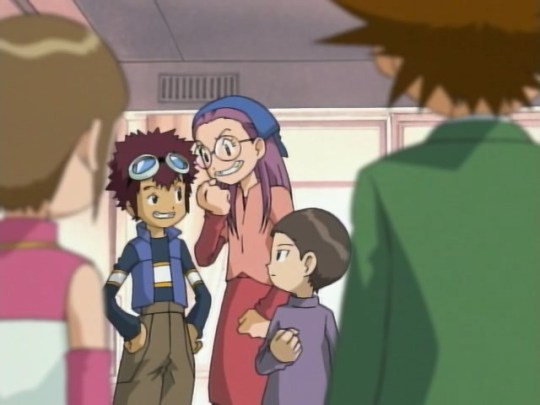
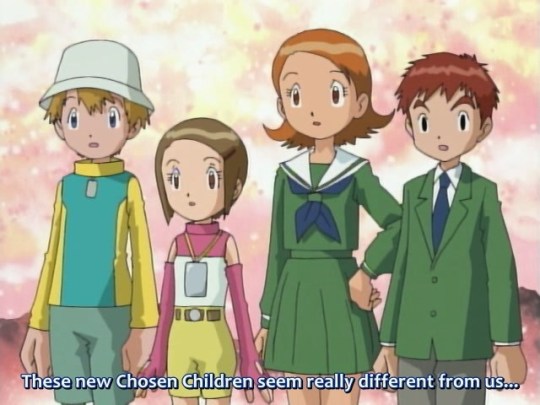
Having watched 02 in Japanese a few times and being very used to the core cast’s latter-half characterizations, rewatching the early episodes always strikes me really hard in the face with genuine shock at how shallow the kids -- especially Daisuke and Miyako -- start the series off as. It’s understandable in terms of the context of the series -- unlike the Adventure kids, who were thrown into a “survival, need to get home” situation off the bat and thus already understood the need to be wary, these kids started off having comparatively easy access to home at any time, and didn’t have a constant sense of danger and survival looming over their heads. It naturally took a lot of time for the gravity of the situation they were in to start really hitting them, and so even the relatively straight-laced Iori didn’t exactly take it all that seriously at the beginning.
Yet while it took them a significantly more delayed time to understand what they were dealing with and take it as seriously as they needed to...they started cultivating something else in the meantime.
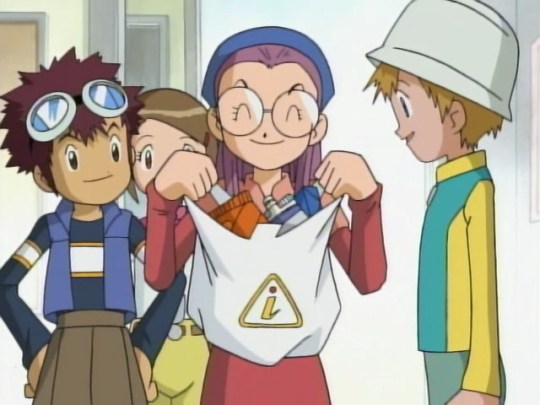
02′s first half is especially full of “random banter conversations” that seemingly involve nothing in particular, but, in fact, that’s actually part of the point. One thing I have always been quick to point out in regards to 02 is that it is rather unique among Digimon series in how it goes out of its way to portray its core cast as having become friends even in pure daily-life social friend terms, even if it had absolutely nothing to do with Digimon incidents -- these are kids who genuinely enjoy each other’s company even in the most mundane of situations. This was something that wasn’t the case for the original Adventure kids -- having been a group of kids thrown together by necessity, even though they most certainly kept in touch and trusted each other as fellow Chosen Children deeply, they started floating back into their own different social clusters after the events of 1999. Relationships are multifaceted, after all; you can still have a deep relationship and bond without necessarily being friends on a social level.
But already, off the bat, Miyako brings food for her new best friends, and it’s implied that she’s the main ringleader behind holding the picnic -- a picnic that started off having no intended relation to the Digital World territory war -- in episode 6. And, to be quite honest, can you really blame these kids? Even the Adventure kids wistfully entertained the idea of a long-term fun adventure through the Digital World in Adventure episode 54, wanting to enjoy its beauty and fun in a situation where they weren’t constantly running for their lives. Now that this luxury is actually available, why not take advantage of it -- and bond further with the others in the process? And for the rest of the year, these kids actively end up spending mundane conversations together and bonding to the point that, by the time we get to the end of 02, these kids have just genuinely bonded so much that they really come off as a cohesive, inseparable unit that would actively choose to spend time with each other if given the opportunity. In fact, even going through all of the TV Digimon series that exist as of this writing, I would say Appmon is the only one that really competes with 02 in portraying its core cast in this manner.
Again, remember: this is a series where characterization is dependent on how the kids treat others and interact with them, so you do actually have to pay close attention to these interactions and see how they change over the course of the series.
So once the episodes start coming in play, we actually learn a lot more about what happens when the characters start breaking away from their shallowness. For instance, episode 8, one of the first key episodes to understanding Daisuke’s character:
Daisuke: He'll be a great opponent. We didn't face off in the last tournament. Takeru: If you had made it to the finals, you would have, right? Daisuke: Don't remind me... Hikari: Can you win? Daisuke: It's not about winning or losing. Right now, all of the boys who play soccer in this country want to be like him. Just thinking about playing against him makes me excited!
For all Daisuke initially seems to be arrogant, he’s actually not that incapable of humility. Far from it, actually; he does have a genuine love for soccer and the spirit of the game, and, when completely and obviously unmatched, fully admits he has no chance and is set on enjoying the most he can out of it anyway. I feel like Daisuke’s surface-abrasive attitude really does throw off the fact that he’s a lot more genuinely humble than he’s given credit for. In the end, he’s satisfied enough with the accomplishment of pulling off one sliding tackle against Ken, and is able to enjoy that -- a foreshadowing of how the latter half relies so much on the fact that he’s capable of enjoying simple pleasures and being straightforward about them.

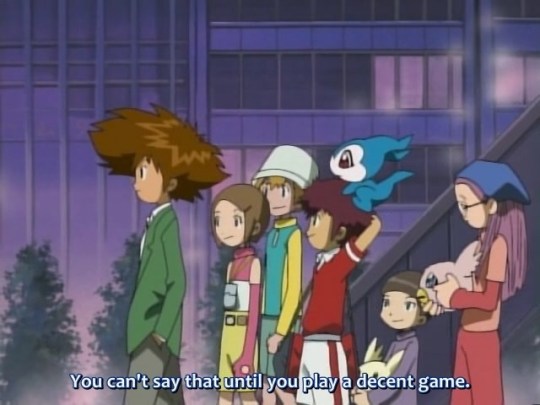
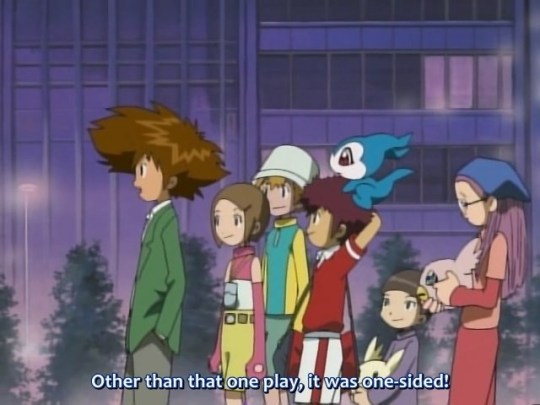
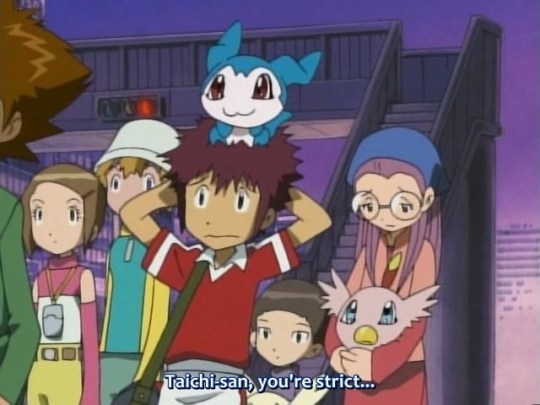
I find that this scene is really underappreciated, too (mainly because it gets lost in all of the other major things in this episode) -- while Daisuke jokes about his accomplishment, it only takes a single comment from his respected senior Taichi to shut him down.
There’s a huge reason I constantly emphasize that Daisuke respects his elders -- this part tends to get lost in translation a lot (especially the American English dub, which just smashed this aspect out of him wholesale, among other things) due to it being a bit reliant on Asian senior deference and cultural propriety, but Daisuke is respectful not only out of societal obligation but also because he genuinely respects his elders! The way he looks up to Taichi and chases after his approval is genuine, and even his interactions with the other Adventure kids have a major hint of him having genuine respect and deference to them. Daisuke is just a deferential person in general -- note that while his crush on Hikari tends to manifest when he’s at his most shallow, he’s actually the one putting Hikari on a pedestal (considering it his own responsibility to impress her), so he’s not actually as assertive as he tries to come off as. The first half of 02 arguably has him deflating more often than he actually stands his ground...and this is a trait of him that starts to actually change quite a bit over the course of the series.
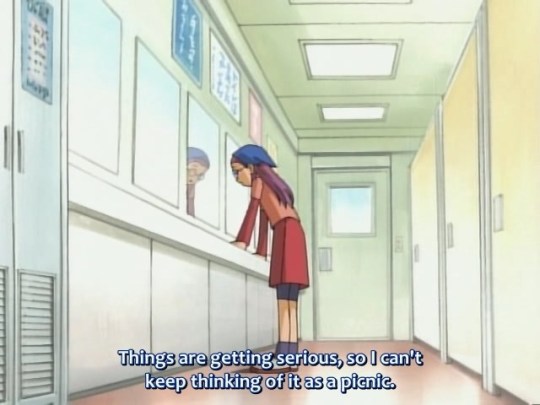
Miyako comes to terms with the fact that maybe she’d been taking this whole Digital World adventure thing too lightly in episode 10, indicating that she actually does have a good sense of priorities when they become increasingly clear! This is actually very important, because it fleshes her out as someone who’s emotionally sensitive -- too emotionally sensitive, to the point that “emotional sensitivity” is just as much of a driving point behind her later breakdown in episode 18, this time from taking her duties too seriously. Miyako is a very id-driven person, and so a lot of the early series is her struggling to find a proper balance on how to adjust her emotions in an increasingly escalating situation. Her heart is in the right place, she’s just not someone with an inherent sense of preparedness to deal with this kind of problem.
We get into the secondary Digimental arc, and there’s a noticeable consistent thread that all of them involve admission of personal faults. This is something that tends to throw people off at times -- wait, having bad traits about yourself is what awards you? -- but the point is that this isn’t like Adventure’s Crests, where things came from proof of exercising the virtue, but rather admitting that there are ways you need to improve, and showing a will to improve in that manner. In the end, people are not perfect human beings, and sometimes even understanding that you’re deficient is half the battle -- after all, the second half is all about a certain character named Ichijouji Ken coming to terms with some very, very serious personal problems.
In episode 11, Daisuke completely admits that he doesn’t feel he understands the concept of friendship the way Taichi and Yamato et al. see it, also latently admitting that he doesn’t see himself as worthy of the Digimental of Friendship. Beyond betraying a lot deeper issues within Daisuke that he seems to have actually had a background lacking in friends and sources of validation, he actually acts very self-effacing when admitting his issues to Taichi and Yamato, ultimately culminating in him calling himself pathetic. Or, in other words, he does want to be a better friend and to understand the concept better, and is harsh on himself for not doing better (which, of course, ultimately leads to how he eventually does gain better relations with the rest of the group and reaches out to Ken).
In episode 14, Miyako admits that she’s shallow and judgmental and tends to jump to conclusions based on first impressions. Recall that she’s comparing herself to Mimi in said relevant scene -- Mimi, whom she admires, and actually spends part of the episode trying to understand and empathize with the mentality of. This is not a statement of Miyako being proud of herself. Rather, this is Miyako being very straightforward about the fact that she needs to try harder to see through the essence of things and to see through to the emotional core of. Again, something she actually does start developing over the course of the series.
In episode 16, Iori gets his first major lesson on the limitations of being too stuck on principles in his attempt to be honest. Recall that Iori’s later character arc is very dependent on him realizing that his own view of the world is too black-and-white. It’s great if you could never tell a lie to anyone, ever, but in the end, that’s going to reach limitations of practicality -- after all, as Jou points out, what Iori did ended up not actually hurting Jou in comparison to the incredible amount of hurt it would have caused everyone by being too stubborn, and thus Iori would have failed to keep his responsibility to help the others because of one narrow-minded principle.
Hikari even gets in a bit during the infamous episode 13, where we learn that her “passive” attitude is biting her in the rear. In Adventure, Hikari’s passiveness and reticence had mostly been used as satellite development for Taichi (his insecurities as an older brother and his obligations to her), so this is actually the first time we get to see a proper perspective from Hikari’s side, and it turns out that his overprotectiveness has actually caused her to get dependent. But even though Taichi is the one the episode actually focuses on, the larger focus is more specifically on the fact that Hikari is too passive -- that she sees being taken by the Dark Ocean as an inevitable thing that’s just going to happen unless someone else steps in on her behalf. Takeru, of course, is having none of it.
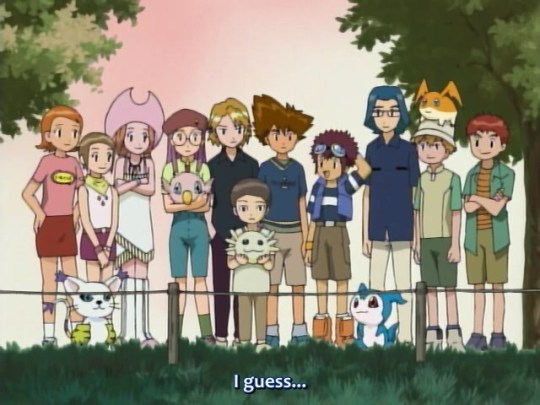
Once that’s out of the way, we go back to taking a look at the subtleties of everyone’s interactions. While everyone generally tends to focus on the second half of episode 17, it’s also pretty interesting to see how the 02 kids react to hearing about their seniors’ adventure in the first half -- remember that this is the first time the 02 kids are actually given any real depth about the degree of 1999′s events that’s not just random points of hearsay, and the way the new kids react to it indicates that they’re thoroughly floored. It’s later established that they didn’t even get the full story (it may not even be possible, given that the Adventure kids’ experiences may well have gone even further beyond what we got to see in 54 episodes), and yet the new kids are overwhelmed. 02 itself does not shy away from the fact that the younger kids really have no qualms about deferring to their seniors if need be, and treating them with utmost respect.
Another minor note, which I pointed out in my Daisuke meta earlier, is that the beginning of this episode is pretty much the last time Daisuke ever shows outright hostility towards Takeru for his relationship with Hikari -- it’s something you have to glean by squinting, but the implication is that the insecure and clingy Daisuke actually got to learn this episode that the two of them had a pre-established shared experience that he himself may not understand, and that it wasn’t just Takeru randomly swooping in and snatching away the closest thing he had to a friend for no good reason.
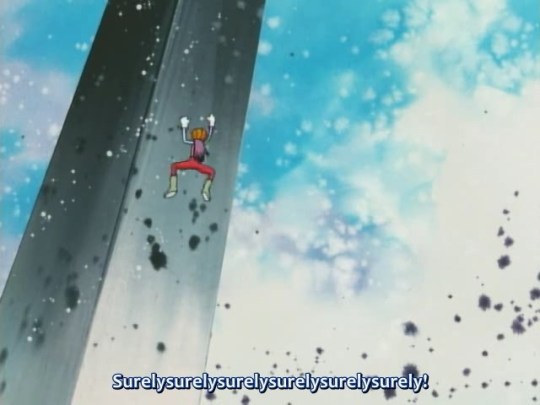
Once the Kaiser infiltration arc begins, episode 18 ends up being one of Miyako’s funniest episodes, but it’s a bit distressing that a lot of people in the fanbase often never let Miyako live this incident down, when in actuality this was explicitly not a good mental health day for her. (This is basically the equivalent of pinning Mimi as a conceited, self-centered jerk based on the fact she was one for a fashion in Adventure episode 25.) The beginning and ending of this episode establish that this is basically a result of Miyako...trying her hardest. She’s scared as hell, but she also learned in episode 10 that this is something she needs to take seriously, and the stress puts her into a mental breakdown. This is why she ends up having a heart-to-heart with Hawkmon at the end; her heart is in the right place, but she needs to find a way to channel her emotional sensitivity in a way that doesn’t make her into a complete mess.
And note that her own voice actress, Natsuki Rio, even pointed out that Hawkmon’s actions had enough of an influence on Miyako’s character that she had to play her differently thereafter.
At first I always played her with Maximum Excitement, and I kept thinking “someone, please, stop her,” but the more straight-laced Hawkmon did his best to pull her in and hold her by the reins (laughs). Thanks to him, Miyako became a lot more of a put-together person…thank goodness Hawkmon is her partner!
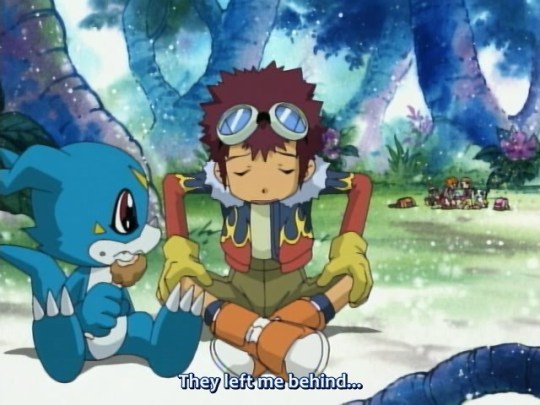
Episode 19 has two interesting things of note that I want to point out -- first of all, starting from the very beginning of the episode, everyone ditches Daisuke because they’re independently going in to infiltrate the Kaiser’s base. Note the complete lack of a plan here whatsoever -- everyone’s just going in on their own -- and the fact that everyone expects Daisuke to come up with what he wants to do on his own. For all it’s worth, even though Daisuke may have a designated protagonist aura to him, within the story itself...nobody actually sees him as a leader at this point in the series (and, to be fair, he’s never really tried to claim the position, either).
It’s similar to how Taichi was never recognized as a particular leader of the Adventure group until Adventure episode 28, but in regards to the full team dynamic, it’s actually inverse -- the Adventure kids were capable of making tactical plans together as early as episode 20, but fell apart emotionally in short order as soon as Taichi was gone, whereas here, the kids are fond enough of each other to hang out socially and support each other emotionally, but they take a while to get any real cohesiveness as a fighting group.
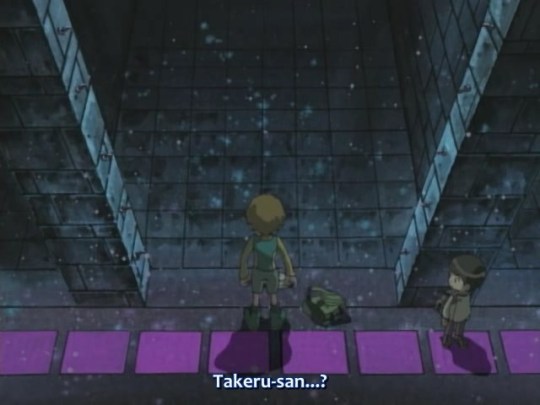
The other is that Iori personally witnesses Takeru’s sudden whiplash into his grudge against the darkness and the Kaiser, and it scares the hell out of him.
Takeru eventually laying a punch on the Kaiser is a pretty awesome moment (and, really, Ken kind of deserved it, so it’s hard to not cheer for him), but it’s also important to note that within the context of the series, this is not a good mental place for Takeru to be in. Iori, the person who should by all means sympathize with hatred of evil things at this point of the series, is still extremely unnerved by Takeru’s actions here, because he’d always seen Takeru as a mature person who’d always kept his composure, only to show a drastically different side of him that he hadn’t even shown a hint of before. That kind of “two-facedness” and emotional repression -- and this way of venting trauma in general -- cannot be good for Takeru at this point in time, and it’s also an important moment for Iori when he later admits during the two’s Jogress arc that he’s having a bit of a hard time understanding him.
And so episode 20 comes, and Chimeramon pretty much takes out the entire party, leading to this conversation.
Takeru: Let's escape. Daisuke: Escape? Takeru: We can't fight anymore. Our mission has failed. We'll retreat and wait for another chance. Hikari: You're right. We have no other choice. Iori: Understood. Daisuke: No. Miyako: Daisuke? Daisuke: We can't just say "another chance" like that. If we leave now, they'll keep attacking anything in sight. We don't know if we'll be able to get into the fortress again. So this is our only chance! Hikari: That's crazy... Iori: Exactly! Miyako: They're all back to their Baby forms... Chibimon: Daisuke... Daisuke: But...didn't you all see it? Destroying those towns...and all we could do was watch quietly. I don't want to see that ever again. I won't let them do whatever they want! So I'm going, even alone. I won't give up now. After getting this far, all I can do is go forward!
Why is this moment important? This is the first time Daisuke has actually stood a firm ground against anyone else in the party -- and not only that, with the entire party standing against him.
Recall that I mentioned earlier that, in spite of Daisuke’s abrasive attitude suggesting otherwise, he actually has a tendency to “deflate” pretty quickly when people tease or criticize him. He spends the first half of the series having a lot more bark than he actually has bite. Earlier in the series, if the entire party were to go against him, he’d be more likely to begrudgingly go along (while complaining) -- in fact, he actually did just that at the beginning of episode 7! But now that push has come to shove, Daisuke’s own sense of morals and bleeding heart have won out. (While his decision here is definitely a bit reckless, he does have a point; if they’d retreated, they might genuinely lose any future chances.) Even with the entire party telling him to pull back, he refuses to accept what they want him to do, and pushes forward.
This is where Daisuke first starts to really make strides towards what becomes his eventual major role in the group as “the one who pulls people forward”. It’s a moment after which the rest of the group themselves also start to treat him with more respect now that he’s proven he’s not just a doormat, and that when it comes to there being a real problem with real priorities, he does have the resolve and initiative to keep going.
Also, a very important point is that he immediately says he’ll go alone if he has to. He doesn’t begrudge the others for wanting to fall back, and has no condescension towards them; he just can’t stand the fact that he himself is being asked to sit it out.
So, you know. Episode 21 happens. Ichijouji Ken goes through some real trauma as Wormmon dies in his arms. And all Daisuke has to say is...
Daisuke: You should go home. There are people who are worried and waiting for you! Go home!
Remember when I pointed out that 02 takes a very unique perspective on Ken’s redemption arc, pointing out the futility of being too trapped in the idea of symbolic penance and focusing more on actively taking steps in the future to make up for and fix things? Here’s our first major sign of this, and Daisuke’s eventual approach to Ken -- Daisuke does not choose to scorn or lambast Ken for what he’s done, even though there are a lot of things Ken deserves to be harped on for, but rather instructs him to take the first active step towards fixing his mistakes, in this case fixing things with his family.
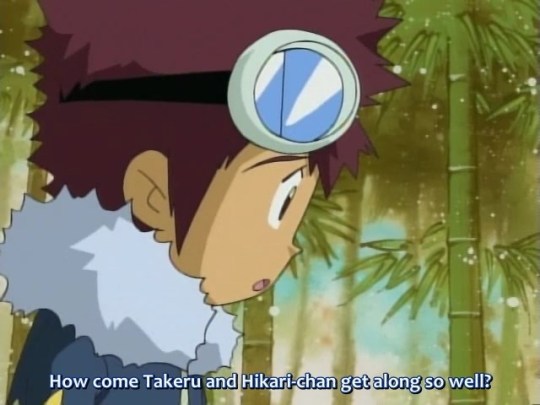
Episode 22 is Daisuke’s own “fanbase will never let him live this down” moment, but there’s still some interesting things to note here. Firstly, Daisuke’s “relapse” happening exactly when it seems like his duty to the Digital World is done and there’s nothing to do besides community service doesn’t seem coincidental, especially when this exact episode actually dedicates a full scene to Takeru, Hikari, and their partners going “...now what?” Secondly, as I touched on earlier, note that Daisuke’s never really seemed to have any resentment against Hikari for not responding to his affections -- in fact, he still considers it his own (and V-mon’s, by extension) duty to be the one to impress her. It’s a surprisingly refreshing take on the “shounen hero with a crush on a girl” trope, because in the end...Daisuke isn’t actually all that possessive of her, he just really wants validation from her, and respects her a lot.
More importantly, though -- note the way Daisuke handles this topic. He’s not actually mad at or resentful of Takeru anymore. In fact, he’s mulling on the topic and wondering what he could do to be on that level. Yup, even when Daisuke’s being shallow and jealous, he’s still learned to handle this issue ever so slightly more maturely than he would have at the beginning of the series.
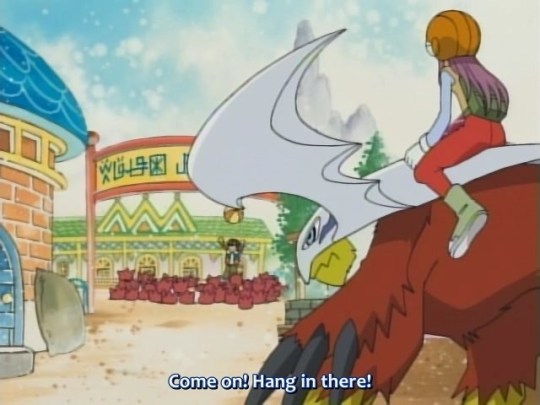
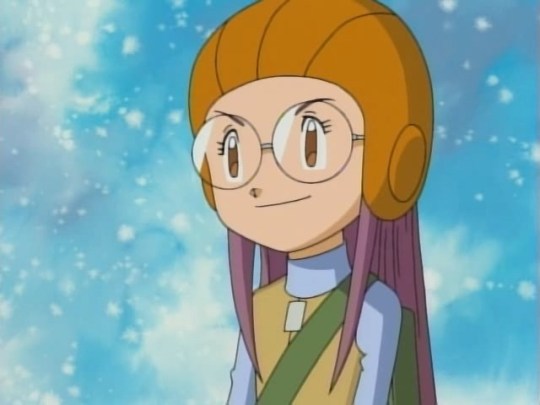
This is also important because only one episode later, once Daisuke becomes disappointed again at Takeru and Hikari walking off on their own, Miyako intervenes -- not only so that Takeru and Hikari can have their space, but also so that Daisuke can have some genuine fun and something to do. This is a very blink-and-you’ll-miss-it moment in episode 24, but it makes it very clear that Miyako was looking out for Daisuke’s welfare, too, and I think it’s very important in light of the events of the prior episode. Miyako, who had always been fumbling on what to do with her emotions, is starting to properly channel them into managing the dynamic between the team and checking in on how everyone’s doing, and that starts to guide her actions and relationships for the rest of the series.
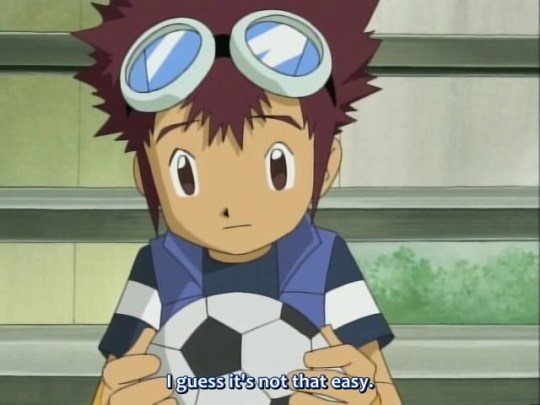
The next episode (25) is where we kick off not only the Jogress arc, but also the arc where we start going into everyone’s attitude towards Ichijouji Ken. This is important not only because Ken happens to be the effective central figure of 02′s story, but also because -- well, remember, 02 is fundamentally founded on the concept of relationships, so it’s only natural that the other kids’ relationship with the “team newcomer” will be a key aspect of the second half, and in relation to their own characters.
Remember how I said that Daisuke’s first-half character involved him being extremely deferential and often deflating whenever he was criticized or someone stood against him? At the time of episode 25, once again, pretty much the entire team is standing against him -- he’s the only one who’s this level of open-minded about getting Ken into the group, and everyone else is showing differing levels of opposition. But while Daisuke doesn’t begrudge the others for thinking this way, he also doesn’t back down, either, and reaches out to Ken on his own because he still really believes in what he’s doing. Now that he’s settled into what it means to be a Chosen Child, he’s started to gain a proper idea of what he wants to do, and what he feels needs to be done.
So, let’s recap everyone’s stances on Ichijouji Ken at the time of this episode!
Daisuke: Forward-thinking and optimistic; willing to believe that Ken should be given the chance to make up for his mistakes and that they should put everything behind him, even to the extent of believing that there’s probably a good reason for the more suspicious aspects about him (prior to the events of episode 25, it was unclear whether Ken was being a bit too callous about killing Digimon). Also the most actively aggressive in reaching out to Ken and trying to get him to join them.
Miyako: Forward-thinking; she openly states at the beginning of the episode that she thinks Ken’s learned his lesson, she’s just worried about whether he’s going to keep doing questionable things in the future (killing Digimon). Once it’s on the table that he’s not just doing this callously, she immediately is on board with him (to the point of even being the first in the group to use given name basis with him), but her stance on what to do with him is more on the edge of “give him space and wait for him to come on his own terms” (she ends the episode saying she’ll be waiting for him to come).
Takeru: States in the episode that he does believe that Ken’s changed, but doesn’t really know what he’s thinking (i.e. too inscrutable to really be sure about). The later episode 35 implies that Takeru was inclined to be a bit more sympathetic than you’d think otherwise, because he understands the trauma of losing a Digimon partner.
Hikari: Wants to wait a little longer and see how things play out. (Remember that Hikari has a known, consistent thread of taking a very passive approach towards things.)
Iori: Absolutely against it on sheer principle.
It should be noted that none of these stances are wrong. Iori sometimes gets a lot of flak for being the one with the most infamously cold stance towards Ken, but when you really think about it, Daisuke and Miyako are very lucky that their hunch about Ken was right and that he actually did happen to be a very kind boy who had a little too much trauma and some supernatural influence. The fact that Ken is a very emotionally withdrawn person for the rest of the series meant that the two of them ended up breaking through to him the most, but there’s nothing wrong with Takeru, Hikari, and Iori’s skepticism; Ken did some pretty shockingly horrible things in front of their eyes for the first half, and it’s entirely within their rights to determine how forgiving they want to be with him.
In any case, we get to episode 26 (the first Jogress), and most of that episode goes without saying, but I do want to emphasize Daisuke’s lines right before it happens.
Daisuke: If you die now, you won't be able to accomplish anything...I don't want that! Ken: I don't want that...There are still many things I must do.
Daisuke urges Ken not to go for the “suicidal penance” route not only because it sucks, but also because, as symbolic as it may be, it’s also counterproductive to the whole point of doing penance to begin with. If Ken really wants to make up for his mistakes, he’s only going to be able to do that if he’s actually alive to do it! There’s only so much you can do by drowning in self-pity by going “because I did this, because I did that” instead of actually taking responsibility for your actions.
02 itself is deliberately ambiguous on how much Ken’s transformation into the Kaiser was Ken’s own conscious will and how much of it was Dark Seed-induced supernatural influence, but one thing it’s consistent about is that it doesn’t really matter. Regardless of what the cause was, Ken did what he did, and it’s his responsibility to make up for it, and the only way to actually do that is to keep moving forward. The fact that Daisuke is so able to viscerally and directly address what Ken needs the most right now is what fuels their first Jogress, and why Daisuke becomes Ken’s closest friend through the rest of the series.
People have pointed out that 02 has a lot of moments of physical hits, but, notably, other than Takeru punching the Kaiser in episode 19 (which he really deserved, honestly), all of these hits are done with the express intent of bringing the other person out of a very, very deep mental abyss (Yamato punching Taichi in episode 10, Daisuke slapping Ken in 26, Miyako slapping Ken in 30, and Miyako and Hikari’s mutual slaps in 31), because they were in a state where words would no longer reach them otherwise. These are all circumstances of the kind where the person on the receiving end understands that they really needed a drastic wake-up call because of how deeply they’d fallen (and these aren’t some average mental abyss problems these kids are getting put through, either). It’s actually hard to imagine any of the 02 group getting in the kind of genuinely angry and vicious fistfights Taichi and Yamato would in Adventure, because of how close they are (the closest being Daisuke and Takeru grappling in episode 11, but it never got near that level) -- in fact, these kinds of things are done with the implication that they’re doing it because they trust the other person to not hold it against them (and in fact, the fact Yamato does this with Taichi in this way is intended to be read as a sign of how much better they’ve come to understand each other).
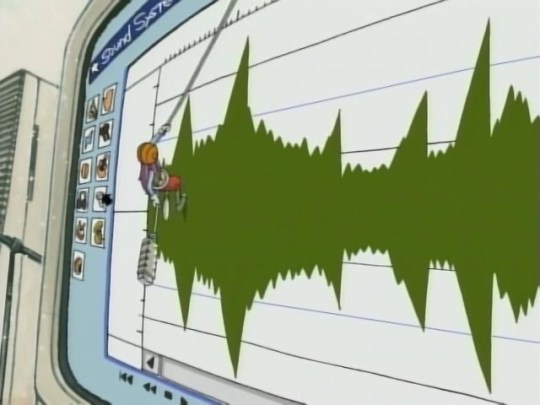
So, moving on with the series! The Giga House incident in episodes 28-29 is the first time the group works together in an organized effort, which is notable not only because it’s their first time coordinating with Ken, but also because it’s their first time properly coordinating at all. Remember when I mentioned that, back in episode 19, as much as the kids were pretty fond of each other and were great friends, they still hadn’t figured out how to actually fight as a team? Here we are, with them actually having started to figure that process out.
We then get to episode 30, where there’s actually quite a lot of interesting things to unpack.
Miyako: What's wrong with you? Daisuke: E-Eh? Mi-Miyako-san? Miyako: It feels weird when you add the "-san". Daisuke: Shut up! Man, you're all the same!
Miyako and Daisuke’s relationship is often misconstrued considering that they’re the two most chaotic in the group (their temperaments are very similar at times, which causes them a lot of friction), but I also think this blink-and-you’ll-miss it moment is pretty much their actual relationship in a nutshell. They fight a lot, and they’re ostensibly vitriolic, but they’re actually two of the most like-minded in the group -- they banter because they’re comfortable with each other. Recall that I mentioned that Daisuke is normally respectful with his elders, yet he’s the only person in the group who won’t use the -san honorific on Miyako (even though she’s the oldest)...but the one time he gets flustered and uses it on her, she tells him that it’s weird and he needs to cut that out. Or, in other words, “it’s not like you to be weirdly respectful of me like that, we shouldn’t have that kind of distance between us, stop it.”
(It’s also pretty notable that Miyako has never seriously used -kun or any other honorific on Daisuke, even right after meeting him -- the only other person she dropped honorifics on was Iori, whom she’d known prior to the start of the series, but she seems to have deemed Daisuke enough of a fellow disaster child that he merited dropping it.)
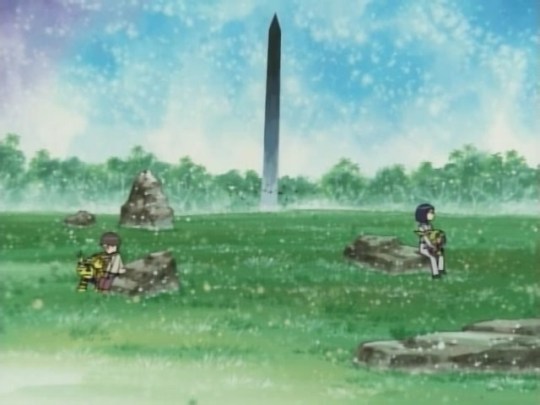
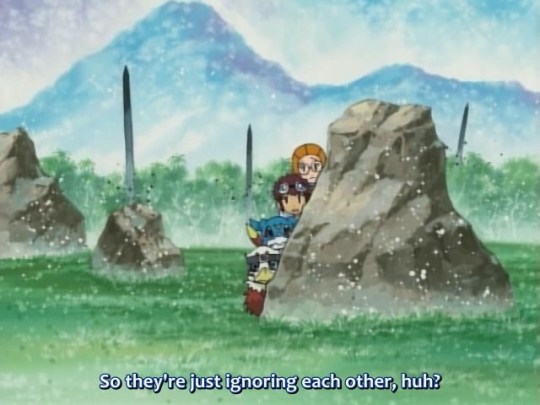
This is especially because, right after that, she recruits Daisuke into her plan to get Ken and Iori to get along -- in the end, when things really get serious, the two are incredibly like-minded (look at how in-sync they are when they scheme together).
30 is actually a surprisingly Miyako-centric episode, despite not ostensibly being one. For one, it says a lot that right now, her biggest priority is to get Ken and Iori to get along -- something that has absolutely nothing to do with herself. In episode 14, Miyako freely admitted that she had a tendency to jump to conclusions about people, and that she was shallow about aesthetics, but this is a very different Miyako from the one who harassed Daisuke for Ken’s autograph in episode 8, or immediately became distrusting of Digitamamon in episode 14. Instead, she’s simply just genuinely invested in seeing people she considers friends get along, and in a selfless manner -- one that has nothing to do with herself. She just really, really cares, a lot.
After all of the first-half hubbub of Miyako really having no idea of what to do with her emotions, the second half has her start channeling that energy into what’s always been one of her biggest strengths: checking on, connecting with, and caring about her friends. Daisuke may be an aggressive forward-thinker who can push everyone in the right direction, but unlike his predecessor Taichi, he doesn’t actually have particular charisma or leadership skills that can necessarily hold everyone together. In the absence of that ability, Miyako fills in for him, checking on the moods and feelings on everyone in the team and making sure everyone’s doing well. And that’s why she loses her temper and slaps Ken late in the episode -- because, really, she’s reached her limit on her “give him space” philosophy when he’s abusing it to be standoffish in a crisis situation, and, on top of that, she really, really did have a huge emotional investment in him.
Moving onto more Miyako in episode 31, her Jogress episode with Hikari, we get to see a little bit of the old emotionally compromised Miyako again, but -- much like the second Digimentals arc -- it involves the two of them acknowledging that both of them are not going about things the best way, and that there are things they can learn from the other.
Hikari: Miyako-san, you're a handful sometimes. Miyako: I knew that's what you thought of me... Hikari: But...I've always envied that. Miyako: Huh? Hikari: Because I can't be honest and say I'm scared or scream like you.
Miyako’s tendency to lose control emotionally results in her being insensitive much of the time, which she calls herself out on multiple times during the episode, and she can’t always be as “kind” as Hikari is -- but, on the flip side, her antics are something that can be a “light” (pun not intended) towards those who are falling in a bad mental state or into the darkness, and Hikari even acknowledges this when one of her trains of thought makes her break out into laughter. Miyako ultimately manages to get through to Hikari this way at the end of the episode, which results in a Jogress and mutual growth for both of them -- Miyako puts more thought into how to approach others (it’s pointed out at the end that she’s still thinking about understanding Ken and Hikari better), and Hikari gains more resolve and determination to fight against things instead of passively accepting her fate (she tells Takeru very directly at the end "I’m fine now. I’ll never go there again.”).
Iori and Takeru's Jogress is a little more complicated to the point where it spans multiple episodes, but a lot of it ends up having to do with the fact that the events of the BlackWarGreymon arc start really putting Iori's black-and-white principles into conflict -- it's wrong to kill something that's been proven to be alive, but it's also wrong to be evil. Putting a huge nail in that is that there's a stake in him forming a relationship with Takeru, but he doesn't really understand Takeru either -- the "two-facedness" he witnessed back in episode 19 scares even him, and he's so intimidated by Takeru that, in episode 35, he goes to approach Yamato about Takeru's past instead of asking the person directly. Takeru, hearing about this, complains that he could have just asked directly, but admits he understands why Iori did so.
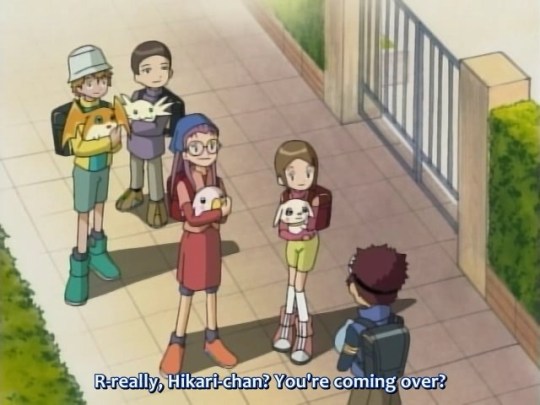
By the way, I should point out that episode 35 is the last time within the TV series that Daisuke is portrayed as having a particular interest in Hikari, and it’s just in terms of being slightly more excited that Hikari is joining his meeting. At this point, there are actual important things happening in the Digital World, and he needs to take care of Ken, too, and so...in the end, once again, Daisuke proves that he’s actually capable of putting aside those kinds of more shallow things when he really needs to.
On top of that, this is when the kids start actively working with Ken in the real world (and, if post-02 materials are any indication, continue to hang out with him even for social outings). The choice to have Ken live in Tamachi instead of Odaiba facilitated his isolation from the group during the Kaiser arc, and during around the third quarter they were all grouping up in the Digital World anyway, but the fourth quarter actually has the kids make an attempt to include Ken in their real-world outings despite the distance. Tamachi is not temporally far from Odaiba (approximately half an hour by train), but it’s a bit of a nuisance to get to, requiring crossing a bridge to/from the Tokyo mainland and paying extra for the Yurikamome. But at this point, he’s an important enough friend to them -- and them important enough friends to him -- that they’ll make it work.
At the end of episode 35, Iori finally decides -- to the point of recklessness, something that would have been previously very uncharacteristic of him -- to try and appeal directly to BlackWarGreymon to get him to stop destroying the Holy Stones so that they won’t have to fight. It’s emblematic of Iori’s heart being genuinely torn, because he’s having such a difficult time rationalizing all of these conflicting feelings. This comes to a head in episode 36, when Iori loses his temper at the rest of the group for “playing around”, but Armadimon snaps him back to reality to remind him that they’re tired and hungry, and this can’t be neglected. Iori himself ultimately becomes the one to proactively suggest that they take time to sit down and eat, indicating that -- little by little -- he’s starting to shift his thinking a bit, after being so incredibly stubborn for much of the series.
This is what leads to Iori and Takeru’s Jogress at the end of the episode, now that Iori is flexible enough in thinking to understand the emotional id behind Takeru’s mentality. And likewise, Takeru’s started to loosen up by 36, too --
Takeru: Sure, darkness is frightening, and we would feel at ease if we could get rid of it completely, but I'm sure that's impossible. Ken: Impossible? Takeru: Where there's light, there's always darkness. Hikari: The brighter the light, the darker the shadow, right? Takeru: Yes. That's why I think it's important not to lose sight of the light inside you, no matter how dark it is.
The thing about Takeru is that while he deceptively seemed more open and playful than Hikari for most of the series, he was actually bottling up a lot of emotions in a way not entirely different from the way she did. (Note how, despite how tied at the hip the two constantly are, they almost never actually talk about their thoughts on each other; it feels like a relationship where they implicitly trust each other but are practically reliant on that implicit trust to maintain that close of a friendship at all.) And he’s been keeping those emotions bottled up until they exploded in less-than-healthy ways, initially distancing himself from Iori. But being a lot more open about his thoughts on the matter allowed them to connect better, and eventually Takeru came to embrace a somewhat more reasonable stance on the matter after observing Iori.
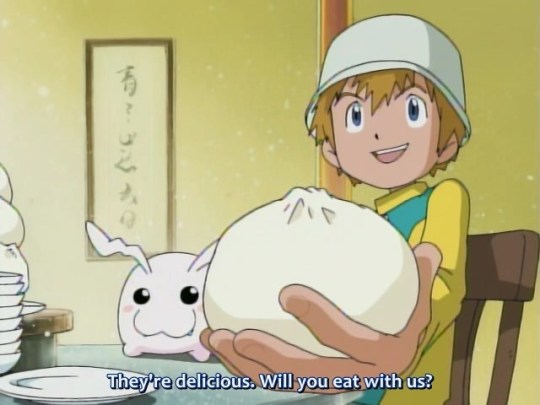
It also doesn’t seem like coincidence that this is the episode that ends with Takeru’s first major act of goodwill towards Ken.
This leads into episode 38, the Christmas episode. Fun things to note!
The episode opens with Daisuke and the other younger kids giving a “Christmas present” to their seniors in the form of letting them reunite with their partners. Remember how I said that the 02 kids always admired their seniors and looked up to them? Even this late in the series, the series does not shy away from the fact you’re supposed to see the 02 kids as their deferential juniors.
The Christmas party is, of course, notably, the first major moment of reconciliation between Iori and Ken, with Iori having gone through major harsh lessons about morality in the last few episodes, and Ken opening up more to the rest of the group. Said party is also yet another notable example of how much of a priority it is for the 02 kids to be “social life friends” and not just friends working as a Digimon incident team -- after all, having genuinely emotionally present friends is what Ken needs most in his life right now, considering that the party is treated as the first time he’s been truly happy in a long while.
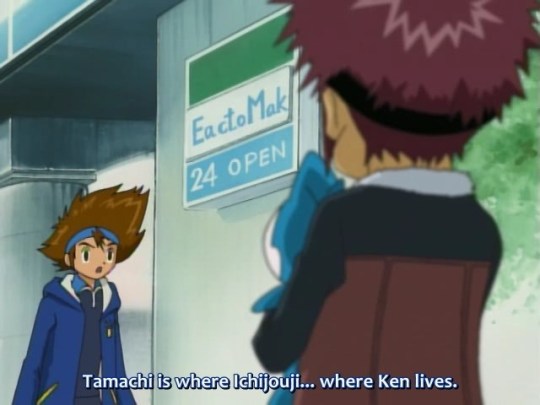
This is followed by episode 39, which is notable as the time when Daisuke finally commits to switching to given-name basis for Ken, and actually opens the episode standing against Taichi -- because he's so worried about Ken that he needs to go join him. This is something that's lost a bit in translation, but although Daisuke stands down against Taichi, he's not rude nor does he overstep his boundaries with his respected senior (he even opens his statement in polite-form Japanese) -- he's just saying, firmly and politely, "I'm sorry, but I can't go, I have to go help my friend." It’s a notable moment because while Daisuke has been becoming increasingly assertive and aware of what he really wants to do, this is the first time we’re actually seeing him refuse to defer to the very senior he’d spent so much of the series idolizing and looking up to.
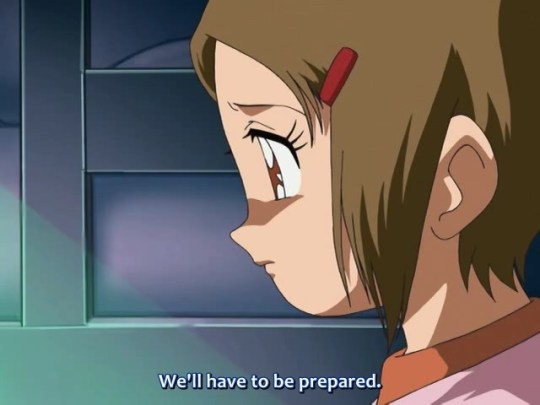
We get to episodes 43-45 (the Demon mini-arc), which is also the culmination of the 02 kids having to face the limits of pacifism. This tends to throw off people who are coming in from Adventure, since the Adventure kids ended up killing Digimon with a lot more ease in the original series, but it’s also important to make note of the fact that the episode itself deliberately portrays a gap in mentality between the Adventure and the 02 kids -- with Hikari torn between the two. It also creates an interesting subversion of expectations when Hikari, the one you’d expect to be more on the pacifist side, is the one who’s already accepted that it may be inevitable, whereas Miyako, the more aggressive and belligerent one, is the one staunchly against it.
The reason for this “paradox” comes out of a single line from Hikari in episode 44:
Hikari: You’re the one who saved him, Miyako-san.
The Adventure kids never liked killing. They were never enthusiastic about it -- it was just that they were almost immediately put in a situation where the entire fate of the multiverse was at stake thanks to some unambiguously evil Digimon who wanted nothing but wanton destruction. Even then, it was pretty clear that they never enjoyed it -- Takeru professed a desire to avoid fighting in Adventure episode 12, and the pacifist Mimi went through a breakdown in Adventure episodes 45-50 trying to avoid casualties. But one of the most important lessons Mimi learned at the time was that pacifism has its limits -- there’s no point if it ends up in more deaths than it saves, because at that point you’re adhering to moralistic principles more than you’re actually saving lives.
The fact that the Adventure kids and the 02 kids have a “different mentality” isn’t just happenstance, but outright embraced. Daisuke, Miyako, and Iori never had to actually deal with a conscious Digimon that was unambiguously evil for most of the series, and Archnemon revealing that her motives were pretty much nothing but wanton destruction in episode 29 was the first major warning signal to Iori that his pacifism might have limits. And during this Demon mini-arc, it’s not like these Digimon are threatening multiverse destruction or anything -- it really does seem like a constant “glimmer of hope” that maybe, just maybe, they can save people non-lethally. Alas, they can’t.
Daisuke, being someone who’s inherently practical-minded, starts entertaining the idea that push may come to shove as early as episode 25, and finally makes his first statement about practical limits in episode 43. But the more emotionally caught-up Miyako and Iori end up taking another episode to swallow it, and they don’t take it well. Most of the attention in 44 is given to Miyako, and it reconfirms that, despite her aggressive exterior, she’s emotionally sensitive and empathetic -- and while killing LadyDevimon is framed as truly the only thing that could have been done in that situation, Miyako is not faulted for being emotionally compromised, nor is Iori likewise when he faces a similar situation with Takeru and is forced to confront the people whose lives were at stake.
Episode 45, when Ken opens the gate to the Dark Ocean, doesn’t really have much to add on top of what’s already there, but this is basically “the point of no return” when everyone confirms their own emotional investment in Ken and understanding that he’s not just reformed, he’s genuinely struggling under the pain of what’s been happening -- and this is before they find out about the truth behind the Dark Seeds, and that Ken’s transformation into the Kaiser may have been supernaturally influenced, too.
It’s also interesting to see the different ways each kid reacts to Ken as they support him:
Hikari, the most outwardly compassionate, goes to support him the second she notices him in physical pain; Takeru notices that it might work, realizes Ken needs the support, and joins.
Iori and Miyako reflect on how Ken’s putting all of his efforts in, and lambast themselves before joining. Interestingly, given the circumstances behind what’s happened up until now, Iori and Miyako criticizing themselves take a different meaning -- Iori, who’d been scornful of Ken until recently, seems to be regretting that he distrusted him when Ken had been trying so hard, while Miyako, who had been open to him since episode 25, seems to be upset that she’s sitting there and not doing enough when he’s in all of this pain.
And Daisuke, of course, the most “forward-thinking” of them all, gives Ken a speech about what he’s done so far and reminds him that he’s already done more than enough for “atonement” -- which is, of course, what directly reaches Ken the most.
And when we get to episode 46, and the kids, now knowing about the Dark Seeds, hold a roundtable (and emotional support group) to discuss what to do about the Dark Seeds, Daisuke’s the one with the most spirit and energy about it, but...
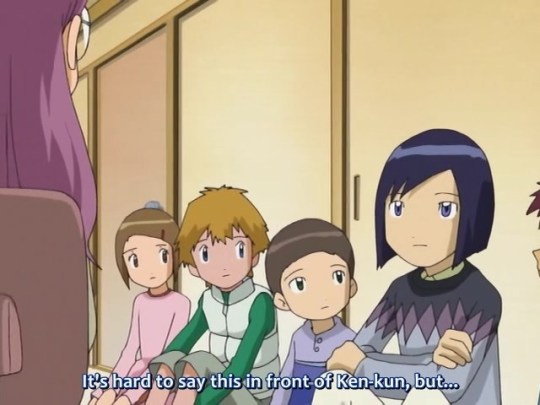
...the one actually leading the roundtable? Miyako.
Miyako: Sorry, that's all I can think of. Ken: Please don't worry about me. Miyako: (nods)
It’s subtle, but the scene in question does actually make a deliberate move in indicating that Miyako’s continuing to channel her emotional sensitivity and desire to go out of her way to help Ken -- of course, they all know how traumatic this is for him, but she’s the one who’s actively calling attention to how he must feel about it first and foremost.
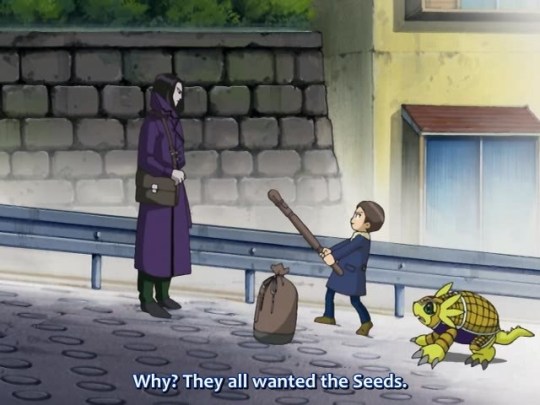
Episodes 47 and after end up becoming yet another major wake-up call for Iori (seriously, I do not understand why people claim he had no character arc when this wasn’t even remotely subtle) when he learns that Oikawa, whom he’d pinned as “evil”, has a deep relationship with the father he’d grown up idolizing so much, and it completely flips his world around -- even though he had started to get a bit more open-minded, he’s still trying to rationalize what should have been, in his mind, two diametrically opposite things. It fuels his confusion and desperate desire to understand more, not just about Oikawa, but about everything he’d thought about morality and why people turn to evil.
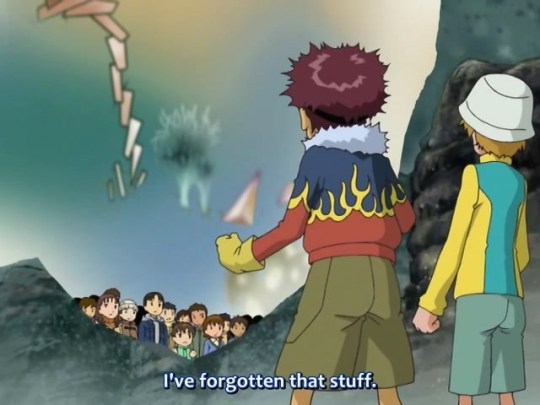
So we get to the final arc of the series, and it involves a confrontation with BelialVamdemon -- but said finale is heavily dependent on talking to the Dark Seed children and inspiring hope back into them. This results in a conversation where everyone talks about their career dreams, and Daisuke admits that he wants to be...a ramen chef, which completely blindsides even his friends.
What’s with this arc?, you might think. And moreover, why is Daisuke ending the series still kind of an idiot? Even Miyako still seems to be a bit of a mess and chaotic. Weren’t they supposed to be growing into dignified heroes, like Taichi and his friends were last series?
Well, here’s the thing -- the fact that the 02 kids end the series comparatively “undignified” is actually very inherent to the core theme of 02 itself. There were more than enough episodes that established that said kids are heroic in their own way -- caring about others, fighting on others’ behalf, and learning important lessons about what’s important to fight about. That doesn’t mean they don’t get the right to continue being disaster children while they’re at it.
Why?
Let’s look at a few official statements behind the creation and intent behind 02 as a series. From producer Seki Hiromi, from the Digimon Animation Chronicle:
That came from an idea I had while reading a newspaper article. I read a story about a nine-year-old boy going to Columbia University, and I thought, “This boy is going to college because he’s considered a genius, and everyone around him will be in their twenties, and he won’t get to have any friends his age. What kind of life would this boy end up having?”
Or some very interesting statements from head writer Yoshimura Genki from the 02 Blu-ray box:
When I was writing Ken Ichijouji, the main idea for him I used as a basis was the conflict between “the self that has to be a well-behaved child when adults are watching” and “being able to be oneself”, and the pain that came from it as a result. So for instance, in the same way as the Pinnocchio fairytale, or the short story A.I. that was adapted into a movie, or many other works, there are probably universal worries that all children feel as they grow, but also, there were ongoing unimaginable, atrocious incidents happening with children at the time, and perhaps it was those social conditions that gave me a hint on what to do. I think I had some thoughts that I wanted to convey to the children who were living through that time. I was given the opportunity to put those kinds of feelings, as much as I liked, into episode 23, and I am truly grateful to all of the staff, including the director. ... Also, this is about Daisuke’s character, but I believe I paid particular attention to making him “a child who could be himself”. He has no special talents, and although he’s clumsy and scatterbrained, I wanted him to be someone whose strength was in his straightforwardness, and wrote him that way.
Lying underneath the entirety of 02 itself is a theme about “children who are not allowed to be children”. Or, in other words, the pressure placed on children to be “talented” and “dignified” and “well-behaved”, often imposed on them by well-meaning parents who are unfortunately taking the opportunity to stroke their own ego, robbing them of the happiness and mental freedoms they should have as kids.
Ichijouji Osamu and Ken, who were placed under the pressure to be “genius children” and cracked under the pressure to please their parents. Oikawa Yukio, who was cut off from the Digital World in childhood by a well-meaning Hida Chikara, worried about his son getting into “foolish” talk. The Dark Seed children, who also fell victim to similar pressures that Ken did, and lost hope for life unless they could force themselves into that mold.
Takeru: If you want the Digimon to exist, if you believe in that, they will. Just like our feelings...Just like every child having the power to make their dreams come true. Keiko: That's just childish. Daisuke: You all have dreams for the future, don't you? Noriko: Dreams for the future? Takashi: I've forgotten that stuff. Daisuke: No way! You must have one! Takeru: It's nothing to be ashamed of. Takashi: Then, what's your dream? Daisuke: Mine? Mine's a ramen shop. I love ramen! I'll become the world's best ramen maker! Ken: I had no idea... Noriko: Well...actually, I wanted to be a kindergarten teacher. Hikari: Me too. Daisuke: What about you guys? Takashi: A baseball player! Keiko: I really want to be a pastry chef. Hiroshi: When I said I wanted to be a manga artist, everyone laughed, so I gave up... Takashi: We all had aspirations, and at some point we thought that wasn't allowed...But we were wrong, right? Daisuke: Let people say whatever they want! Noriko: You're right, we should be free to dream. Miyako: Not just dreaming. If you work hard, your dreams will surely come true!
Notice something about all of these careers mentioned? They’re all the kind of “overly childish” “wild dream” “undignified” “too simple” kinds of dreams that an average parent might be uncomfortably quick to shoot down because that’s “not good enough”. These are the kids who willingly accepted the Dark Seeds; they, much like Ken, probably grew up under parents who prioritized school performance and other “societally dignified” things that ended up eating away at their happiness.
02 has a lot of different themes, but the one that lies in its undercurrent from start to finish is “so why does a child have to be this way? As long as they still understand what’s important, do they have to be dignified people? Why can’t they just be free to have dreams and be themselves?” And Daisuke and his friends are there specifically to stand up against this mentality, and to remind Ken and the other victims of it that it doesn’t have to be this way -- that it’s okay to be your true self, and be a child, and not succumb to all of those arbitrary, shallow standards people put on you. Even if that means you’re still a bit of a chaotic disaster at the tender age of eleven.
Digimon, in the Adventure and 02 universe, have always been treated like a part of the self (they were literally conceived as a physical manifestation of the soul), but in 02 they gain an extra meaning of representing “the inner, deepest part of yourself that represents your wildest ‘childish’ dreams”. The symbolism of Ken spending the first half of the series trying to reject Wormmon for being “weak” -- in other words, rejecting his own kind-hearted self for not being the kind of “strong” entity he was pressured and groomed into being -- is not lost, nor that of the Dark Seed children gaining partners when they reconnect with their dreams and wishes, nor Oikawa finally, finally meeting his partner when he comes into contact with the past he’d really lost (and especially not the fact that his attempt to reclaim shallow reminders of said childhood involved trying to make his own Digimon).
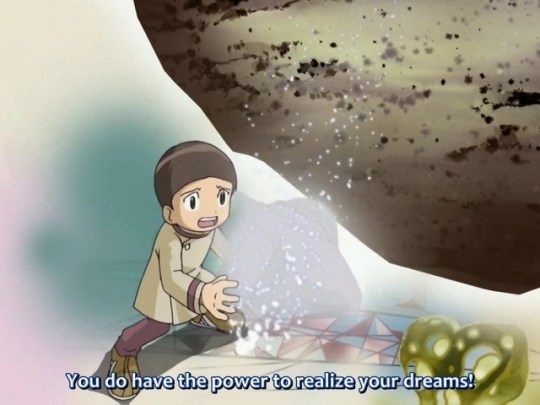
And notably, the series’s finale (prior to the epilogue) ends not on Daisuke but on Iori, escorting Oikawa to the Digital World despite how completely impossible it would have been for early-series Iori to even entertain the idea, finally coming to truly understand what happened with him and being most personally impacted by his death.
But in any case, where are we with the characters? We’re here to talk about how they’ve grown and developed over the course of the series. Let’s recap:
Daisuke: Started off the series as an abrasive kid with more bark than actual bite, constantly deferring to others and easily deflating, relying on shallow sources of validation like wanting attention from Hikari; gradually gained an ability to identify what was important and put his foot down for it, embraced his forward-thinkingness to reach out to a heavily troubled child as a friend, and ended up surrounded by a friend group that loves and respects him.
Miyako: Started off the series as a shallow, flighty girl with poor control over her emotions and difficulty in appreciating the gravity of things; came to channel her emotional range into empathy for others and compassion, bringing other people together and taking care of them.
Iori: Started off the series as a straight-laced but too principled child who stuck to “rules of what’s right” not only in morality but also in way of acting; started to appreciate the emotional nuances and heart behind why people do what they do and how it’s possible to be more flexible in “doing good”.
Ken: Well, his character arc is pretty obvious, but -- again, while his arc of learning to forgive himself is well-known, less often pointed out is that it centers very heavily on not only having penance but also not being too hung up on the past, and the futility of drowning in self-pity and regret instead of choosing to take responsibility and act more productively going forward.
Takeru: Started off the series as a seemingly mature but deceptively inscrutable character whose duality made him hard to approach; eventually opened up with the help of others and showed a capacity for being more flexible with his personal grudges.
Hikari: Started off the series emotionally repressive and passive to the point of self-destruction; eventually embraced connections with her other friends and became more active in taking a stand for herself.
Hey, not bad!
And, again, this is not a series you should be reading in terms of “self-awareness” in the same way Adventure was, but in the sense of their “relationships” and how they interact with others. By being less abrasive and more assertive, Daisuke gained the respect of his other friends. By putting her emotional capacity into caring about others, Miyako became someone who holds the group together. By learning to think a little more flexibly and be less stubborn, Iori arrived at a position where he could more easily sympathize with others in the group. Takeru and Hikari both moved from their previously relatively inscrutable positions to ones who could more effectively interact with and open up to others. And Ken, of course, became someone who managed to integrate himself into a group of true “friends” despite everything he had done against them in the first half.
This, in the end, is how you get what’s one of the tightest friend groups in Digimon history. In the end, the relationships themselves are almost like characters of their own that got development -- I say very often that you could take two of the characters and have an excellent scope of how they’d interact and play off each other by the end of the series. And although they end the series as possibly one of the most shameless, undignified disaster groups out there...they’re certainly still heroic, and in any case, given the lessons they learned throughout their own series, they probably wouldn’t have it any other way.
255 notes
·
View notes
Note
Omg I've never met anyone who's fave Winx is also Tecna! Can you tell us more about what you like about her? Maybe Timmy too since they're the nerdy couple?
I see I'm not alone in this. Yes anon, Tecna is the best Winx and I'll throw hands with anyone who tries to change my mind. I'm so glad you asked this toady because it's indeed Tecna's birthday, and I'm psyched to celebrate it by gushing over her and Timmy.
From the moment I started watching this show I grew to love Tecna. She just walked in, introduced herself and my 8 year old self went 'That one will be my favorite.' I was correct, because as the season went on I grew to like her even more. She was always an awkward tomboy nerd like me. What's not to love?
Tecna's the only one who was willing to call Bloom out when she messed up, she was serious and logical but also very nice and I loved that silly scene where she didn't know how to use non-technological cleaning supplies.

This was peak comedy according to baby Shi! 😂
Season 2 was even better as it centered around character development. Tecna in this season had to learn how to trust others and that logic isn't always the right path. I think it was handled beautifully and we even get her and Timmy becoming and official couple and their first kiss it's just so sweet! This was the only time their relationship faced any sort of drama. And I like that quite a lot, they're the only couple who wasn't put through the ringer for the sake of drama and that just makes them the healthiest outta the group.

Season 3 it's my favorite season and omg did it break my heart and made me grow anxious at times. This season the girls had to make a sacrifice to get their Enchantix transformation and in Tecna's case she almost died getting hers! This girl was willing to die in order to save the entire magic dimension! This episode turned 10 year old me into a puddle of tears because they almost killed off my favorite female character ever and at the time I thought that would be permanent! Good thing she just ended up in Omega for a couple episodes, but still, this was the darkest the show had gone thus far and I was freaking out for my baby
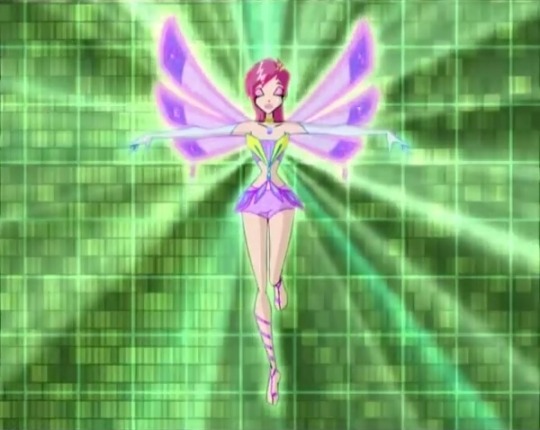
Everyone thought Tecna was dead (except Timmy but we'll get to that later) yet best girl had survived in literal ice hell and kept herself alive until she was found and rescued. She just left me in awe everytime with her intelligence and resourcefulness.
After that when the Winx had to the get the water stars she was willing to give up her emotions for the sake of saving the entire magic dimension. Again, she's willing to whatever it takes to save the universe and that dedication is what makes her so amaizing.
We didn't get much of her during Season 4 or 5 but she still did her best to make plans and to use her tech to help in missions. Season 6 is where baby shone again. I'll be honest with you anon, my favorite Winx transformation is Bloomix and my favorite Bloomix is Tecna's. It's blue! The stockings have circuits on them! Tecna's hairstyle is beautiful The wings are so sparkly and unique, they look like a holgram! If I ever manage to buy a Winx doll, it'll be a Tecna Bloomix doll. I just adore it!

This season we also get an episode on Zenith with Tecna's parents ans them meeting Timmy! This might've been mostly a filler episode but it's still my second favorite of the show as a whole. We had Tecna's home planet, we finally meet her parents (her dad totally looks like Ra's Al Ghul) Timmy proves to be the best boyfriend ever yet again and we get Frankenstein's monster in the Legendarium. Absolutely love this episode and love how Tecna handled everything so well, and Timmy too. He's just such a sweetie!
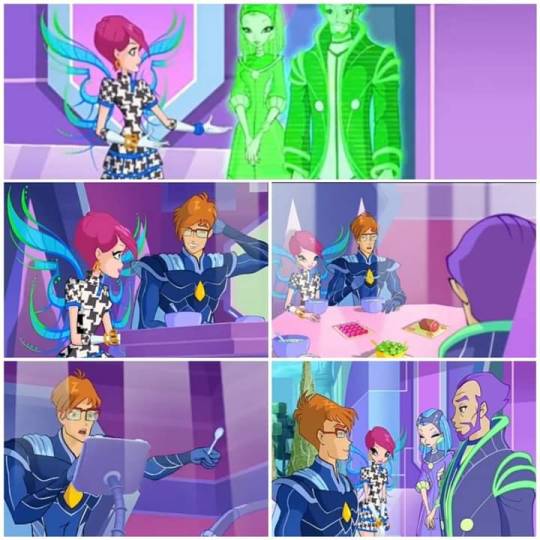
Season 7 is probably my least favorite season but I loved Tecna's fairy animal and I love the moments she and Timmy have there.

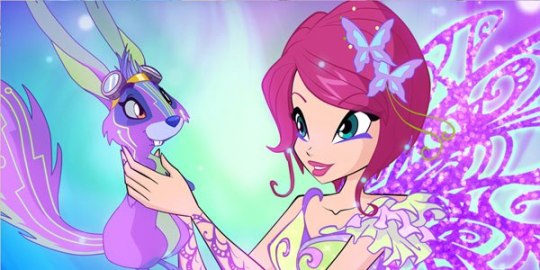
Finally we have season 8 and while the new drawing style isn't my thing. I do love they gave Tecna more to do. She's resourceful, she helps win the dance off, solves puzzles and I do think she was crucial in Orion's story. Kinda makes me wish both she and Timmy had formed a throuple with him. Dunno bout you, but I thought they had potential chemistry.

Overall I love how smart and strong Tecna is. I love how she becomes more open and emotional as time goes on. I love her powers, planet, and companions. I love how determined she is and I love her relationship with Timmy.
Ok so now onto precious Timmy. This boy is just the best. He starts out similar to Tecna as the brains of his group but unlike Tecna who was cold and logical, Timmy is in tune with his emotions, his flaw to overcome is perhaps that he's a bit cowardly and dare I say weak. But our boy here comes around and compensates his lack of strength with his intelligence and resilience and I absolutely love him for it.
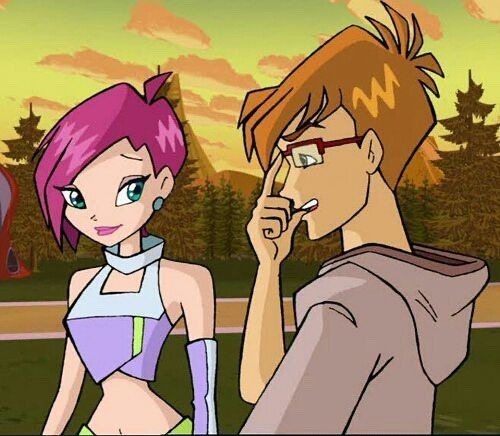
He gets even less screentime than Tecna in subsequent seasons which it's a shame but what gets is always gold. I particularly love that in season 3 when everyone gives up hope that Tecna's alive in the Omega dimension, Timmy doesn't. He absolutely destroys himself searching for her and finds her. I think I'd be lucky to find a man that loves me as much as Timmy loves Tecna. They're just the best couple on the show and I adore how they both bring the best out in eachother. How they're both shy nerds with similar interests and how unbreakable they've become. It's rare to see a pair with a serious girl and a super loving boy but these two make it work so well that I'm convinced we need more of that trope.
I was slightly sad they were cut from the live action when it was first announced but now that we've seen is gonna be a grimdark garbage fire I think I'm happy my two favorites won't be tainted by it. These two made my childhood, and I'll always keep them close to my heart 💙

41 notes
·
View notes
Note
ah, if you're still doin the character thing, how about Lenalee? (I didn't see anybody asking about her, but if sb did, sorry! maybe Johnny then?)
I’m sorry for the delay on replying to this one! This is probably the last ask thingy I’ll be doing for the Character Questions, as they take me some time to type and I’ve been busy 💓 But thank you all very much for the interest in these, I really love writing for stuff like this! I’ll be covering both Lenalee and Johnny in this one - so, a two character reply again! I was hoping someone would give me Lena so the OT4 was complete, but I also really love Johnny... 😭
Lenalee
My otp for them: With Lavi! I had never paid much attention to the two of them as a couple, but after I reread the series last year, they have grown on me. Lavi has been Lenalee’s emotional support many times and it’s clear he cares about her. People would consider that the time he snapped at her for grieving over “losing Allen” was bad, but I quite don’t think he meant harm; rather, I think he kinda acted on impulse because he wanted her to feel better. He marvelously made up for that during the following arcs (”I didn’t come here to stop you; this is your decision to make. Just let me come along.” - 150th Night). Those interactions made me like them a lot as a pairing. My brotp for them: Miranda! She played a big part in Miranda’s life, and I’m sure they got really close thanks to that. Imagining them doing all the girly things together without a care in the world makes me so happy 🥺 It’s like getting to see the happy girl Lenalee could have been, if she weren’t another victim of the war. I also used to ship them because I have no self-control apparently, so. XD Any other ships: Have you all ever considered her and Emilia? 💦 Both share guts and very strong legs, it seems. I can picture them bonding easily over shared interests and it makes me weak. I also love Lenalee and Kanda’s relationship, so they also get the cake here. As for Allen, they make a beautiful pairing, but only when it comes to appearance to me; imo they would need to work many things out, personally speaking, to work in a healthy way for both. Their best friend: Miranda, Jeryy and Kanda! Miranda, for the reasons stated above; Jeryy, because he was her “motherly figure” when she was growing up and needed a feminine, understanding input from someone she could feel comfortable around. And Kanda, due to their relationship as “childhood friends”, in a way. Lenalee loves everyone close to her, but I see these three being the ones she’s the closest to. My favorite nickname for them: “Lena”, given by Kanda. It just sounds so cute and delicate; it suits her. My favorite AU headcanon of them: People often say they would like to see Lenalee abandon the Order and join Allen’s side. I say the opposite; she should stay. She could be a big helping hand on throwing a rebellion of sorts that could benefit him from the inside. That way she wouldn’t need to abandon the people she loves for Allen’s sake, but would still be on his side, on her own way. My favorite outfit they wear: Lenalee has the cutest chinese themed outfits! The ones I love the most are the one she used during the Zombie arc, and this one I saw her wearing on Gray Log. She looks so darn cute, too precious for this world. *gross sobbing* Defining color: When I think of her, I think of several shades of green, namely Fern (#4F7942) and Pine (#01796F). I also think of deep red (#D30000), because of the ribbons she uses on her hair and the shapes of her Crystal Type Innocence. Would I date them: Lenalee is a strong, amazing girl! However, I wouldn’t date her. She can also be headstrong, and so am I hahah At times, I find myself thinking we’re similar in the way we’re insistent (at the risk of being unreasonable) about some things and I quite don’t see that working out at all 😅 First impression: Bland. Nice character, but her design didn’t interest or stand out at all to me. Dark Boots are an awesome Innocence though! Current impression: I really like her. Not one of my favorite characters, and I have a lot of criticism when it comes to Lenalee, but I love her design and the development she got so far. I started taking her more seriously after the fight against Eshi; it was one heck of an awesome fight! The way she put everything on the line on that suicidal move was impressive; so badass. Hogwarts House: As much as I would love to assign her to Gryffindor for her commendable courage, Lenalee’s home is in Hufflepuff! Before anything else, she cares deeply for the people she loves, and will sacrifice herself for them without thinking twice. Loyalty and kindness are her most prominent trait, but that doesn’t make her a pushover in the slightest. Which Pokemon starter they’d be: Torchic! According to the Pokédex entries, Torchic feels warm to the touch and this makes it very huggable. I have this type of impression about her, warm and welcoming. It also develops a fighting type upon evolving, and Blaziken are well known for their strong legs and jumping capacity!
Johnny
My otp for them: With Cache! I’m very weak for couples where the woman looks (and is) stronger than the guy, and we’ve seen her carrying Johnny to the medical wing before - an occurence that, according to her, happens a lot. He seems to have a crush on her, seeing his reaction (fidgety, blushing) when he was saying goodbye to his science friends. According to Vol. 27′s Discussion Room, the scrunchy he’s using to tie his hair used to be hers, and I love how Allen went “hmm, I see...” when he told them she had given it to him hahah (it’s alright, Allen; I ship it too 👌) My brotp for them: Allen, hands down. Differently from what people say, Johnny has always supported and cherished Allen, what he’s doing for him now isn’t out of the blue. It was actually what Johnny told him that started to change his perception on things and realize that his heart longed to be with the ones he loves despite the hardships (”As Johnny Gill and your friend, I’m going to help you!”, - 215th Night). He loves him, and I can tell how important he is for Allen too; he was able to come back from Nea’s inner world thanks to Johnny’s calling that reminded him of his ties with everyone in “Home”. This part has some of my favorite scenes from the entire series; Johnny didn’t even bat an eye, he simply jumped for Allen. I called it Allen would avoid their fall, but Johnny patting his head in happiness and relief and then hugging him, to which Allen returned, as relieved and happy for having come back... It was so sweet and hopeful. It brings good tears to my eyes! Any other ships: I don’t have any~ Their best friend: I think Johnny is friends with pretty much all of his buddies from the Science Division, but I notice him being closer to Reever. I would like to mention Suman as well; despite him being deceased, Johnny still seems to hold a fond memory of him. And then comes Allen who’s clearly someone important to him, and it doesn’t seem to be one-sided, judging by the time they (used to) spend together having fun. My favorite nickname for them: I don’t have one! But Johnny deserves cute nicknames, let’s give him some, Hoshino-sensei? 👀 My favorite AU headcanon of them: I don’t have one because Johnny is already perfect as a character and for the plot as he already is imho. All I wish is for him to survive until the ending. Hang in there, Johnny! Allen needs you, but for all you’ve been doing, you deserve to make it out alive and earn your own happiness! My favorite outfit they wear: Out of all the characters, I feel like Johnny is the one that has the most “stripped-down” style, quite modern looking. But I love his current outfit the most! He looks great in vests and the long coat definitely reminds me of the lab coats he used to wear while in the Order. I also like a lot more how his hairdo is atm, it looked a little painful to have tied for too long in the previous style (similar to pigtails). His new frame glasses are also pretty! Gives him a more serious look. Defining color: Curiously enough, I think of an array of varied colors when I think of Johnny? I can’t seem to be able to pick one. There is black, yellow like Mustard (#FEDC56), brown like Cherrywood (#CB6F36) and blue like Maya (#73C2FB), to name some. Would I date them: But of course! Johnny is the sweetest guy I’ve ever seen. He gives off all the geek vibes, but not on the annoying way; he looks like the type of person that would talk lots about things that make him happy, excitedly, while you’d look at him go, feeling blessed with all the bright energy vibes emanating from him. He’s also shown to be extremely supportive, and honestly, everyone deserves someone like him 🥺 First impression: Regular geek scientist guy? Current impression: *incoherent sobbing* I love him so much! Why does Johnny not have more appreciation?! Why do people think he’s annoying??? Anyone who loves Allen gotta admit this guy is the MVP. He’s the trope you’d expect for a smartsy science guy, and at the same time, he’s not only that. I’ve babbled enough on that in the reply under this question. Hogwarts House: I’m in a tie between Gryffindor and Hufflepuff, but I think I would give him Gryffindor. People would be quick to place him in Ravenclaw for his smarts and his love for learning, but this guy is extremely courageous. Despite being seen as “weak” and fragile, he was the one to stand up for Allen in multiple occasions throughout the series. He’s also the one who confronted the Earl to ask him what he wanted with the 14th (196th Night), while no one had really questioned or directly talked to him. He left the Order to go after Allen, knowing he was awakening as a Noah (which is already dangerous on its own) and would be in constant situations of peril because of Akuma and other Noah. Johnny, the “regular guy”, did all that, having no care as to what could happen to him. So, Gryffindor for his extreme courage, but maybe Hufflepuff for his honest loyalty and goodness. Which Pokemon starter they’d be: Grookey! The way Grookey and its evolutions handle wood makes me think they’re skilled Pokémon that can craft things and know how to use them as instruments, just like Johnny does with his scientific creations. The tied “hair” also reminds me of him!
#dgm#d.gray man#d.gray-man#Lenalee Lee#Johnny Gill#ask#analysis#I didn't proofread this one at all; so I apologize for possible mistakes!
15 notes
·
View notes
Note
First i wanna say i really like all your analysis and theories because you put so much effort into them and im really gratful we have someone like you who like i said again have wonderful theories that make so much sense so please i have a question for you regarding a certain well...very dragged topic so if you wouldnt like to awswer i will totally understand it just i wanted to hear YOUR opinion because i really do appreciate your analysis of snk anyway my question is regarding erehisu...not i dislike it but its just im so tired can isayama make em or eh canon already so this clownery end...BUT i really do believe eremika will be the endgame because of all the proof that we have in the manga but people tend to make it as if its a crack ship ugh...what do you think hisu's final role will be? What do you think eren awswered her? Though i dont believe hisu's question meant any romantic undertones what do you make out of her question to eren?
Hi anon!!
Thank you for your kind words T.T
Well... the question focuses on my opinion on which ship has more chances to become canon, right?
I’ve spent some time thinking about my answer to this question, how I could go direct to the point while giving enough arguments to defend my opinion. Prepare yourself because I couldn’t and this will be very long. Sorry...
1. Eren’s characterization + romance
First of all, there is a very important point about Eren that shipers (even me sometimes) forget. A friend that loves and understand Eren the most pointed this many times when I was starting to forget about it... I dare to say that nobody surpasses her understanding of his characterization.
Eren isn’t a romantic person. We all have to keep in mind that his priorities aren’t the priorities a normal person would have. He is like Rick from Casablanca. There’s the duty and then dreams and then, maybe, romantic love (If we take for granted that he knows what it is). Erwin loved Marie but he had a priority. (There’s me finding more similarities between Erwin and Eren). Eren’s current development is more about his mission than a romantic one. Although he plays with romance, he does it while being blatantly blind about it.
Eren got caught in the middle of his normal development from a child that gets annoyed by romance and has some kind of allergy against cheesy moments (for ex. in ch. 3 with Franz and Hannah) to a teenager that blooms to feel romantic love as something important and unavoidable. It’s normal for kids. But Eren hasn’t a normal life. There was always something more important than learning how to love, be loved and express it openly. It’s not that he isn’t able to love, more likely the opposite. He knows how to love and he has his own ways to do it... but the way the world is restricted his possibilities to live a different life. Even in the way EMA never got to communicate properly most of the times. Communication runs sometimes as a question, a statement and no back question (for ex. ch. 3). Eren asked about Mikasa’s reasons to follow him, about Armin’s reasons, where he threw that line about his death being meaningless. Nobody said anything, neither Mikasa nor Eren reacted stating the opposite. They usually don’t have the time nor oportunity to talk or even think about essential topics as feelings of love or labeling their feelings.
Given Eren’s lack of experience and maturity that we could see until Marley arc. Is it even possible that he developed a carnal relationship with Historia before going to Marley? No. No, because it would contradict somehow his characterization. Eren is depicted exactly as someone that took this decision because he lost every single deep bond that would have stopped him. This lack of understanding brought him to this point. The lack of value he places on life and a comfortable life with friends and family.
2. The baby
The whole baby plot point is from my perspective just about the curse and a new generation (maybe) free from being SoY but just normal human beings.
Historia choosing this way was also the safest way to oppose her destiny... strategically speaking. She could trick everyone without being called openly a traitor. So I’m agree with you. Her question wasn’t romantic.
3. The father and his meaning
The father is, as I pointed out once in my Twitter acc., the farmer. My reasons are that there is a meaning behind his existence. He was a boy that dared Historia to break the rules and stop being submissive. He is aligned with Historia’s current role as someone who stopped being the good girl that follows stupid and detrimental rules in disregard of her own life. He is also a man that decided to redeem himself by helping her with the orphanage without trying to get her attention at all. Being a normal person who enjoys a normal life and also redemption. I’m not saying necessarily that it’s about love, but he isn’t just a nobody. He holds a deep, positive meaning for the story. Isayama pairs usually a sinner and an “innocent”: Annie and Armin, Eren and Mikasa, Erwin and Levi, Ymir and Krista, Historia and the Farmer. Eren and Historia are the current sinners on the matter that both chose the rumbling... let’s say.
Why this kind of pairing? Because one has to contribute to the improvement of the other. Two sinners (with the same crime and perspective) can’t help each other. It’s opposition what will bring them to overcome their weaknesses.
4. Development of the couples
That being said, Eren and Mikasa as pair are in the focus. Isayama went through 10 years of development of most of the pairs to build up a support for EreMika. He build parallels with YumiHisu and Falbi and gave us hints to understand EM better. The vow he made to her was probably one of those moments when he started to be romantic without noticing.
5. Eren and Historia: their moments
EH interactions are, conversely, of other nature. Both feel related about the point of carrying a big burden. While Eren has to save humanity fighting, Historia has the role of a founder who has to assure humanity’s survival by having children and keeping the royal family alive. Both want to be free from that burden and end up being “partners in crime” by betraying everyone. I’m missing the romantic interactions to be very honest. It’s because Eren is so self-focused that he anchors here when someone who is alone and having the same problems and feelings appears. But... where did the fandom start to see something between them?
Two moments. The moment when he said “she is admirable” and the moment when he insisted to spare her life. That obsession that is so tricky to even be explained.
The first one made a difference between how Eren acknowledges Historia’s attributes and disregards Mikasa’s. The fandom uses this to point out that Eren likes Historia more. Well, no. His relationship towards Mikasa was characterized by jealousy. He won’t admit anything.
Regarding his “obsession” to save her... this started when he knew the existence of Eren Krüger, his thoughts and the whole story about Dina. It wasn’t before that. We must also admit that Historia’s safety was related to more characters than just Eren. Since the very beginning, her safety was conveniently displayed by Frieda, Ymir and Reiner, what makes me believe that her destiny was to give birth to this baby (aka. plot armor). Her role is to avoid becoming a titan by her own choice, that’s her arc. With Krüger we also knew the importance of a royal: they can give birth to more convenient instruments for war. Knowing that he was devoted to the mission, I believe that Eren is being influenced by him (I want to highlight the word “influenced” as something different to manipulated). So this is all related to the mission and the final outcome about Ymir, the curse, the power and the baby. Eren partly wants to grant her the chance to choose, but he also pushes her to do so based on part of her desires because of the mission as he did with Grisha.
Add here the fact that Historia was prepared to sacrifice his life at the cave if it was needed. That shows her priorities.
A lot of EH shippers claim that she saved him. Regarding her role as savior, I’m more objective and skeptical. She spared his life, but emotionally speaking, she didn’t really save him. The proof is that he was still low, thinking that he was a nobody. Carla’s words were the message with enough impact to relieve him and make him open himself to Armin and Mikasa and tell them about his sorrows. This shows the difference on the impact on him when it comes to Historia and when it comes to Carla... this happens again in ch. 131. He thinks about his mother instead of Historia who was the one reproving his plan. To me, Historia is his friend and inspired him to fight just for his sake against the system and rebel those who are over him and oppressing him. But his soft side is related to Carla, Armin and Mikasa: his family and those, who appreciate his life over his fate and urge of freedom and to be acknowledged.
Bonus: when Eren told Historia that she saved him was more like “You chose this path once and I’m sorry. I’ll be starting the rumbling and you contributed”. Historia’s face to that looks like this: “Oh no...I fucked up”. It doesn’t look like “Oh no... I don’t regret saving you because I love you and I can’t live without you”. On the contrary, that’s when she realizes that she was part of this since the beginning and that by saving him, she chose to let the rumbling happen once in the past. Then she goes along with the plan for her own reasons and because she hasn’t better options to choose either.
Summary:
Eren didn’t develop as a romantic person yet nor prioritized romantic love over his mission. It goes against a previous explicit development of EH before the trip to Marley. The farmer has a positive meaning as the father. EM is more developed and shows romantic undertones and common tropes. EH hasn’t romantic undertones and it’s more related to the mission to save the eldians.
So... that was it. Sorry again for the length and thank you for the ask!
18 notes
·
View notes